
Project Gutenberg's The Strand Magazine No. 97 (January, 1899), by Various This eBook is for the use of anyone anywhere in the United States and most other parts of the world at no cost and with almost no restrictions whatsoever. You may copy it, give it away or re-use it under the terms of the Project Gutenberg License included with this eBook or online at www.gutenberg.org. If you are not located in the United States, you'll have to check the laws of the country where you are located before using this ebook. Title: The Strand Magazine No. 97 (January, 1899) Author: Various Editor: George Newnes Release Date: April 17, 2015 [EBook #48729] Language: English Character set encoding: ASCII *** START OF THIS PROJECT GUTENBERG EBOOK STRAND MAGAZINE NO. 97 (JAN, 1899) *** Produced by Richard Tonsing, Jonathan Ingram, Maria Grist and the Online Distributed Proofreading Team at http://www.pgdp.net
The cover image was created by the transcriber and is placed in the public domain.

EDITED BY
GEORGE NEWNES
Vol. XVII.
JANUARY TO JUNE
London:
GEORGE NEWNES, LTD., 7, 8, 9, 10, 11, & 12, SOUTHAMPTON STREET,
AND EXETER STREET, STRAND
1899
Round the Fire.
Illustrated Interviews.
His Home Coming
In Nature's Workshop.
Weepin' Willie
Animal Friendship.
Miss Cayley's Adventures.
Unique Log-Marks.
A Wedding Tour in a Balloon
A Peep into "Punch."
The Spider of Guyana
The Training Ship "Exmouth."
False Colours
Animal Actualities.
The Cotton-wool Princess.
A Funeral at Sea.
Curiosities.
Transcriber's Notes.
The Strand Magazine.
Vol. xvii. JANUARY, 1899. No. 97.
By A. Conan Doyle.
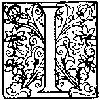
It was a curious thing, said the private tutor; one of those grotesque and whimsical incidents which occur to one as one goes through life. I lost the best situation which I am ever likely to have through it. But I am glad that I went to Thorpe Place, for I gained—well, as I tell you the story you will learn what I gained.
I don't know whether you are familiar with that part of the Midlands which is drained by the Avon. It is the most English part of England. Shakespeare, the flower of the whole race, was born right in the middle of it. It is a land of rolling pastures, rising in higher folds to the westward, until they swell into the Malvern Hills. There are no towns, but numerous villages, each with its grey Norman church. You have left the brick of the southern and eastern counties behind you, and everything is stone—stone for the walls, and lichened slabs of stone for the roofs. It is all grim and solid and massive, as befits the heart of a great nation.
[1] Copyright, 1899, by George Newnes, Limited.
It was in the middle of this country, not very far from Evesham, that Sir John Bollamore lived in the old ancestral home of Thorpe Place, and thither it was that I came to teach his two little sons. Sir John was a widower—his wife had died three years before—and he had been left with these two lads aged eight and ten, and one dear little girl of seven. Miss Witherton, who is now my wife, was governess to this little girl. I was tutor to the two boys. Could there be a more obvious prelude to an engagement? She governs me now, and I tutor two little boys of our own. But, there—I have already revealed what it was which I gained in Thorpe Place!
It was a very, very old house, incredibly old—pre-Norman, some of, it—and the Bollamores claimed to have lived in that situation since long before the Conquest. It struck a chill to my heart when first I came there, those enormously thick grey walls, the rude crumbling stones, the smell as from a sick animal which exhaled from the rotting plaster of the aged building. But the modern wing was bright and the garden was well kept. No house could be dismal which had a pretty girl inside it and such a show of roses in front.
Apart from a very complete staff of servants there were only four of us in the household. These were Miss Witherton, who was at that time four-and-twenty and as pretty—well, as pretty as Mrs. Colmore is now—myself, Frank Colmore, aged thirty, Mrs. Stevens, the housekeeper, a dry, silent woman, and Mr. Richards, a tall, military-looking man, who acted as steward to the Bollamore estates. We four always had our meals together, but Sir John had his usually alone in the library. Sometimes he joined us at dinner, but on the whole we were just as glad when he did not.
For he was a very formidable person. Imagine a man six foot three inches in height, majestically built, with a high-nosed, aristocratic face, brindled hair, shaggy eyebrows, a small, pointed Mephistophelian beard, and[Pg 4] lines upon his brow and round his eyes as deep as if they had been carved with a penknife. He had grey eyes, weary, hopeless-looking eyes, proud and yet pathetic, eyes which claimed your pity and yet dared you to show it. His back was rounded with study, but otherwise he was as fine a looking man of his age—five-and-fifty perhaps—as any woman would wish to look upon.

SIR JOHN BOLLAMORE.
But his presence was not a cheerful one. He was always courteous, always refined, but singularly silent and retiring. I have never lived so long with any man and known so little of him. If he were indoors he spent his time either in his own small study in the Eastern Tower, or in the library in the modern wing. So regular was his routine that one could always say at any hour exactly where he would be. Twice in the day he would visit his study, once after breakfast, and once about ten at night. You might set your watch by the slam of the heavy door. For the rest of the day he would be in his library—save that for an hour or two in the afternoon he would take a walk or a ride, which was solitary like the rest of his existence. He loved his children, and was keenly interested in the progress of their studies, but they were a little awed by the silent, shaggy-browed figure, and they avoided him as much as they could. Indeed, we all did that.
It was some time before I came to know anything about the circumstances of Sir John Bollamore's life, for Mrs. Stevens, the housekeeper, and Mr. Richards, the land-steward, were too loyal to talk easily of their employer's affairs. As to the governess, she knew no more than I did, and our common interest was one of the causes which drew us together. At last, however, an incident occurred which led to a closer acquaintance with Mr. Richards and a fuller knowledge of the life of the man whom I served.
The immediate cause of this was no less than the falling of Master Percy, the youngest of my pupils, into the mill-race, with imminent danger both to his life and to mine, since I had to risk myself in order to save him. Dripping and exhausted—for I was far more spent than the child—I was making for my room when Sir John, who had heard the hubbub, opened the door of his little study and asked me what was the matter. I told him of the accident, but assured him that his child was in no danger, while he listened with a rugged, immobile face, which expressed in its intense eyes and tightened lips all the emotion which he tried to conceal.
"One moment! Step in here! Let me have the details!" said he, turning back through the open door.
And so I found myself within that little sanctum, inside which, as I afterwards learned, no other foot had for three years been set save that of the old servant who cleaned it out. It was a round room, conforming to the shape of the tower in which it was situated, with a low ceiling, a single narrow, ivy-wreathed window, and the simplest of furniture. An old carpet, a single chair, a deal table, and a small shelf of books made up the whole contents. On the table stood a full-length photograph of a woman—I took no particular notice of the features, but I remember that a certain gracious gentleness was the prevailing impression. Beside it were[Pg 5] a large black japanned box and one or two bundles of letters or papers fastened together with elastic bands.

"OUR INTERVIEW WAS A SHORT ONE."
Our interview was a short one, for Sir John Bollamore perceived that I was soaked, and that I should change without delay. The incident led, however, to an instructive talk with Richards, the agent, who had never penetrated into the chamber which chance had opened to me. That very afternoon he came to me, all curiosity, and walked up and down the garden path with me, while my two charges played tennis upon the lawn beside us.
"You hardly realize the exception which has been made in your favour," said he. "That room has been kept such a mystery, and Sir John's visits to it have been so regular and consistent, that an almost superstitious feeling has arisen about it in the household. I assure you that if I were to repeat to you the tales which are flying about, tales of mysterious visitors there, and of voices overheard by the servants, you might suspect that Sir John had relapsed into his old ways."
"Why do you say relapsed?" I asked.
He looked at me in surprise.
"Is it possible," said he, "that Sir John Bollamore's previous history is unknown to you?"
"Absolutely."
"You astound me. I thought that every man in England knew something of his antecedents. I should not mention the matter if it were not that you are now one of ourselves, and that the facts might come to your ears in some harsher form if I were silent upon them. I always took it for granted that you knew that you were in the service of 'Devil' Bollamore."
"But why 'Devil'?" I asked.
"Ah, you are young and the world moves fast, but twenty years ago the name of 'Devil' Bollamore was one of the best known in London. He was the leader of the fastest set, bruiser, driver, gambler, drunkard—a survival of the old type, and as bad as the worst of them."
I stared at him in amazement.
"What!" I cried, "that quiet, studious, sad-faced man?"
"The greatest rip and debauchee in England! All between ourselves, Colmore. But you understand now what I mean when I say that a woman's voice in his room might even now give rise to suspicions."
"But what can have changed him so?"
"Little Beryl Clare, when she took the risk of becoming his wife. That was the turning point. He had got so far that his own fast set had thrown him over. There is a world of difference, you know, between a man who drinks and a drunkard. They all[Pg 6] drink, but they taboo a drunkard. He had become a slave to it—hopeless and helpless. Then she stepped in, saw the possibilities of a fine man in the wreck, took her chance in marrying him, though she might have had the pick of a dozen, and, by devoting her life to it, brought him back to manhood and decency. You have observed that no liquor is ever kept in the house. There never has been any since her foot crossed its threshold. A drop of it would be like blood to a tiger even now."
"Then her influence still holds him?"
"That is the wonder of it. When she died three years ago, we all expected and feared that he would fall back into his old ways. She feared it herself, and the thought gave a terror to death, for she was like a guardian angel to that man, and lived only for the one purpose. By the way, did you see a black japanned box in his room?"
"Yes."
"I fancy it contains her letters. If ever he has occasion to be away, if only for a single night, he invariably takes his black japanned box with him. Well, well, Colmore, perhaps I have told you rather more than I should, but I shall expect you to reciprocate if anything of interest should come to your knowledge." I could see that the worthy man was consumed with curiosity and just a little piqued that I, the new-comer, should have been the first to penetrate into the untrodden chamber. But the fact raised me in his esteem, and from that time onwards I found myself upon more confidential terms with him.
And now the silent and majestic figure of my employer became an object of greater interest to me. I began to understand that strangely human look in his eyes, those deep lines upon his careworn face. He was a man who was fighting a ceaseless battle, holding at arm's length, from morning till night, a horrible adversary, who was for ever trying to close with him—an adversary which would destroy him body and soul could it but fix its claws once more upon him. As I watched the grim, round-backed figure pacing the corridor or walking in the garden, this imminent danger seemed to take bodily shape, and I could almost fancy that I saw this most loathsome and dangerous of all the fiends crouching closely in his very shadow, like a half-cowed beast which slinks beside its keeper, ready at any unguarded moment to spring at his throat. And the dead woman, the woman who had spent her life in warding off this danger, took shape also to my imagination, and I saw her as a shadowy but beautiful presence which intervened for ever with arms uplifted to screen the man whom she loved.
In some subtle way he divined the sympathy which I had for him, and he showed in his own silent fashion that he appreciated it. He even invited me once to share his afternoon walk, and although no word passed between us on this occasion, it was a mark of confidence which he had never shown to anyone before. He asked me also to index his library (it was one of the best private libraries in England), and I spent many hours in the evening in his presence, if not in his society, he reading at his desk and I sitting in a recess by the window reducing to order the chaos which existed among his books. In spite of these closer relations I was never again asked to enter the chamber in the turret.
And then came my revulsion of feeling. A single incident changed all my sympathy to loathing, and made me realize that my employer still remained all that he had ever been, with the additional vice of hypocrisy. What happened was as follows.
One evening Miss Witherton had gone down to Broadway, the neighbouring village, to sing at a concert for some charity, and I, according to my promise, had walked over to escort her back. The drive sweeps round under the eastern turret, and I observed as I passed that the light was lit in the circular room. It was a summer evening, and the window, which was a little higher than our heads, was open. We were, as it happened, engrossed in our own conversation at the moment, and we had paused upon the lawn which skirts the old turret, when suddenly something broke in upon our talk and turned our thoughts away from our own affairs.
It was a voice—the voice undoubtedly of a woman. It was low—so low that it was only in that still night air that we could have heard it, but, hushed as it was, there was no mistaking its feminine timbre. It spoke hurriedly, gaspingly for a few sentences, and then was silent—a piteous, breathless, imploring sort of voice. Miss Witherton and I stood for an instant staring at each other. Then we walked quickly in the direction of the hall-door.
"It came through the window," I said.
"We must not play the part of eaves-droppers," she answered. "We must forget that we have ever heard it."
There was an absence of surprise in her manner which suggested a new idea to me.
"You have heard it before," I cried.
"I could not help it. My own room is higher up on the same turret. It has happened frequently."
"Who can the woman be?"
"I have no idea. I had rather not discuss it."

"IT WAS THE VOICE UNDOUBTEDLY OF A WOMAN."
Her voice was enough to show me what she thought. But granting that our employer led a double and dubious life, who could she be, this mysterious woman who kept him company in the old tower? I knew from my own inspection how bleak and bare a room it was. She certainly did not live there. But in that case where did she come from? It could not be any one of the household. They were all under the vigilant eyes of Mrs. Stevens. The visitor must come from without. But how?
And then suddenly I remembered how ancient this building was, and how probable that some mediæval passage existed in it. There is hardly an old castle without one. The mysterious room was the basement of the turret, so that if there were anything of the sort it would open through the floor. There were numerous cottages in the immediate vicinity. The other end of the secret passage might lie among some tangle of bramble in the neighbouring copse. I said nothing to anyone, but I felt that the secret of my employer lay within my power.
And the more convinced I was of this the more I marvelled at the manner in which he concealed his true nature. Often as I watched his austere figure, I asked myself if it were indeed possible that such a man should be living this double life, and I tried to persuade myself that my suspicions might after all prove to be ill-founded. But there was the female voice, there was the secret nightly rendezvous in the turret chamber—how could such facts admit of an innocent interpretation? I conceived a horror of the man. I was filled with loathing at his deep, consistent hypocrisy.
Only once during all those months did I ever see him without that sad but impassive mask which he usually presented towards his fellow-man. For an instant I caught a glimpse of those volcanic fires which he had damped down so long. The occasion was an unworthy one, for the object of his wrath was none other than the aged charwoman whom I have already mentioned as being the one person who was allowed within his mysterious chamber. I was passing the corridor which led to the turret—for my own room lay in that direction—when I heard a[Pg 8] sudden, startled scream, and merged in it the husky, growling note of a man who is inarticulate with passion. It was the snarl of a furious wild beast. Then I heard his voice thrilling with anger. "You would dare!" he cried. "You would dare to disobey my directions!" An instant later the charwoman passed me, flying down the passage, white faced and tremulous, while the terrible voice thundered behind her. "Go to Mrs. Stevens for your money! Never set foot in Thorpe Place again!" Consumed with curiosity, I could not help following the woman, and found her round the corner leaning against the wall and palpitating like a frightened rabbit.

"NEVER SET FOOT IN THORPE PLACE AGAIN!"
"What is the matter, Mrs. Brown?" I asked.
"It's master!" she gasped. "Oh 'ow 'e frightened me! If you 'ad seen 'is eyes, Mr. Colmore, sir. I thought 'e would 'ave been the death of me."
"But what had you done?"
"Done, sir! Nothing. At least nothing to make so much of. Just laid my 'and on that black box of 'is—'adn't even opened it, when in 'e came and you 'eard the way 'e went on. I've lost my place, and glad I am of it, for I would never trust myself within reach of 'im again."
So it was the japanned box which was the cause of this outburst—the box from which he would never permit himself to be separated. What was the connection, or was there any connection between this and the secret visits of the lady whose voice I had overheard? Sir John Bollamore's wrath was enduring as well as fiery, for from that day Mrs. Brown, the charwoman, vanished from our ken, and Thorpe Place knew her no more.
And now I wish to tell you the singular chance which solved all these strange questions and put my employer's secret in my possession. The story may leave you with some lingering doubt as to whether my curiosity did not get the better of my honour, and whether I did not condescend to play the spy. If you choose to think so I cannot help it, but can only assure you that, improbable as it may appear, the matter came about exactly as I describe it.
The first stage in this dénouement was that the small room on the turret became uninhabitable. This occurred through the fall of the worm-eaten oaken beam which supported the ceiling. Rotten with age, it snapped in the middle one morning, and brought down a quantity of the plaster with it. Fortunately Sir John was not in the room at the time. His precious box was rescued from amongst the débris[Pg 9] and brought into the library, where, henceforward, it was locked within his bureau. Sir John took no steps to repair the damage, and I never had an opportunity of searching for that secret passage, the existence of which I had surmised. As to the lady, I had thought that this would have brought her visits to an end, had I not one evening heard Mr. Richards asking Mrs. Stevens who the woman was whom he had overheard talking to Sir John in the library. I could not catch her reply, but I saw from her manner that it was not the first time that she had had to answer or avoid the same question.
"You've heard the voice, Colmore?" said the agent.
I confessed that I had.
"And what do you think of it?"
I shrugged my shoulders, and remarked that it was no business of mine.
"Come, come, you are just as curious as any of us. Is it a woman or not?"
"It is certainly a woman."
"Which room did you hear it from?"
"From the turret-room, before the ceiling fell."
"But I heard it from the library only last night. I passed the door as I was going to bed, and I heard something wailing and praying just as plainly as I hear you. It may be a woman——"
"Why, what else could it be?"
He looked at me hard.
"There are more things in heaven and earth," said he. "If it is a woman, how does she get there?"
"I don't know."
"No, nor I. But if it is the other thing—but there, for a practical business man at the end of the nineteenth century this is rather a ridiculous line of conversation." He turned away, but I saw that he felt even more than he had said. To all the old ghost stories of Thorpe Place a new one was being added before our very eyes. It may by this time have taken its permanent place, for though an explanation came to me, it never reached the others.
And my explanation came in this way. I had suffered a sleepless night from neuralgia, and about mid-day I had taken a heavy dose of chlorodyne to alleviate the pain. At that time I was finishing the indexing of Sir John Bollamore's library, and it was my custom to work there from five till seven. On this particular day I struggled against the double effect of my bad night and the narcotic. I have already mentioned that there was a recess in the library, and in this it was my habit to work. I settled down steadily to my task, but my weariness overcame me and, falling back upon the settee, I dropped into a heavy sleep.

"SIR JOHN BOLLAMORE WAS SITTING AT HIS STUDY TABLE."
How long I slept I do not know, but it was quite dark when I awoke. Confused by the chlorodyne which I had taken, I lay motionless in a semi-conscious state. The great room with its high walls covered with books loomed darkly all round me. A dim radiance from the moonlight came through the farther window, and against this lighter background I saw that Sir John Bollamore was sitting at his study table. His well-set[Pg 10] head and clearly cut profile were sharply outlined against the glimmering square behind him. He bent as I watched him, and I heard the sharp turning of a key and the rasping of metal upon metal. As if in a dream I was vaguely conscious that this was the japanned box which stood in front of him, and that he had drawn something out of it, something squat and uncouth, which now lay before him upon the table. I never realized—it never occurred to my bemuddled and torpid brain that I was intruding upon his privacy, that he imagined himself to be alone in the room. And then, just as it rushed upon my horrified perceptions, and I had half risen to announce my presence, I heard a strange, crisp, metallic clicking, and then the voice.
Yes, it was a woman's voice; there could not be a doubt of it. But a voice so charged with entreaty and with yearning love, that it will ring for ever in my ears. It came with a curious far-away tinkle, but every word was clear, though faint—very faint, for they were the last words of a dying woman.
"I am not really gone, John," said the thin, gasping voice. "I am here at your very elbow, and shall be until we meet once more. I die happy to think that morning and night you will hear my voice. Oh, John, be strong, be strong, until we meet again."
I say that I had risen in order to announce my presence, but I could not do so while the voice was sounding. I could only remain half lying, half sitting, paralyzed, astounded, listening to those yearning distant musical words. And he—he was so absorbed that even if I had spoken he might not have heard me. But with the silence of the voice came my half articulated apologies and explanations. He sprang across the room, switched on the electric light, and in its white glare I saw him, his eyes gleaming with anger, his face twisted with passion, as the hapless charwoman may have seen him weeks before.
"Mr. Colmore!" he cried. "You here! What is the meaning of this, sir?"
With halting words I explained it all, my neuralgia, the narcotic, my luckless sleep and singular awakening. As he listened the glow of anger faded from his face, and the sad, impassive mask closed once more over his features.
"My secret is yours, Mr. Colmore," said he. "I have only myself to blame for relaxing my precautions. Half confidences are worse than no confidences, and so you may know all since you know so much. The story may go where you will when I have passed away, but until then I rely upon your sense of honour that no human soul shall hear it from your lips. I am proud still—God help me!—or, at least, I am proud enough to resent that pity which this story would draw upon me. I have smiled at envy, and disregarded hatred, but pity is more than I can tolerate.
"You have heard the source from which the voice comes—that voice which has, as I understand, excited so much curiosity in my household. I am aware of the rumours to which it has given rise. These speculations, whether scandalous or superstitious, are such as I can disregard and forgive. What I should never forgive would be a disloyal spying and eavesdropping in order to satisfy an illicit curiosity. But of that, Mr. Colmore, I acquit you.
"When I was a young man, sir, many years younger than you are now, I was launched upon town without a friend or adviser, and with a purse which brought only too many false friends and false advisers to my side. I drank deeply of the wine of life—if there is a man living who has drunk more deeply he is not a man whom I envy. My purse suffered, my character suffered, my constitution suffered, stimulants became a necessity to me, I was a creature from whom my memory recoils. And it was at that time, the time of my blackest degradation, that God sent into my life the gentlest, sweetest spirit that ever descended as a ministering angel from above. She loved me, broken as I was, loved me, and spent her life in making a man once more of that which had degraded itself to the level of the beasts.
"But a fell disease struck her, and she withered away before my eyes. In the hour of her agony it was never of herself, of her own sufferings and her own death, that she thought. It was all of me. The one pang which her fate brought to her was the fear that when her influence was removed I should revert to that which I had been. It was in vain that I made oath to her that no drop of wine would ever cross my lips. She knew only too well the hold that the devil had upon me—she who had striven so to loosen it—and it haunted her night and day the thought that my soul might again be within his grip.
"It was from some friend's gossip of the sick room that she heard of this invention—this phonograph—and with the quick insight of a loving woman she saw how she might use it for her ends. She sent me to London to procure the best which money could buy.[Pg 11] When I returned she lay actually in the throes of death. And with her last breath—the very last that she breathed upon earth—she whispered this message into it, a message to strengthen my resolves and to retain her influence upon my actions. Into her ear I whispered that twice a day for ever afterwards I should listen to her dear voice, and so, smiling at the success of her plan, she passed gently away.
"So now you have my secret, Mr. Colmore, and you understand why this japanned box and that which it contains is more to me than all my ancestral home. I trust you, and I believe you to be worthy of my trust. But after this the sight of you would be painful to me, and so good-bye! You will find no cause to regret having left my service, but you will understand that we must never meet again."
So this was the last time that I was ever destined to see Sir John Bollamore, and I left him standing in his library, with his hand upon the instrument which brought him that ever-recurring, intangible, and yet intimate reminder from the woman whom he loved. You may have read about his death in a carriage accident last Midsummer. I do not fancy that it was a very unwelcome event to him.

By Percy Cross Standing.

MADAME MELBA AS SHE FIRST APPEARED IN GRAND OPERA.—GILDA IN "RIGOLETTO," BRUSSELS, OCTOBER 15, 1887.
From a Photo. by J. Ganz, Brussels.

To an observant student of the world's genius it is a reflection, not without a peculiar interest of its own, that the Australian Continent has so far produced but one woman-singer of the first rank. Of poets whose genius is as undoubted as their place in the world's literature is certain Australia has given us at least two, in Henry Kendall and the gifted but ill-fated Adam Lindsay Gordon. To the drama this, the "least contiguous" of the four continents, has contributed Haddon Chambers—though the creator of "Captain Swift" and "The Idler" has now dwelt among us so long as to be regarded as a fully naturalized "Englander." The department of imaginative literature is already represented by quite a little army from "down under," as the eminent names of Mrs. Campbell Praed, "Tasma," Mr. Rolf Boldrewood, Miss Ada Cambridge, Miss Ethel Turner, Mr. Guy Boothby, and the late Marcus Clarke bear eloquent testimony; whilst the field of critical and biographical writing finds a worthy representative in Mr. Patchett Martin.
But Melba stands alone. Towering head and shoulders over every other aspirant to the highest honours of grand opera, the retirement of Madame Patti from the operatic field has left "the Australian Nightingale" undisputed ruler of an empire probably the proudest in the sum of this planet's most desirable possessions. Yet these are honours[Pg 13] becomingly and graciously worn by one who, scarcely a decade ago, was little more than a name to the patrons and supporters of the opera.
As I sit in her salon to-day, and chat with this queenly woman, whose greatest charm assuredly lies in her consideration for others, I wonder whether she ever recalls that little white-robed girl (herself) who, in far-off Melbourne, in the dead of night, startled her parents and brought them downstairs by her playing of Beethoven's "Moonlight Sonata." It is a pretty story, with a prettier sequel. For the parents of that little girl had not the heart to chide their offspring for her "precocity" (that unmeaning word in which the beginnings of genius are so often concealed), but rather did they coax her back to bed as they marvelled over what they had heard. Surely they must, at that early day, have had some faint glimmering of the future in store for the coming prima donna!

MADAME MELBA BEFORE HER DÉBUT, 1887. From a Photo. by Chalot, Paris.
"Perhaps they did—I do not know," says Madame Melba, dreamily. "But one thing I know for certain—that their daughter did not cherish any such aspirations for a long time to come. I went quietly on with my education—no, not my musical education, that came later—until my marriage, which took place at the early age of seventeen. Stop, though! I was entirely forgetting to tell you the story of what I call 'my first appearance on any stage.' It took place at the Town Hall, Richmond, which is a suburb of Melbourne, and I was aged six at the time! What did I sing? Let me see, now! Yes, I sang 'Shells of the Ocean' first, followed by 'Comin' thro' the Rye.' It was a great occasion, as you may imagine, and I am by no means certain that I am not prouder of it than of anything I have done since."
On the question as to whence—if traceable at all—Madame Melba derives her voice and natural musical gifts, she told me that her mother was an accomplished musician. In addition to being a beautiful pianist, she played also the organ and the harp. Thus it was that the future prima donna was reared so to speak in the lap of Music. Her mother was her first teacher of the piano, and afterwards her studies were aided by the exertions of her aunts Alice and Lizzie.
"Even as a child of three or four," she continued, "I was so passionately devoted to music that I remember frequently crawling under the piano and remaining quiet there for hours while listening to my mother's playing. Yes, my mother sang also, though she had not a particularly notable voice. But her sister, my 'Aunt Lizzie,' as I called her, possessed a soprano voice of extraordinary beauty and quality. To this day I can remember my aunt's absolute control of her voice, and the beauty and ease of her execution even in the highest pianissimo passages. Indeed, I feel sure my Aunt Lizzie would have enjoyed a brilliant career as a public singer, had she adopted it."
It should be mentioned that the diva's father, Mr. David Mitchell, is a squatter resident in the Colony of Victoria, and that his several stations are far removed from important townships. The family now reside at Colbin Abbin Estate; but in the days when Melba was a child they lived at "Steel's[Pg 14] Flat," another of her father's estates, where she was born and brought up, with intermittent visits to Melbourne.
I was interested to find that the subject of this interview can also trace the gift of music on the paternal side of the house. To this day her father sings in the local choir, and his daughter told me she well remembered his voice as a deep basso of beautiful timbre. He has always been passionately fond of music, and is, in addition to his vocal talent (to quote his daughter's own expression), "a fiddler of no mean ability." Madame Melba speaks in the most affectionate terms of both her parents. Her mother died while the great singer was in her teens, but Melba cherishes many sweet recollections of her.
"She was a natural artist—not as regards music only, for one remembers it in the general expression of her life. She was, among other things, a charming painter on china, and the dessert-service still in use at home was decorated by her brush.
"Did my father also foster my love of music? Yes, indeed he did, to the utmost of his power. When I was quite a baby it was my great joy, on Sunday afternoons, to sit on my father's knee at the harmonium. He would blow the bellows with his feet, while singing a bass accompaniment to the hymn which I would pick out on the key-board with one finger."
Thus, finding that the Australian singer inherits the gift of song from either side of her family, I inquired whether this passion for music did not begin to take shape at a very tender age.
"In illustration that that was so," she answered, "I remember once our family moving into 'winter quarters' at one of my father's outlying stations. I was ten years old at the time, but I know I felt furious, on arrival, to find that there was no piano in the house. My gentle mother consoled me with the gift of a concertina, which I taught myself to play during the three months that we remained there! In those sequestered places, in the case of country houses very far removed from a church or chapel, it is customary for a clergyman or lay preacher to come along on Sundays and preach to the family, the servants, and station hands—often quite a large congregation, particularly at shearing-time.
"One Sunday—I was then, perhaps, thirteen years old—we were visited by a worthy man, who chanced to be a particularly poor preacher. At the conclusion of his very long and (as we children thought) somewhat wearisome discourse, he suggested that we should sing a hymn. There was a harmonium in the room, and my mother asked me to play a familiar hymn. I accordingly seated myself, but, in revenge for having been so bored, I played—to the horror of some and the secret delight of others—a music-hall ditty which had succeeded in penetrating our wilderness! It was called, 'You Should See Me Dance the Polka.' In the sequel, I received the well-merited punishment of being sent to bed for the remainder of the day.
"It must have been about the end of the same year that I had, what I thought at the time, a very fearsome adventure indeed! It happened at Melbourne. I was learning to play the organ, and I had permission occasionally to practise on the great organ in the Scots Church. Late one afternoon I ceased playing, and fell into a reverie. When, at last, I proceeded to leave the church, I found, to my horror, I was locked in! My playing having ceased for some time, the sexton had concluded I was gone, and had locked up the church and left. You cannot conceive the agony of mind I endured. The church was very dark, and the pulpit and altar in their grey dust-cloths looked, to my frightened imagination, like monstrous ghosts. What should I do?... At last the sexton returned—by the merest chance he had forgotten something, which he came back to fetch, and so I obtained my release."
About two years after her marriage, namely, at the age of nineteen, Melba began concert singing. At first she sang as an amateur; but so rapidly did she betray talents of an extraordinarily high order, that she was strongly recommended to adopt the vocal art as a profession. Upon this advice she acted, and came to England to study. The rest is history.
It is, however, history of an exceedingly interesting character. It will be seen that, in shaping her public career, Madame Melba unconsciously moved in cycles of two years. Thus, she was married at seventeen. At nineteen she commenced to sing publicly. At twenty-one she came to Europe in order to study the art she had elected to follow. At twenty-three occurred her début on the operatic stage.
So far as operatic England is concerned, the distinction of introducing Melba to the Covent Garden public belongs to the late Sir Augustus Harris, who subsequently wrote[Pg 15] a rather remarkable letter on the subject of the Australian débutante's quickly won popularity. Madame Melba's initial appearance on the Covent Garden stage took place in May, 1888, as the ill-fated heroine of Donizetti's "Lucia di Lammermoor." Her success, both with the critics and with the public, was so spontaneous and overwhelming, that her engagement for the next (1889) London season was rendered inevitable. The new prima donna's principal appearance of 1889 was in Gounod's "Roméo et Juliette," while her performance in Verdi's "Rigoletto" exhibited how rapidly, to quote Mr. Parker's "Opera Under Augustus Harris," "Madame Melba's popularity was increasing in this country." In 1890 she created at Covent Garden the character of Ophelia in Dr. Ambroise Thomas's "Hamlet," which she had the advantage of rehearsing with the composer himself.
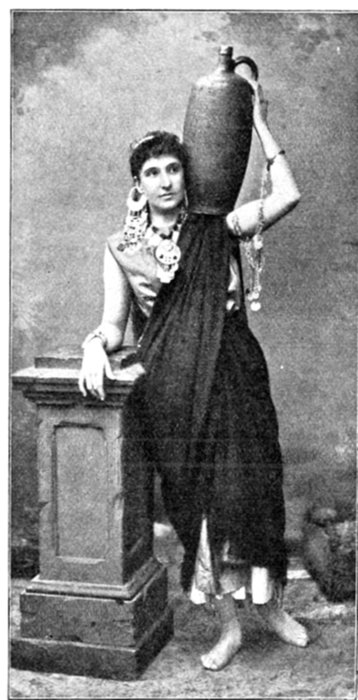
MADAME MELBA IN "LAKMÉ," 1890. From a Photo. by Dupont, Brussels.
In 1893 Melba went to America, to meet with a wholly unprecedented success; but in '94 she was back at Covent Garden, to charm huge audiences with her Nedda in Leoncavallo's "Pagliacci" and her Marguerite in "Faust." Since then the cantatrice has appeared with regularity during the London opera season. Two of her most interesting appearances have been in "Carmen" three years ago, when that opera was performed with the extraordinarily strong cast of Madame Calvé as Carmen, Madame Melba as Michaela, and M. Alvarez as Don José; and in "Les Huguenotś" in 1896, when Albani was the Valentina, and Melba the Margherita de Valois. In that season, by the way, a gloom was cast over English musical life by the deaths of Sir Joseph Barnby and Sir Augustus Harris, the latter being a personal friend of Madame Melba, and of whom she cherishes many pleasant recollections.
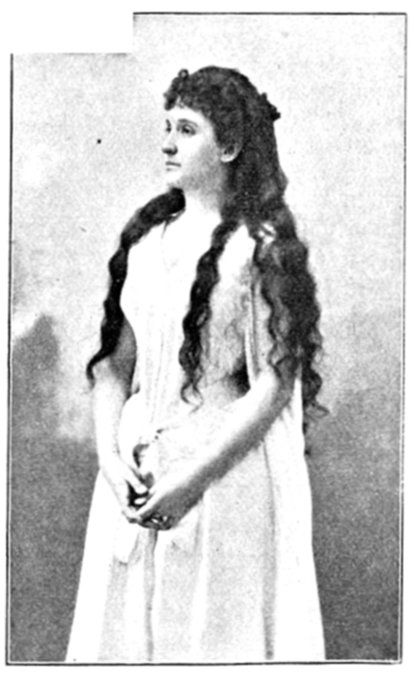
MADAME MELBA AS LUCIA DI LAMMERMOOR, 1891. From a Photo. by Nadar, Paris.
But then, as I told the Australian prima donna, in her case "pleasant recollections" must of necessity multiply themselves, by virtue of the numbers of the world's great ones with whom her art and her remarkable gifts have brought her in contact. And yet she remains so wholly and entirely a "womanly woman," that I verily believe she values the esteem and admiration of the lowliest peasant as highly as that of the great ones of the earth.
In respect of the personal friendships to which I have just made reference, the diva has delightful remembrances of masters like the veteran Verdi, Charles Gounod (with whom she had the privilege of rehearsing his "Faust" and "Roméo et Juliette"), poor Goring Thomas, the creator of "Esmeralda," Tosti, and Puccini. In the case of the latter composer, she studied her part in his "La Bohème" (a new assumption) with him in Southern Italy last summer; and, if all that we hear be true, she is destined to win fresh laurels in the same composer's newest work, "La Tosca," in which Puccini does for Sardou's tragic story what Verdi has done for Shakespeare's "Othello."
Nellie Melba is a woman of rare enthusiasms. In conversation with me, she could not say too much in praise of Madame Matilde Marchesi—the only singing-teacher she has ever had—and whom she speaks of in terms of warmest affection and sympathy.
I asked the prima donna whether she has ever experienced the excitement and danger of a theatre fire. "Yes, on two occasions," she told me; "in San Francisco and in London. In both cases the danger was happily averted. At Covent Garden the outbreak happened actually on the stage during a performance of 'Faust,' and the curtain had to be rung down. I chanced to be in the 'wings' at the time, and while they were battling with the flames behind the curtain, I came in front and begged the people to remain seated. Fortunately that most terrible of calamities, a theatre panic, was averted. As soon as I found myself behind the scenes once more I committed the weakness of fainting."
There have been, not unnaturally, some striking incidents connected with Melba's enormous popularity at the Paris Opera House. There is one of them, however, to which a pathetic interest attaches by reason of the comparatively recent death of Madame Carnot, who figured in it in very sympathetic fashion. The opera was "Lucia di Lammermoor"—one of Melba's greatest, if not her very greatest assumption. It happened that the tenor, Monsieur Cossira, arrived at the Opera House feeling very unwell, but apparently recovering before the opera began he decided to go on. Early in the first act, however, he almost completely lost his voice! When it came to the duet with Lucia in the first act, it utterly failed him. The prima donna, full of sympathy for his difficulty, for a time sang his music as well as her own; but ultimately the curtain had to be rung down, and for a few moments it appeared as though the performance could not proceed, since—surely a thing unprecedented at the Paris Opera House—Monsieur Cossira was not provided with an understudy! As luck would have it, though, among the audience was M. Engel, who had sung the part with Melba, not long before, in Brussels. Grasping the situation, he went behind the scenes and proffered his services, which were gladly and gratefully accepted. The performance proceeded, and for several nights thereafter M. Engel sang the part.
"At the close of the evening," added Madame Melba, in telling me of the incident, "Madame Carnot sent for me. It was during Monsieur Carnot's reign at the Elysée, and so his wife was occupying the Presidential box at the Opera. Being a woman of very quick perception, Madame Carnot had observed my efforts at covering the confusion of my poor colleague. I can never forget her kind words to me then, nor shall I readily forget the sorrow I felt afterwards on hearing the news of President Carnot's terrible end, and of her own death subsequently."
By the time this interview appears in print, Madame Melba will be in the thick of her fifth visit to the United States. Her previous operatic tours of the American Continent have been full of varied and interesting experiences. One of the most characteristic "Melba stories" that I know dates from her last tour but one. It was at St. Louis, where, thanks to a late train, the diva and her company arrived only a very little time before the hour fixed for the commencement. There was, in fact, only just time for the artists to make for their respective dressing-rooms. But Melba, looking down from a coign of vantage into the orchestra, observed, to her dismay and annoyance, that her musicians were in morning dress. She promptly sent for the chef d'orchestre. The poor man expostulated, remonstrated; they had but a few minutes before come off the cars; there was no time, etc. But Melba was firm. "If the gentlemen of my orchestra do not choose to appear in evening dress, I shall refuse to go on the stage. I owe a duty to the public as well as to myself."
This inexorable mandate had its effect, and the musicians were soon seen filing out of the orchestra, to return a few minutes later, suitably clad in the evening garb of comparative civilization. Then the curtain rose and the opera commenced—only a very little behind time. The incident did not, however, pass unrecognised. The critics of[Pg 17] the Press had seen the musicians disappear and re-appear, and correctly surmising the cause of their "quick change," the result was a series of graceful little articles in the St. Louis papers complimenting the popular favourite upon her sense of the fitness of things.
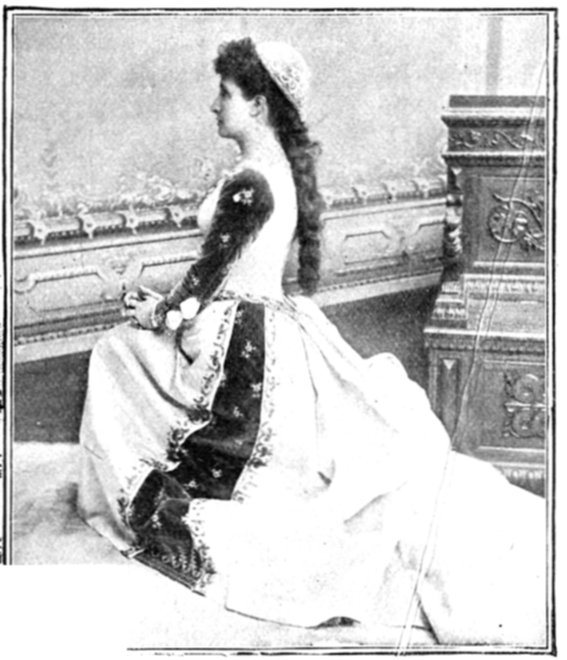
MADAME MELBA AS JULIETTE, 1892. From a Photo. by Dupont, Brussels.
An incident without precedent on the concert stage marked the concert which Melba gave at the Albert Hall, on November 2nd, to signalize her departure for her present trans-Atlantic tour. Of the three principal performers—i.e., Madame Melba herself, Miss Ada Crossley, the contralto, and Mr. Johann Kruse, the solo violinist—all were not only Australians, but Victorians by birth.
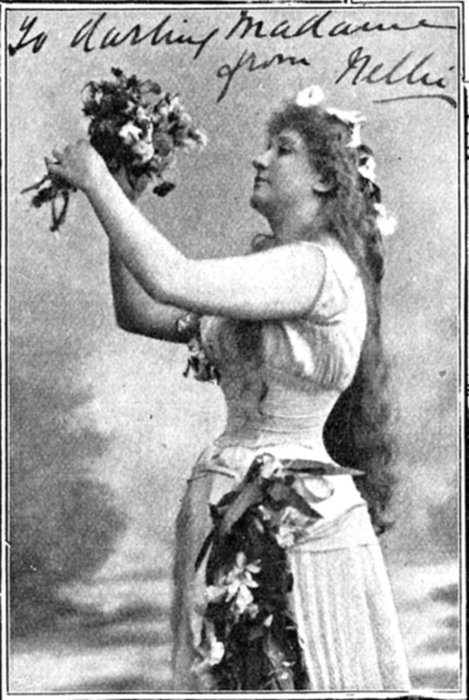
MADAME MELBA AS OPHÉLIE, 1895 From a Photo. by Reutlinger, Paris.
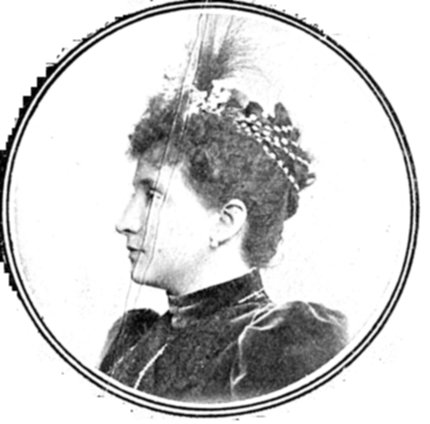
MADAME MELBA, 1893. From a Photo. by Renque et Cie, Paris.
Immediately after her few but brilliant appearances at Covent Garden last season, Madame Melba rented a charmingly-situated house, called "Fernley," near the river at[Pg 18] Maidenhead. Here she entertained many friends during the month of August. A very interesting "group" photograph of three distinguished Australians—Melba, Mr. Haddon Chambers, and Mr. Bertram MacKennal—taken at that time on the lawn at Fernley, is shown at the top of this page. It will be interesting to your readers that the last-named distinguished compatriot of Madame Melba's is executing a bust of the diva, which she has decided to present to the Public Library of Melbourne. A bust of the Melbourne Melba, by the Melbourne MacKennal, is obviously an artistic event of peculiar interest.

MADAME MELBA, MR. HADDON CHAMBERS, AND MR. BERTRAM MACKENNAL. From a Photo. by H. Gude, Maidenhead.
By the way, the popular morning "daily" that unwittingly represented Melba as an athletic kind of lady, skilled in the gentle art of rowing, was sadly in error! Far and away the most interesting episode of the stay at Fernley was a visit which the prima donna and some members of her house-party paid to the grave of the poet Gray in Stoke Poges churchyard. Here, it will be remembered, Gray wrote his beautiful "Elegy"; and here, too, Melba (who, I omitted to say, is an accomplished organist, and often used to play that instrument in the Scots Church at Melbourne) expressed a desire to try the organ in the charming old church of Stoke Poges.
Thereby hangs this tale: The rector, on it being represented to him that "Madame Melba would like to play the organ," court[Pg 19]eously handed over the necessary keys, and Melba gave great pleasure to her audience of half-a-dozen friends by playing and singing for them a selection of pieces, which included the Gounod "Ave Maria," and ended with the National Anthem. Asked by one of the party how she had enjoyed the impromptu sacred concert, the old lady who was in charge of the church, and whose services had been requisitioned to blow the organ, enthusiastically rejoined, "Oh, it were all beautiful, m'm, but 'God Save the Queen' were best of all!"
Madame Melba is fortunate in having some one member of her family—a brother or sister, generally speaking—to accompany her on her travels. During her last American tour she had for companions both a sister and a brother—Miss Dora and Mr. Ernest Mitchell—and she still speaks of the regret with which she parted from them when they were obliged to return to their Antipodean home about the end of the last London season. She says she is not less fortunate in having a man like Mr. Charles A. Ellis (originally the business manager of the Boston Symphony Orchestra) to personally conduct her trans-Atlantic tours. The present one will be very much extended, and will involve the traversing of many thousands of miles by the diva and her company. The principal members of that company are Ternina, Zélie de Lussan, and Gadski, Alvarez, Bonnard, Pandolfini, Kraus, and Bonderesque, and the orchestra is controlled by Signor Seppilli and Mr. Walter Damrosch. As for Melba's répertoire, it comprises not only two rôles quite new to her—"Martha" and "La Bohème"—but also "Lucia," "Hamlet," "Manon," "Les Huguenots," "La Traviata," "Rigoletto," "Faust," "Roméo et Juliette," and "Il Barbière di Siviglia"—in the last-named of which she scored such a shining success at Covent Garden last season. While on the subject of America, I may mention that Madame Melba seriously meditates refusing an offer for a season in South America, which I take to be the most dazzling and tempting ever made to a prima donna. She whimsically says that she thinks she would rather spend the greater part of 1899 in Europe, although she looks forward with pleasure to a visit to South America later on.
I am reminded of one more "Melba anecdote." Two or three years ago she took a party of friends to see the interior of La Scala, the noble opera-house where many of her triumphs have been won. Throwing open the door of a dressing-room, their cicerone exclaimed, "This is where the celebrated Melba used to dress!" The great singer's friends began to laugh, but she, looking hard at the man, quietly asked him, "What! don't you know me?" And then this son of Italy perceived that, sans voice and sans diamonds though she might be, she still was "Melba."
It is, I think, illustrative of Madame Melba's large humanity that the simpler and more sympathetic the anecdote, the better is she pleased to tell it. For example, "one touch of nature" is to her much more than to tell of her many meetings with Royalty—of her brilliant career as queen of opera—of her impressions of the many great ones of the world into whose society she has been thrown. Of her début in opera she readily speaks, for must it not always rank as one of her pleasantest memories? It occurred at the Brussels Opera House, and at the age of twenty-two. Not at that time knowing French, Melba was permitted to sing in Italian, while the other artists sang French—an unprecedented concession to a débutante on the part of the local opera authorities. On that memorable evening, the next box to the one occupied by some friends and relatives of Madame Melba contained a lady and gentleman. At the close of the first act, the latter asked his companion as to her opinion of the débutante, when the lady was heard to reply, "Débutante! Nonsense! I heard her in Madrid ten years ago. She was an awful failure, and she's forty if she's a day!"
"Did you feel any resentment when you heard the story?" I asked.
"Not in the least," replied Madame Melba, laughing merrily, "albeit in those early days I had not grown accustomed, as, alas! I have since, to hearing strangely false reports about myself—reports sometimes amazing, sometimes absurd, and sometimes, I fear, malicious. Besides, I was in far too good a humour with the public success I had achieved to feel angry; and if the story appears in your article, and the lady sees it, I shall feel amply avenged."
Two incidents in connection with her first American tour were related to me so feelingly by the prima donna, that I must do my best to reproduce them. The first occurred in New York. Melba had been practising her part at her hotel one afternoon. Just as she had finished, and was coming out of her rooms, she encountered a strange lady, whose rooms opened into the same corridor. The unknown approached her,[Pg 20] and said, "Madame, I think you would be touched to hear what my little boy said just now. He is lying in bed getting over an illness; and when you began to sing he lifted his tiny forefinger and whispered, 'Hist, mummy! Birdie!'"

MADAME MELBA (PRESENT DAY). From a Photo. by Reutlinger, Paris.
The second incident referred to occurred one snowy night as the diva was leaving the stage-door of the Opera House at Philadelphia. An old lady, very neatly attired, but evidently not in affluent circumstances, was waiting for her as she crossed the foot-way to her carriage. When Madame Melba appeared the old lady remarked, "Madame, I have just heard you sing, and I've waited here in the hope that you will let me take your hand." Melba, deeply touched, impulsively kissed the old lady on either cheek. This salutation won from its recipient these simple words, which Melba says she will never forget, "God bless your beautiful heart, my dear!"
My interesting visit to Madame Melba terminated with, on my part, a very natural regret. I carried away with me an indelible impression—the impression of a queenly woman, an incomparable artist, bearing her unrivalled gifts and her regal position in the world of music with a simplicity and a womanly modesty which, while unable to enhance their value, add a singular grace and charm to their possession. And I found it a pleasing reflection that I had been accorded an audience of a queen who is delightfully unconscious of her sovereignty, and who, even if robbed of the gifts which now enchant the world, would still retain those qualities which enchant her friends—her bright intelligence, her ever-ready sympathies, and her true womanliness.

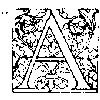
"Another present, Honor? I thought you had really received the last."
"So did I," replied Honor, sitting up in her low chair, and beginning to untie the string that was round the small parcel. "People are very kind; wonderfully kind."
Mrs. Latimer looked up quickly at the sound of the dejected voice. She was a slight, sweet-looking woman, in widow's dress, whose face, despite its never-varying sadness, bore traces of great beauty. The present proved to be a very beautiful pendant of emeralds and diamonds. Mrs. Latimer, having admired it as it lay on its satin bed, handed it back to her daughter.
"So kind of your Uncle James," she said, as she did so, watching meantime, with puzzled uneasiness, Honor's listless fingering of the jewel-case.
"Very kind!" remarked the girl, tilting her chin somewhat superciliously. "Am I not marrying a rich man? If Ronald had been poor, how would Uncle James have treated me?"
"Honor, Honor," said her mother, a pained look crossing her face, "how very unlike you to be so bitter."
Honor crossed over to where her mother sat and dropped down on the rug beside her, and taking one of her mother's hands pressed it to her cheek.
"He thinks it really, little mother, only you are too good to see it, and know too that I love Ronald so dearly that I'd marry him if he hadn't a second coat to put on. Uncle James, of all people!"—she threw the case into the chair she had just vacated, her blue eyes shining and hard—"Uncle James, who might have done so much, who might have saved his nephew from destruction by holding out a helping hand. Poor Jim!"
Her clear voice broke for a moment, then she pointed to a table in the corner that was covered with wedding presents.
"I'd give them all for one little note from Jim saying he was sorry and was coming to us. Just imagine if he came home and sat with us here in this very room! I cannot get him out of my thoughts to-night. Perhaps, somewhere, he is thinking of us."
Mrs. Latimer sank back in her chair, the tears coursing down her face.
"I pray night and morning that he may come back to us, and it seems as though God turned a deaf ear to all my pleadings. I dream of him, Honor, so often, our handsome boy, as he was before he went astray, and the awakening seems more than I can bear."
A pang shot through Honor's heart as she looked up into the fragile face, and she regretted having been carried away to speak of the prodigal.
"He will come back to us sooner or later," she said, hastily; "I am certain of it. He is too fond of us to go far astray. The threats Uncle James used terrified him."
"I am almost sorry we left the other house," Mrs. Latimer said, presently. "Suppose he came and found strangers occupying our place?"
"He has only to ask in the neighbourhood to find us no farther than the next road," said Honor. "Don't let that worry you. He will come home to us some day."
She spoke with a cheerfulness she was far from experiencing; the thought had often occurred to her that Jim, her only brother, must be dead. Heedless and headstrong he might be, but he had always possessed a warm heart, and would not have left them to anxiety for so long. Twice her wedding had been postponed, but the prodigal still delayed, and in a few days her marriage would be an accomplished fact.
Presently Mrs. Latimer said "good-night" and went to bed. After lighting her candle and watching her up the staircase, Honor returned to the room in which they had spent the evening. An unbearable restlessness was upon her, and she could settle to nothing, though there were notes to be written and a host of other things to be done.
She heard the servants troop up to bed, and then a silence fell upon the house, only broken by the melancholy soughing of the wind among the trees in the garden. The loneliness and silence told after a time, and she rose to follow her mother's example, though sleep was the farthest thing from her thoughts. She examined the window fastenings, and picking up the case containing the pendant, placed it among the presents on the table. The thought occurred to her that there ought to be a place in which to lock up the valuables, but in her preoccupation the fact troubled her little. Jim was the one absorbing thought, ousting even Ronald from her mind. A mental picture of Jim, destitute and starving, rose before her continually, embittering her life, and she could look forward to nothing until she was at rest about him.
She looked in at her mother on the way to her own room, and found her sleeping tranquilly. At the sight of the thin cheek on the pillow, Honor's heart contracted painfully; her mother grew paler and more fragile day by day, and the doctors had said that in the weak state of her heart a sudden shock might prove fatal. A tear dropped on the thin hand lying outside the counterpane, and Honor crept away to her own room. When ready for bed she lay in the darkness, feeling every nerve acutely on the alert.
The clock in the hall below ticked solemnly and struck the hour from time to time, and Honor could hear the faint sound of the cuckoo. She remembered the little bird as long as she could remember anything; from babyhood it had been the delight of herself and Jim, with its perky, impertinent manner, and the brisk way in which it bounced out and in again. Hot tears blinded Honor's eyes and soaked into her pillow.

"SHE LOOKED INTO THE WIDE HALL BELOW."
There came a faint sound from below, so faint as only to make the stillness more noticeable. The wind moaned round the house, but fitfully, as if a storm were gathering at a distance. Honor half sat up in bed, straining her ear to listen. There was not a stir in the house, yet she felt convinced that someone shared her vigil. Fearing her mother might be ill, and yet not wishing to disturb her if she slept, she drew herself noiselessly out of bed, and groped for her dressing-gown without striking a light. On her way she looked into the wide hall below.[Pg 23] A faint glimmer illumined it, and her eyes soon became accustomed to the dim light. Someone stood facing the clock. Click! the doors flew open, and out sprang the cuckoo.
One, two, three. The doors closed again. There was a faint sound, which might have been a box of matches falling on the tiled floor. It was followed by a smothered exclamation. The figure stole away in the direction of the morning-room, where she and her mother had lately been sitting. Honor remained in the dark motionless, wondering what she had better do. All the servants were women, and to awaken them meant rousing her mother, and that she dare not do.
She gathered her dressing-gown closely round her and crept noiselessly from stair to stair, quivering all over as they creaked under her bare feet, but never pausing until she stood at the half-open door of the morning-room and looked in. What she saw froze her into immovability. A film swam before her eyes. It was Jim! The prodigal had returned, but why in this way? What could it mean? She rubbed her eyes incredulously. There was another man standing near the window, but it was upon Jim her glance was fixed with reluctant, fascinated horror.

"THE LIGHT FELL FULL UPON HER."
Jim leaned against the mantelpiece, his face was white and drawn, and in his eyes was reproduced some of the incredulity of Honor's.
"I can't, I tell you," he spoke in a low voice, that yet came clearly to the listener. "I promised, as it was to be the last time, but I break my word—I must get out of this, I tell you. That clock! My God! what I'd give not to feel such a scoundrel!"
"Clock? What are you raving about?" said the other. "What's wrong with the clock? They must strike, I suppose! Come on, let's get out of this. What's given you such a scare? You might have seen a ghost."
"So I have, the place is full of them. I must go; the very air stifles me." He stood upright and moved towards the door.
"Not a foot until you've done your share," replied the other, advancing, and Honor could see his evil, dissipated face; "don't desert an old chum."
"I wish to Heaven I had years ago, Hammersley. You've been my curse ever since I've known you. Let's clear out."
Honor started at the name, that of an old school-fellow. She pushed the door open farther, and the light fell full upon her, disclosing her white face with its glittering aureole of hair, and the blue eyes wide with pain.
Hammersley dropped the trinket he held with a little sharp tinkle, and drew back into the shade shamefacedly. But Honor never noticed him, all her glance was for Jim, who stood rigidly upright, staring at her as if she were a visitant from the grave.
"Honor!" the words came with difficulty from his parched throat. "You! What does it mean?"
Honor advanced a step nearer.
"Mean?" She spoke in a clear, relentless voice, half mad with the disgrace of it all. "Mean? It means that you have sunk so low as to rob your mother and sister of a few valuables. It means that you have broken[Pg 24] into your mother's house like a common thief. No, no——" Her voice vibrated with a sharp throb of pain—"even the lowest, the most degraded, would think twice before robbing his own."
The light showed clearly all the misery of Jim's handsome, haggard young face.
"I swear to you——" he began, but Honor went on speaking, her voice low with concentrated scorn, and he drew back under the lash of her glance.
"Why did you not die years ago? Only to-night we were talking of you, praying that you might return, and this is how God answers our prayers!"
She pointed to the table, and Jim's head sank lower.
"Take them all if you want them, but go."
He moved blindly towards the door, and as he reached it, a footstep sounded along the passage, and Mrs. Latimer appeared. Before Honor could stir she had caught sight of Jim, and putting down the light she carried, she made a little run forward, and put her arms round his neck.
"God bless you, my own boy. I knew you would come," she said, and fell inertly with her cheek against his.
Above his mother's head, Jim's eyes met those of Honor, in anguished appeal. As he stood holding his mother in his arms his punishment seemed greater than he could bear.
A fresh fear took possession of Honor, and for a moment she dared not ascertain the worst. Had not the doctors talked of a sudden shock?
"Bring her here," she said, indicating a couch close by; "she must never know, poor, poor mother!"
In the bustle that ensued Hammersley made good his escape, unnoticed by anyone. Honor applied restoratives, and after a long time Mrs. Latimer came back to consciousness. Her glance sought for Jim; Honor motioned him over.
"My own darling boy, why did you come back so late? How thin and white you are! We must feed him well, must we not, Honor?"

"SHE PUT HER ARMS ROUND HIS NECK."
She stroked his face as he bent over her, and under her loving trust and entire unconsciousness of the true facts of the case Jim suddenly broke down, and, like a penitent child, buried his face in a fold of her dressing-gown. And she never knew the truth. But even Honor, who knows, has perfect faith now in Jim.
By Grant Allen.

In a certain sense, all animated nature is but a single vast co-operative society. I am no foolish optimist: I will admit, indeed, that the members of the society so composed often display to one another the most unfriendly and unfraternal spirit. The hawks, for instance, show a distinct want of true brotherly love towards the larks or the tom-tits: and the mice and lizards find the owls and the cats by no means clubbable. The co-operative society is hardly what one could call a happy family. Still, in spite of the fact insisted upon by the poet that "Nature is one with rapine—a harm no preacher can heal," it is none the less true that a certain rough balance, an accommodation or adjustment of part to part, occurs in every department of animal and vegetable life. When we come to think, it could hardly be otherwise. Things can only exist if they contain in themselves the conditions necessary to existence. An unadapted animal or plant perishes instantly. Spiders could not live in an island which contained no flies; kingfishers necessarily presuppose fish; and silkworms imply the presence of mulberry leaves. You cannot have vultures wild in a country where there are no dead animals lying about loose: nor can you keep bees except where there are honey-bearing flowers. Dutch clover depends for its very existence upon a few insects which fertilize it and set its seeds. The draining of the fens killed out a dozen species of English plants and animals; the inclosure of the prairies deprived the buffaloes of their chance of pasture. In this sense, all nature hangs together as it were; each species fills some place in the great mosaic which cannot be altered without considerable disturbance of adjacent pieces. Destroy the rabbits in a given area, and you have nothing left for the weasels to feed upon.
Sometimes, too, apparently unimportant or unnoticed creatures perform in the aggregate some valuable work for the rest of the plant and animal community, which little suspects its real indebtedness to them. Darwin showed long ago that the humble and despised earthworm was really answerable for the greater part of that rich layer of vegetable mould or soil which covers the bare rocks; it deposits the material in which all our plants root and from which they derive a large element of their sustenance. Kill out the earthworms over the whole of our earth, and you would reduce a vast proportion of it to the condition of a desert. For the worms pull down green leaves into their neat little burrows; and the refuse of these leaves, continually renewed from season to season by the industrious small workmen, forms by far the greater share of that dark layer of vegetable mould which is the chief source of the fertility in plains and lowlands. Sandy upland spots, where worms are few, form little or no soil, and will only support a poor moorland growth of gorse and heather. You must have plenty of worms if you want to grow corn or turnips.
But there are other unconsidered creatures besides these, creatures which perform for us functions almost as useful and important as those of the earthworms; and I propose to devote a few pages here to one such group, the sanitary commissioners of the insect world, as I will venture to call them—the vast body of minor sextons and six-legged scavengers. Has it ever struck you that as you walk abroad through the rich green meadows and pastures of England, you almost never come across a dead and decaying animal? I do not mean large animals like horses and donkeys: those do sometimes occur unburied, giving us bold and unpleasant advertisement of their near presence. But just consider that the fields through which you stroll are a perfect warren of moles and shrews and field-mice and water-voles and frogs and lizards and rabbits and weasels, to say nothing of smaller fry; and then think how seldom on your morning rounds in the country you come across a single dead bird or rat or adder, a departed toad, or a late lamented leveret. The ground about you teems with life: but where are its cemeteries? Squirrels and dormice are dying in every copse: but what becomes of their bodies? Who ever saw a dead bat? Who knows the tomb of the deceased hedgehogs?
Of course a great many of the smaller animals die a violent death, and find their living grave in the maw of their devourers—one must admit that explanation as covering a very large number of cases. Thirty field-mice have been disinterred from the stomach of a single buzzard when it was shot in the act of digesting after a good dinner; and owls and snakes are answerable for the fate of no small proportion of our minuter wild animals. In other countries, too, vultures and jackals devour most of the carrion as it lies; while even in England we have a few dead-meat-eaters, such as the carrion-crow, the rat, and the shrike. But for the most part our rural English public scavengers are smaller and less conspicuous creatures. Foremost among them in number and utility we may reckon the various kinds of burying beetle.
If you do find the body of a mouse or shrew lying unburied in England, it occurs almost always on a path or high-road. Now this fact is in itself significant; for the high-road is practically a man-made desert, so hardened and steam-rollered, so pounded and wheel-ridden, that no plant can grow on it; so exposed that small animals will only scurry across it for dear life in fear and trembling; and so difficult to dig into that no burrowing creature can hope to worm his toilsome way through it. Hence the animals that die on the road are almost never buried; while those that die in the field or copse are either eaten at once by larger beasts, or else decently interred within a few hours by the sexton beetles and other established scavengers. Indeed, a common superstition exists among country folk that one of the small long-nosed, insect-eating animals known as shrews cannot so much as cross a road without being killed instantly. A human track is supposed to be fatal to them. The superstition has arisen in this way: shrews die of cold and hunger in great numbers at the approach of winter. A certain proportion of them perish thus in the open fields; these, however, are immediately buried by the proper authorities, the sexton beetles. But a few happen to die as they are crossing a road or path; these lie where they fell, because the sextons cannot there pierce the hard ground, and seldom even dare venture on the road to carry them off to softer spots for burial. The rustic sees dead shrews in the road, and none on the open ground: so he hastily concludes in his easy-going way that to cross a human path is sudden death to shrews, who are always supposed for other reasons to be witch-like and uncanny animals. If the road leads to a church, a fatal stroke is specially certain: for the shrews, like all witch-creatures, hate Christianity.
I need hardly say, however, that the burying beetles do not perform their strange funereal office out of pure benevolence, without hope of reward. Like human sextons and undertakers, they adopt their lugubrious calling for the sake of gain: they expect to be paid for their sanitary services. The payment is taken in two forms: one, immediate, as food for themselves: the other, deferred, as board and lodging for their children.

1.—GROUPS OF MISCELLANEOUS SEXTON BEETLES, DISCOVERING A DEAD FIELD-MOUSE.
Our illustration No. 1 introduces us to a typical miscellaneous group of these insect scavengers, occupied in appropriating a very fine and desirable carcass on which they have just lighted. A field-mouse, vanquished by fate in the struggle for existence, has lately "turned up his toes" in the most literal sense, and lies unburied, like Archytas, on the loose sand of a bare patch in a meadow. All carrion-eating creatures are[Pg 27] remarkable for their powerful sense of smell: and the sexton beetles, like the vultures and condors, are no exception to the rule. They sniff their prey from afar: for where the carcass is, there shall the carrion beetles be gathered together. All are eager to take their share of the feast, and still more to lay their eggs in the dead body. Some of them may crawl up from the immediate neighbourhood; others, summoned from afar, come flying on their gauze-like wings from considerable distances. They are, as a rule, nocturnal creatures, and they come out on their burying expeditions by night alone.
The insect just alighting from his flight, in the upper part of the illustration, is the burying beetle par excellence among our British kinds; he rejoices (we are always supposed to rejoice foolishly in our personal designations) in the dignified title of Necrophorus vespillo. In stature he measures about an inch long, and he is a handsome beast, with two bright orange bands on his hard wing-covers. The illustration shows these wing-covers raised, as is the habit of beetles when they fly, while the thin but powerful wings beneath them are expanded as true pinions. When the insect alights, he folds the wings up carefully and replaces them under the hard protective wing-covers: he is then securely armour-plated from head to foot, and need fear no foe, save birds which swallow him whole—a very tough morsel—and hedgehogs which crunch him in their strong jaws before eating him. However, he is well prepared for all such enemies, for he can exude when attacked a very nasty fluid with a disgusting smell: and this mode of defence, which resembles that of the skunk and the polecat, usually protects him from obtrusive inquirers. He must be handled with caution, as the perfume he diffuses spoils woollen clothes and clings to the fingers after two or three washings.

2.—THE SEXTONS AT WORK: BURYING THE BODY.
As a rule, when a carcass appears, a pair of burying beetles of the same species—a husband and wife—fly up to the scene of operations together and take possession of the prey; though in the illustration Mr. Enock has represented several kinds engaged at once in staking out claims, which indeed happens often enough in nature. But if you count the number on any one dead bird or animal, you will almost always find they are even in number—in other words, so many pairs, male and female. No. 2 shows us the next act in the funeral drama. The male beetles, after satisfying their own immediate hunger, proceed to bury the carcass in a very curious and laborious manner. You would wonder how so small a creature could produce so great a result: the fact is, the beetles attain their end by continuous under-cutting. The female hides herself in the body: the male buries her alive and the dead creature with her. He first drags the mouse, frog, or bird to a suitable spot where the soil is soft enough to admit of excavation; and sometimes three or four males have to combine for this purpose. They then proceed to dig with their heads, which are tools specialized for the purpose, and provided with strong and powerful muscles. The antennæ have also assumed for this object a short club-shaped type, very suitable for a navvy's mattock. The little engineers begin by excavating a furrow all round the body, and then a second inside that again, throwing the earth out of each into the previous one: and so on till the carcass begins to sink into the hollow. They then dig and tunnel beneath it, carrying out loads of earth, one after another, till bit by bit the carcass collapses into the hole, first in front, then behind, and has reached a level considerably below the surface. Then they throw in the earth they have excavated, and cover up the body with the females inside it; after which, I regret to say, they[Pg 28] proceed to hold a very cannibalistic funeral service above it. The funeral service consists in eating as much of the body as they desire for their own purposes: when they have satisfied their appetite, they begin to think of the interests of posterity. The mother beetle proceeds to lay her tale of eggs in the decently-buried body, for every animal knows by instinct the precise place in which to deposit its young and the precise food which happens to suit them.
After the eggs are laid, the two parent beetles crawl out of the hole and cover it carefully up so as to conceal the hiding-place. So far as they themselves are concerned, their only object in all this is to procure food for themselves and their infant young. But the wider effects of such scavenger insects go very far. For we now know that there is no disinfectant so good as the top layer of the soil, which is not really mere dead earth (as most people imagine), but a mingled mass of ramifying life—a little foundation of clay and sand intermixed with endless minute organisms, both animal and vegetable—fungi, bacteria, mites, weevils, and all sorts of petty creatures, which eat up and destroy harmlessly all dead matter subjected to their influence. The earth is thus a most admirable deodorizer and purifier: and burial in its top layers, the body being freely exposed to the rapid action of the devouring microbes, is a most sanitary mode of disposing of refuse. Thus the part that is played in the East by vultures and jackals, or by the wild dogs of Constantinople, is far more effectually and unobtrusively played in our fields and meadows by the many kinds of burying beetles and other insect scavengers. If we remember how great a nuisance a single dead rat becomes in a house, we can faintly picture to ourselves the debt we owe to these excellent and unnoticed little sanitary commissioners. Without them, our fields would not smell so fresh, nor would our flowers bloom so bright; for we must remember that by burying the dead beasts they are not only preventing disease but also manuring the pastures in the best possible fashion. The bones of small animals decay rapidly and make excellent material for the growth of vegetation. The beetles as a rule hunt by night only, and find their prey, as vultures do, by the sense of smell. When they first find it, the male hovers above it like an eagle, circling round and round, so as to point it out to his mate; the female flies straight to it, and buries herself without delay in the rich banquet.
But what becomes at last of the buried bodies? No. 3 will show you. The female beetle lays in each body about as many eggs as she thinks it will support. In a very short time the eggs hatch out, and the grubs begin to devour the abundant feast provided for them. The two grubs to the right in the illustration are the young of our friend the orange-banded burying beetle: the one to the left is a larva of an allied form known by the poetical name of Silpha. They set to work at once on the remains of the mouse, and thoroughly strip the bones of every fibre of flesh. As soon as the skeleton is bare, they consider it time to leave off feeding, and pass on to the second stage of their existence—the pupa, or mummy-case.

3.—THE GRUBS UNDERGROUND; FEEDING UPON THE BODY.
As larvæ, the young burying beetles look like worms, and have six short legs. No. 4 shows them in the intermediate stage, when they have retired into a clay cell, or cocoon, and are undergoing their transformation into the perfect insect. We are here supposed to have removed the soil on one side so as to give a view into the concreted earthen chambers where the pupæ are changing into full-grown beetles. You can see the much[Pg 29] longer legs of the adult insect beginning to develop, while the head assumes slowly its later form. The grubs remain in the cocoon through the winter, and emerge in spring as winged beetles, when they fly away with their brilliant wing-cases raised, in search of congenial mates and more dead field-mice. The best places to look for all these beetles are the "keeper's trees," on which game-keepers hang up the jays and weasels they shoot, to encourage the others. If you tap one such dead weasel you will generally find it is simply swarming with insect life.

4.—NO MORE LEFT! THE GRUBS IN THEIR COCOONS TURNING INTO BEETLES.
Yet, strange to say, even the insect undertakers themselves are not without their ideas of beauty and their musical perceptions. The orange bands of our commonest English kind have been developed as attractions for their admiring mates; and the male beetles have also a musical instrument of their own in the shape of a peculiar rasp-like ring on the body, which they can rub against the wing-cases, and so produce a much-appreciated chirping. Such instrumental music is always employed, like the song of birds, as a charm to heighten the attractiveness of the suitor: and male burying beetles may be heard on the evenings of sunny days competing with one another in musical contests. Indeed, it often happens that animals which seem to us disgusting or unclean display among themselves much æsthetic taste, and are gifted with more sense of beauty or love of music than many other forms where our human eyes would be more inclined to look for the presence of these higher endowments.
I may add that if the beetles left the bodies in which they laid their eggs to lie above ground, the bodies would dry up, and the eggs would run much greater risks. By burying the dead animal, they provide their young with food and shelter together, and so display considerable intelligence.
Another very distinct group of insects which act as scavengers in a different way in hotter climates than ours are the famous scarabs or sacred beetles, worshipped almost like gods by the ancient Egyptians. English people know the scarabs best, I think, in the neighbourhood of Naples, or on the Lido at Venice—that great bank of sand and shingle which separates the lagoons from the open Adriatic. When wearied with sight-seeing at St. Mark's and the Doge's Palace, we have, most of us, taken the little steamer that runs across to the baths on the Lido, and spent a pleasant hour or two in picking up shells and dried sea-horses on the firm belt of beach that stretches away to Malamocco. A little inland, the beach gives way to dry sand-hills, blown about by the wind, and over-grown by patches of blue-green marram-grass and other sandy seaside weeds. If you lie down on one of these sand-hills, choosing a spot not quite so dirty as its neighbours, you will soon be amused by seeing a curious little comedy going on perpetually around you in every direction. A number of odd-looking beetles, with long hind legs and very quaint heads, are occupied with ceaseless industry in rolling a lot of dark, round balls almost as big as themselves along the slopes of the sand-hills. In many places, the whole ground is alive with the tugging and pushing little beasts: indeed, when you come to look close you will find that every half acre of sand on the Venetian shore or the lower edge of the Egyptian desert is a perfect city of these busy wee creatures. Earth is honeycombed with their holes, towards which innumerable beetles are continually rolling their mysterious balls at every possible angle.
Now, what are the balls composed of? There comes the oddest part of the whole odd proceeding. The plain truth of it is that the sacred beetles are assistant scavengers—imperfect[Pg 30] Southern and Oriental substitutes for a main drainage system. The balls consist of dung, dirt, and refuse, and the beetles collect them on the open, dry them hard in the sun, roll them to the mouths of their burrows, and then live on them till the ball has all been eaten. It is the funniest thing in the world to watch them. They tumble about in the loose sand and stumble over little eminences in the most comical fashion. No. 5 shows a pair of scarabs engaged in this habitual and quaint amusement. They have each collected a round mass of manure, and rolled and dried it nicely into shape; they are now engaged in trundling their booty off at their leisure to a place of safety. But they are obliged to push the balls backward with their long hind legs: and as this precludes the possibility of the scarab seeing where it is going, each beetle pauses every now and again and turns round, like a man sculling in a boat alone, to look what is ahead of him. Sometimes in doing so he loses his ball, a misfortune which has just happened to the beetle on the right in No. 5. The precious pellet goes bounding off down hill as fast as gravitation will take it. In this case, the disappointed little workman faces round and darts after it at full speed, going forward now instead of backward, and trying to head the ball as it rolls down the uncertain slope of the sand-hills. If he succeeds, he puts himself in front of the ball as it falls, catches it with his hind legs, and begins once more laboriously to push it backward up hill again, towards the mouth of his hole. But as the pellets roll quickly, and the beetles are by no means rapid runners, he seldom succeeds in recovering his own property, unless the ball happens to catch for a moment on some projecting little hillock of sand, or be checked on its downward course by a weed, a stick, or a dead shell or starfish.

5.—SACRED SCARABS ROLLING THEIR FOOD-BALLS BACKWARD (THE INSECT TO THE RIGHT HAS LOST HIS DINNER).
On the other hand, the scarabs, I fear I must admit, are terrible thieves; and if one scarab has lost his own ball, and sees some companion's pellet come rolling down hill towards him, he will often give up the pursuit of his lost property, and quietly and barefacedly appropriate his neighbour's. I have seen great fights take place at times over a disputed ball; though sometimes the combatants agree amicably to roll it along in common, and probably share it when they have reached their hole. Sometimes, again, three or four will unite to roll a ball: and then, when one loses it, the others combine to hold it up or catch it. I have spent hours together both in Egypt and on the Mediterranean or the Adriatic in watching the queer antics of these comic little commissioners of drainage: and I never tire of observing their odd and unexpected combinations of interest. I have sometimes known the real owner abandon a ball in despair, from the unevenness of the ground, and then seen a couple of outsiders come up and succeed in doing what the true owner had been unable to accomplish.
In No. 6 you see two such scarabs whose toil has at last been crowned by success, and who are delivering their balls with joy into the holes in the sand which form their residences. As far as I can make out, a pair of beetles, male and female, seem usually to share a hole in common, and to roll balls of food to it either alone or in concert. I cannot say I have ever seen much co-operation except between such partners. Once a ball is secured and safely landed—for here, as elsewhere, there's many a slip 'twixt the cup and the lip—the happy couple proceed to eat it up, and apparently do not emerge[Pg 31] again from their burrow till the supply is exhausted. Patient naturalists say that one ball has been known to last a scarab as long as a fortnight, but this I do not vouch for of personal knowledge. When more food is wanted, the couple emerge once more on the open sand and begin to collect fresh dung and refuse, which they roll into a new food-ball and then dry and harden.

6.—PRIMITIVE GOLF—END OF A ROUND: THE SCARABS HOLING THEIR BALLS.
Till very lately, it was universally believed that the female scarab laid an egg in some of the balls, and that the young grubs hatched within such food-stocks and began at once to devour them. This belief has recently been contradicted with great emphasis by a good French observer, who opened many balls and found no eggs; but I cannot accept his conclusion. I opened numbers of balls myself near Venice this year, and saw in several one or two eggs, while in one case (unearthed from a hole) I discovered a half-grown larva. I venture therefore in this matter to believe my own eyes as against those of even the most celebrated and authoritative entomologists.
In Egypt, it has been universally believed from all antiquity—and I think quite rightly—that after the scarab has laid an egg in the ball, the parents unite in rolling it to a place of safety, above the level of the annual inundation due to the rise of the Nile. At any rate, scarabs abound in Egypt. At a very early date, it would seem, the curious action of these beetles attracted the attention of the ancient Egyptians, whose worship of animals was one of the most marked features in their monstrous religion. Hence grew a strange and widespread superstition. A race which deified the hawk, the cat, the ibis, and the jackal was not likely to overlook the marvellous proceedings of the pious and dutiful scarab. So the very early Egyptians, we may conjecture, began by thinking there must be something divine in the nature of an insect which worked so ceaselessly on behalf of its young, and rolled such big round balls behind it up such relatively large hillocks. Watching a little closer, as time went on, the Egyptian discovered, no doubt, that sacred beetles did not proceed directly from sacred beetles, like lambs from ewes, but grew, as it were, out of the dirt and corruption of the mysterious pellets. A modern observer would, of course, at once suspect that the scarab laid an egg inside the ball, and would promptly proceed to pull one open and look for it. But that cold scientific method was not likely to commend itself to the mystic and deeply religious Egyptian mind. The priests by the Nile jumped rather to the conclusion that the scarab collected dirt in order to make a future scarab out of clay, and that from this dirt the young beetle grew, self-existent, self-developed, self-created. Considering the absence of scientific knowledge and comparative groups of scientific facts at the time, such a conclusion was by no means unnatural.
Once started on so strange a set of ideas, the Egyptians proceeded to evolve a worship of the scarab which grew ever and developed, as they thought the scarab itself did, practically out of nothing. The immortality of the soul and the resurrection of the body were the central ideas of Egyptian religion; the thinkers of Thebes and Memphis instantly perceived a fanciful analogy between the scarab rising from its bed of dirt and the mummy reviving when the expected day of resurrection should at last arrive. As a consequence of this analogy, the scarab was made sacred: it was reverenced during its life and[Pg 32] often preserved after its death, like the mummied cats and hawks and sacred Apis bulls which formed such special objects of veneration to the devout of Egypt. All sorts of mystic relations were also discovered before long in the scarab: its "toes" were counted as thirty, and held to symbolize the days of the month: it was said to be male only, without a female, and so to typify the creative power and the paternal or masculine principle in nature. Sun-worship, as we know, formed a large part of the later (though not of the most primitive) Egyptian religion: and the ball rolled by the scarab was therefore supposed to personify Ra, the great sun-god. In one way or another, the sanctity and the mystic implications of the scarab grew and grew, age after age, until at last scarab-worship became one of the chief practical elements in the religion of Egypt. There was a scarab-headed god, and scarab hieroglyphs appear on the face of all the monuments.
It is as a charm or amulet, however, that the ancient Egyptian imitation scarab is best known. From a very early period in the history of the Nile valley it became usual for luck's sake to bury some of these sacred beetles with the mummy, perhaps alive (in which case most of them would no doubt creep out again) and perhaps also dead. A few real scarabs have thus been found here and there in tombs. But for the most part, just as the Egyptians buried little porcelain images to accompany the mummy, so they buried porcelain or stone scarabs; and these were rather closely imitated from the living insect, but made still more sacred by being enamelled or engraved with the holy name of some king or god. Scarabs of this kind, inscribed with sacred words, and regarded as talismans, form some of the commonest objects disinterred in all the Egyptian excavations: one of them, from a specimen in the British Museum, is illustrated in No. 7. Comparison with the live beetles in the other engravings will show how well the Egyptians copied nature in this instance.

7.—AN EGYPTIAN SACRED SCARAB, IN THE BRITISH MUSEUM.
These beautiful and often costly Egyptian scarabs have been made the subject of very exhaustive study by various writers, more particularly by Mr. Loftie and Mr. Flinders Petrie. The Egyptians did not coin money, so that scarabs bearing the names of kings came to have somewhat the same importance for Egyptian history as coins have for the history of later civilized nations. Mr. Loftie traces the origin of the inscribed scarabs to a very early epoch in the Egyptian annals. "From the earliest times until the end of the native monarchy," he says, "certain usages continued unchanged. Among them was the inscription of names and texts on scarabs. The beetle which rolls before it"—he ought rather to have said behind it—"a ball of mud in which its egg is concealed was, at some period so remote that we cannot even approximately date it, seized upon as the embodiment of the idea of futurity.... The scarab, burying his egg, became the symbol of the resurrection, of the happy time to come, of a re-creation of all things; and with every corpse scarabs were buried, and scarabs were sewed upon the shroud, and strung into a network to cover the body, and suspended round the neck, and clasped in the dead hands. As many as three thousand scarabs have been found in one tomb, and the number in existence in museums and private collections is past count." Some of these imitation beetles are of blue pottery, enamelled outside; but others are of lapis lazuli, jade, carnelian, and many other precious stones. Sacred in themselves by their very form, that of the revered insect god, they are rendered still more sacred by their mystic inscriptions, which consist of appropriate religious phrases in hieroglyphic writing.
From Egypt, the belief in the luck and value of engraved scarabs as charms or amulets passed on to the Greeks, and also to the Etruscans. Many Greek scarabs have been found; and in the old Etruscan tombs such lucky beasts are comparatively common. They are mostly made more or less in imitation of the Egyptian originals. Oddly enough, even the early Christians themselves did not at once get over the belief in the sanctity and talismanic character of the sacred beetle, for the Rev. W. J. Loftie has pointed out examples of late[Pg 33] scarabs engraved with undoubted Christian symbols—not only crosses but even crucifixes. In our own days, a slight revival of the antique superstition has once more taken place, and some ladies of my acquaintance wear specimens of the old sacred beetles as charms in brooches or suspended on their watch-chains.
Though such numbers of true ancient scarabs have been unearthed in Egypt, still the supply of the genuine article does not quite keep pace with the increasing demands of the modern tourist: and there is now a flourishing manufactory of sham antiques at Luxor, where hundreds of false scarabs with nice imitation hieroglyphic inscriptions are neatly turned out for the market every season.
About sixty different kinds of live scarabs are known to inhabit the Mediterranean district in Europe, Asia, or Africa: and four of these kinds can be easily distinguished as being individually represented in the old Egyptian gems. We have no true scarab of this class living in Britain: but there are other scavenger beetles which take their place, the best known being the common dorbeetle. One of the same family, but with a quaintly horned head, exists in vast numbers on the Surrey hills where I have pitched my tent. The English dung-beetle burrows in the soft sandstone, and throws up neat little heaps of clean sand at the mouth of its hole, like miniature molehills. Still, our English scavenger beetles—known to science as Geotrupes—are not nearly so clever or so interesting as the southern type, for the female in our sort merely grubs a straight tunnel in the ground, and lays her egg in a loose mass of dung, which she drags to the bottom in a shapeless condition. This beetle utters a plaintive buzzing cry when it is chasing its mate—a soft of "last appeal" which seems calculated to soften the heart of the hardest lady beetle. It is as cunning in its way as most others of its race, for if you catch it in your hand, it at once draws in its legs to its side and "shams dead." All the English and foreign scavenger beetles perform a useful task by following up animals and clearing away their refuse; indeed, a special kind of beetle lays itself out as scavenger for each species of large animal, one kind being attached to the cow, one to the donkey, one to the camel, and so on through a long list of patrons and satellites.
You will thus see that in this wider sense all creation moved together like a vast joint-stock co-operative society, each kind working consciously for its own good alone, but each also in a certain deeper and unconscious way contributing to the general well-being of all, by its exercise of some special function. Nevertheless, the function is always performed by each plant or animal itself for its own purposes; it only incidentally serves to benefit the others. Thus the burying beetles and the scavenger beetles work first of all and ostensibly for their own food and the food of their offspring: it is merely as an incidental result, undesigned by themselves, that they assist in purifying the air and the soil for all other species. Or, to put it still more simply, while these industrious little creatures are working individually for their own ends, they are also in the wider scheme of nature working unconsciously and almost unwillingly in the service of others. Nature bribes each kind, as it were, by some personal advantage to perform good work for the benefit of the totality.
The good work performed by the scavengers may be thus summed up. If dead bodies and the refuse of food were left about everywhere freely on the open, germs of disease and putrefaction would fly about much more commonly than even at present. But a large number of scavenger animals, scavenger birds, and scavenger insects—hyenas, vultures, burying beetles, and so forth—act as public servants to prevent this calamity. Again, the earth needs the bodies and the refuse as fertilizers: and many of the scavengers carry down such materials into the first layer of the soil, where they become of enormous use in promoting the freer growth of vegetation. Thus, long before men learnt to bury their dead or to manure their fields, nature had invented both these processes, and registered them, so to speak, in the instincts and habits of a special class of insect sextons and sanitary inspectors. It is always so in life. There is hardly a human trade or a human activity which does not find its counterpart somewhere in animal or vegetable life: and it will be my object, in future numbers of these papers, to set before you in other directions some such natural anticipations or foreshadowings of man's inventions.


Private William Fox was swaggering down the road to Shorncliffe Camp; that is to say, he was trying to swagger as much as his 5ft. 2in. of stature would allow. For the prettiest girl in Folkestone was holding on affectionately to his left arm, and in his right hand he displayed to full advantage his new silver-topped cane, the result of several weeks' savings.
"Little Willie," as his comrades of the 210th line called him, was the most "special" of "special enlistments." He had enlisted at a time when a war scare was running riot throughout the country, and the inspector-surgeon had passed him, saying that he was sure to grow to standard height as he was only just eighteen, although it was evident to anyone who glanced at the set look of his shoulders that he would never be a hair's-breadth taller than he was. It was certainly rather trying to his three-month-old martial dignity to have the street urchins asking him as he strutted through the town whether "his ma knew he was out"—but that was nothing to the jeers of the men of his company, and Little Willie had not found the life of a soldier of the Queen as alluring as the recruiting sergeant had painted it.
But on this particular summer afternoon he had forgotten all that, for was not Nellie, his own little Nellie, tripping along by his side?—and he never thought of his grievances when she smiled those sunny smiles of hers. He had known her for years; as children they had made mud-pies in the gutter together, and when he was a little older he used to spend the pence he got for holding horses and running errands in sweets for Nellie; and now that they were grown up, and that she was in service and he was wearing a red coat, they "walked out" together, and talked of getting married.
"When I get my stripes, Nell, we'll get spliced, thet's what we'll do."
Nell nodded her assent.
"'Ow long'll thet be, Will?"
"Not so very long, neither," he said, his boyish face lighting up with the ambition of a future field-marshal—"a year or two, maybe, maybe less—they're a-wanting good, steady men loike me."
Here a loud voice behind them put an end to further confidences. "Ullo, little 'un, where are yer a-going, so 'aughty-like? Yer won't as much as look at a pal!"
The two stopped and looked round as Big Bob finished his sentence, Willie with disgust written on every feature, Nellie with unqualified admiration in her brown eyes. Big Bob was accustomed to that sort of thing[Pg 35] from the girls he condescended to talk to; he was certainly a very handsome man—fair, curly hair, a fierce moustache, and light-blue eyes that looked down protectingly on womankind in general. So without further ado he ranged up on the other side of Nellie with a "Pleased to meet yer, miss."
For the rest of that walk poor Little Willie was decidedly "out of it." He had to dodge lamp-posts and walk on the curb, so that his six-foot rival should not be forced into the hedge on the other side; however, there was one consolatory thought in his mind, namely, that if Nellie managed to impress Big Bob favourably—as he had little doubt she would—the latter perhaps would give up making Willie's barrack-room life a burden to him.
Nellie did make a good impression on Big Bob; but, alas, for poor little Willie, it was not a one-sided affair. Next time the two lovers went for a stroll, Nell was distinctly patronizing.
"Why don't yer grow, Will? Yer ain't as tall as me by a inch, and yer does look small in a red coat!"
This was an awful blow; up till now, Nellie had been the only one person who told him he looked well in his uniform, and now that she should turn on him like this!
"Garn!" he answered, "where's the use in bein' a lamp-post?"
"But Big Bob—I mean Mr. Jones—'e ain't no lamp-post. 'E's a good sight broader in the shoulders than ever you'll be. Why, 'e'd make two of yer, 'e would!"
"Well, 'e don't draw no double pay, no 'ow, and don't yer forget it, neither!"
After half an hour's walk these amenities produced a decided coolness, and when Big Bob strolled up and offered them the pleasure of his company, it was a great relief to both. But Little Willie felt very miserable indeed when he thought over the day's events, as he lay on his hard barrack bed that night and courted sleep in vain.
"I'll make it up with her on Sunday," he kept on saying to himself by way of consolation. But when Sunday came round again, after a long, weary week of bullying, Nellie was absent from the rendezvous, and he wandered disconsolately all over Folkestone in the hope of meeting her. He did meet her—but hanging proudly on the stalwart arm of Bob Jones! Poor Willie did not even reply to her "Good afternoon," but went straight back to his cheerless barrack-room and spent the remainder of the day in putting a vicious polish on his captain's sword and buttons, by way of relieving his feelings.
Captain Archie Trevor was Little Willie's hero—he worshipped him at a distance, and proved his devotion by the care he took of that officer's effects. Captain Trevor's boots were the admiration of the parade, and even the colonel wondered how they always looked so bright and spotless. Willie was an ideal soldier's servant, and was quite happy if he won an occasional word of approbation from his hero; for Willie had never forgotten how, during his first march-out with the battalion, when he was staggering along under his heavy rifle, with blistered feet and aching legs, wondering how long it would be before his knees gave way altogether, his stalwart captain had come up and cheered him with a few words, and had carried his rifle for him all the rest of the long, weary day. "I'd give a month's pay, thet I would, to shake 'ands with the captain," he had afterwards said to a comrade, in a burst of confidence; and so it came about that there was never such an ideal soldier's servant as Little Willie.
That evening A Company had a "smoker" in one of the disused huts of Shorncliffe Camp. The hut was packed with unbelted warriors, who joined noisily in the choruses of the popular songs, and passed round buckets of beer to wet their throats between whiles. Little groups of men were sitting smoking all over the room, some on biscuit-tins, some on benches and tables, all chatting and laughing amongst themselves, and occasionally shouting spicy and personal remarks to the performers, who used a table as a stage, and were not loth to pause in the middle of a song and accept a drink from a proffered mug or pail.
One occupant of the room, however, took little interest in the proceedings. Willie had perched himself in a corner, where he sat unnoticed; why he had come at all he did not know. Perhaps it was that anything was preferable to the deserted barrack-room in his present state of mind. There he sat on an upturned pail, with an untouched mug of beer beside him, giving no heed to what went on around, dismally busy with his own thoughts.
"What-ho, Willie," cried Big Bob, as he espied him for the first time. "What yer so quiet about?"
Willie gave an imperceptible shudder as the bully shouldered his way through the intervening groups. "'Ere, boys, Little Willie's goin' to give us a cormic song!"
A roar of applause greeted this announcement, and several of Willie's particular tormentors closed up around him.
"I carn't sing to-night," protested the victim, feebly.
"More yer can any other time!"
Another round of applause followed this sally.
"Ain't yer going to offer us a tip at yer mug?" Big Bob said, as he caught up the tankard from the floor.
"In course, if yer ain't wet enough already," answered Willie.
"Mates," said the offended one, pointing dramatically at the youth on the bucket—"Mates, the nipper's 'inted as 'ow I'm squiffy! Then take yer bloomin' tipple; Oi'll 'ave none of it!" and he poured the whole contents of the pot over the luckless young soldier.
Willie rose with an angry flush, but someone from behind caught him by the ankle and sent him rolling to the floor.

"WEEPIN' WILLIE, TAKE THET."
"So-o-o, yer wants to fight, does yer?" cried Big Bob, as he jerked the lad to his feet again. "What proice thet, Sandow!" and he administered a terrific box on the ear to the half-dazed Willie. It was by no means the first time that Willie had "gone through the mill," but he was getting rather sick of the process, and resolved to show fight.
"Yer bloomin' set of bullies!" he blurted out. But just then a leg from the encircling crowd neatly tripped up our young gallant and deposited him on the floor again. Once more he struggled to his feet, but as he looked round the circle of grinning faces, all many inches above him, and as he thought of his own dear little Nellie "walking out" with the fellow who was making his life unbearable, he felt a lump rise in his throat; his fists unclenched, and in another second he had sunk down on the upturned bucket, sobbing as if his heart would break, and his hot tears mingled with the beer that was trickling from his hair.
"Law lumme, he's acshally weepin'!"
A roar of derision and disgust rose from the astonished soldiers. Then every man solemnly fetched his drink, and poured it over the prostrate lad. "'Weepin' Willie,' take thet," was the formula, as each man upset the contents of his can.
At that moment the door opened, and those who stood nearest it drew themselves up to "attention" as Captain Trevor, who had heard the noise as he was passing by, strode into the room.
"What's this?" he said, addressing the crestfallen gang of tormentors. "Off you all go to your barrack-rooms at once, and don't let this ever happen again in A Company."
They were only too glad to get off so easily, and in less than a minute Captain Trevor and Private Fox were alone.
"What does this mean, Fox? Why, surely, man, you've not been crying!"
"Please, sir, I couldn't 'elp it, I did feel so wretched like."
"You've left school now, remember that—we don't have men who cry in the army. Get back to your room at once, and don't let me ever see you in this state again. I am disappointed in you, Fox."
Poor Willie, sick at heart and sore in limb, crept back to his barrack-room, where he was greeted with jeers and hoots, but, mindful of Captain Trevor's warning, his comrades abstained from stronger measures that night.
The months that followed made his life a perfect pandemonium. All his room-mates taxed their ingenuity to the utmost in order to devise new tortures and humiliations for "Weepin' Willie."
His bed was always soaking wet, his kit and accoutrements hidden away. They painted his buttons, they whitewashed his boots, they borrowed his blankets. When a man could not sleep, he whiled away the hours of the night by throwing the heaviest missiles he could lay his hands on at the luckless youth. On wet afternoons Willie was "crucified" for the public amusement, a process which consisted in tying up the patient's wrists just above the door, so that whenever it was opened he got a severe jerking. And yet through it all he never showed fight and never complained, but bore blows and jibes alike with stolid indifference. Although Captain Trevor never alluded to that awful night, Willie instinctively felt that his hero despised him, and that hurt him more than all the ill-usage of his room-mates. Nellie he had not seen since, but she had scribbled him a line in pencil.
"Mr. 'Weepin' Willie,'—You're a disgrace to the army. I hope never to see you again till you've got given up crying.—Nellie Lindon."

"SHE APPLIED A CORNER TO HER EYES."
This masterpiece of sarcasm Willie kept in the lining of his tunic, and it made him mad every time he thought of it. And so the weary weeks passed by until the trooping season came, and then, much to the delight of all the men, A Company was ordered out to the North-West frontier to join the first battalion as a draft to make good the ravages caused by sickness and the enemy. As the train steamed out of the station, Willie saw Nelly Lindon waving her handkerchief to Big Bob, and as his carriage moved slowly past, she applied a corner to her eyes as if wiping away an imaginary tear, but there was a mischievous smile on her lips.
"Them's the beggars we've got to smash; look at 'em a-wasting of their ammunition, as if hevery round on it wasn't stolen from the Govermint."
"That'll make some of the boys perspirite, I'm thinking," Sergeant Thomson replied, as his eyes followed the direction of Big Bob's finger.
Half a mile or so from where the company was halted to refresh itself after its tedious semi-circular march in the early dawn, a long sloping hill, covered with stunted growth and unsteady boulders, rose gradually up to the sky-line; some little way below the summit, a ledge of rock ran parallel with the top, and it was at this ledge that Captain Trevor directed his field-glasses.
"I'll send the men up to that ledge in skirmishing order," he said to one of his lieutenants. "They'll be protected from the enemy's fire once they get there, then we can re-form and do the rest with a rush; I don't suppose it's more than a hundred and fifty yards to the summit from there. What do you think, Mason?"
"I shouldn't think so; anyway I hope not, as we've got to do it, and the general will be coming along on the far side in another couple of hours. By Jove, Trevor, we'd better hurry up," he added, as he looked at his watch. "We must clear those fellows off the summit by six o'clock, and it's nearly half-past four now. How many of them are there, do you think?"
"Only a couple of hundred, I suppose, but if we don't clear them out of that they could play the very devil with the brigade; it's a sheer drop of 200ft. into the road from where they are, and they'd be rolling those great boulders on to the fellows' heads. Company, fall in. 'Tention! You will advance in skirmishing order up to that ledge of rock. Section commanders to keep their men well in hand and to make the best use of every bit of cover. Now, remember, no target-shooting at those niggers on the sky-line! What I want you to do is to get to that ledge as quickly and with as little loss as possible. The men will widen out as far as they can, so as to offer no mark for the enemy's sharp-shooters. Section commanders, tell off your men!"
Five minutes later the company was straggling along over the broken ground in one long line, with wide gaps between the men, who were left more or less each to take care of himself and choose his own way.
"Blow me if we ain't a-going to 'ave a treat now!" Big Bob shouted to Little Willie, who was staggering along under the weight of his rifle half-a-dozen yards to Bob's left, as a bullet went whistling in between them. As the big man spoke his foot caught in a trailing creeper, and he measured his length on the ground, his rifle going off as he fell.
Immediately a young recruit on the right, hearing the report, and longing to have a shot at the enemy, brought his rifle up to the "ready," took careful aim, and fired. Nothing is so contagious as contagion. In five minutes the whole line were taking pot-shots at the black figures on the sky-line. In vain did the captain and his two lieutenants curse and threaten the men nearest them; in vain did the non-commissioned officers urge their men forward—it was impossible to do anything. The men were all over the place, some of them a hundred or more yards apart, some lying down behind boulders taking aim, others running forward a few paces, and then discharging their rifles from the cover afforded by bushes or rocks. As they gradually worked their way upwards, the tribesmen's good shooting began to take effect. First one man dropped, then another; then one of the lieutenants threw up his hands and fell forward, shot through the heart in the act of kicking a man who was having a little private nigger-shooting competition with his corporal. As the men saw their comrades fall they got more and more chary of exposing their own persons, preferring to lie low and waste ammunition on the sky-line.
Pitter-patter went the bullets on the stone-strewn hill-side, and the soldiers crawled a little closer up to their sheltering rocks and bent their heads down a few inches lower. There was not a man there whom you could have called a coward with impunity. Had they been all together—in line or column—they would have gone up the hill like a herd of buffaloes, with wild cheers and gleaming bayonets, and never given a thought to the dead and wounded. But, scattered as they were over the whole hill-side, with only now and then a comrade's white sun-helmet coming in sight, it was too much to expect of any man with a loaded magazine and clear view of the enemy that he should go on up, alone for all he knew, with the bullets singing around him.
In vain had Captain Trevor called the men nearest him a pack of white-livered curs; in vain had he referred to their parents and antecedents in terms that would have shocked and astonished his eminently respectable[Pg 39] aunt, the Dowager-Countess of Trevordine. At last he gave it up in despair. "Lie there, you infernal idiots, and blaze your ammunition away. I'll be cursed if I stand and score for you!" And, fuming with impotent rage, he returned his sword to its scabbard with a vicious click, placed his hands in his pockets, and continued the ascent alone.
"Just as if 'e was goin' on a Halpclimbin' hexpedition," as one of the men remarked.
"'E'll git a bloomin' 'ole knocked in his carcuse afore 'e's gone fur," Big Bob yelled to the man nearest him, as he refilled his magazine and settled his elbows preparatory to wasting more cartridges.

"ONE OF THE LIEUTENANTS THREW UP HIS HANDS AND FELL FORWARD."
How Captain Trevor ever reached the sheltering ridge which was to have been the rendezvous remains a mystery; but reach it he did without a scratch. One man alone was there to welcome him: "Weepin' Willie" furtively drew his sleeve across his mouth to try and disguise the fact that he was munching a commissariat biscuit, and stood at attention as his officer came up. It was Willie's first experience of active service, and he did not know if it was etiquette to be seen breakfasting while under fire.
"That you, Fox? D—— it, man, give me your hand! You're the only man fit to be a soldier in the whole company."
Willie blushed up to his ears with delight. At last he had retrieved himself in his hero's estimation. Almost reverently, he took the captain's outstretched palm.
"Thank ye, sir," he said. "Oi've been wishin' for this ever since ye carried my rifle that day!"
"That's all right, my man. Let's have a look at your rifle." He looked down the polished barrel. "You don't mean to tell me you haven't fired a shot yet?"
"Beggin' your pardon, sir, thin I did misunderstand yer. I thought as 'ow I 'adn't 'eard aright when I saw all the other blokes—I mean fellers, sir—a-blazin' away. But as I ain't much of a shot I thought I'd be on the safe soide, and I certingly did think as 'ow you'd told us not to shoot."
"I'll get you to repeat that in front of the whole company, Fox, if I can ever get them out of this cursed mess; it would be a lesson to them."
Five minutes passed, and still not another man had reached the rendezvous. Away down beneath them, some two, some three, and some four hundred yards away, the little white helmets could be seen from time to time as the skirmishers altered their positions.

"THAT YOU, FOX? GIVE ME YOUR HAND."
"I'm going to see what the enemy are up to," Captain Trevor said, as he clambered up the seven-foot ledge of rock that was sheltering the two men. "Perhaps those beggars down there will see me then and come up!"
"Weepin' Willie" followed in the wake of his officer, and there the two stood in full view of their own men, and a splendid mark for the enemy. Once Willie almost ducked as a bullet "ventilated" his helmet, and the next moment Captain Trevor staggered, and would have fallen had not the private caught him in his arms.
Carefully, and exerting all his strength, for Trevor was a big man, Willie lifted him over his shoulder, and began slowly to descend from the ridge; but, as he gave a last look round, he saw the tribesmen on the summit suddenly leap to their feet, and, brandishing their murderous knives, begin to rush down the incline. In an instant, Willie was up on the ledge again, and with the full force of his lungs—and his lungs were the only big thing about him—he shouted to his comrades below: "Run, yer blazing beggars, run! They're on yer!" And then, with all the speed his feeble legs would allow, he clambered off the ridge and began to stagger down the hill, the captain's long legs trailing on the ground behind, scraping against the loose stones and starting them rolling. On the little man stumbled, his knees giving under his heavy burden, his breath coming in short sobs, and his heart beating like a steam-hammer. What if he failed to save his hero!
Suddenly he became aware of a big man in "khaki" towering above him. "Here, lad, give 'im to me!" and a pair of strong arms lifted the captain easily, as Willie recognised Big Bob's voice. A cheer went up from below as Lieutenant Mason and a dozen men with gleaming bayonets came dashing up the slope. The tribesmen, who were just coming over the ridge above, saw the little band, saw the fierce, determined look on their faces, the blood-for-blood battle-lust in their eyes. "Illah Allah," shouted the chief, "these are no coward-women after all!" and discharging his rifle haphazard, scrambled down the ledge the way he had come. In less time than it takes to tell, the dusky warriors were laboriously following their chief to the summit again, closely pursued by the Englishmen, while all along the slope white helmets and bright steel flashed in the rising sunlight, as one after another the men leaped to their feet and rushed upwards. In five minutes the struggle was over, and just as the dusty, blood-stained men were opening their haversacks to snatch a hurried breakfast, a troop of the Guides cavalry, the advance guard of the brigade, came clattering along the mountain road two hundred feet beneath them.
It was a proud day for A Company when all the Fingal Valley Brigade were paraded in hollow square to see private Fox receive the Victoria Cross, and no man cheered louder than Big Bob.
"'Weepin' Willie' yer is, and 'Weepin' Willie' yer'll remain," he afterwards said to the hero of the day, as all his comrades gathered round to shake his hand. "I'd weep the 'ole bloomin' day if I thought it'd[Pg 41] make me behave as well as yer did under fire, 'ang me tight if I wouldn't!"
"Aye! And if yer hasks my opination, 'e was weepin' cos 'is messmates was such a bloomin' lot of coward, low-'earted skunks! And so we are—compared with 'im, leastwise—ain't we, mateys?"
"Yes, yes. Rayther!" was shouted on all sides.

"ON THE LITTLE MAN STUMBLED."
Then someone got on a commissariat biscuit-box: "Three cheers for 'Weepin' Willie,' our little nipper, the bravest man in all the bloomin' brigade!" And the galvanized iron roof fairly rattled an accompaniment to the lusty lungs of A Company.
The day after the 1st Battalion of Her Majesty's 210th Line—late of the Fingal Valley Field Force—was landed at Plymouth, Nellie Lindon received a registered envelope which contained many things. One was a dirty scrap of paper with a few words in pencil on it, that had been carried all through a campaign concealed in the lining of a private's tunic. Then there was a plain gun-metal Maltese cross with the words "For Valour" graven thereon; and, lastly, a line or two from Big Bob: "Take my advice, Nell," he wrote, "and have the nipper."
And Nell did.
By Albert H. Broadwell.

Many of the instances of animal sagacity with which we have been familiar from our youth have had but slender foundation of fact, upon which is erected a terribly airy superstructure of fiction. In Mr. Shepherd's "Animal Actualities," and in the present article, however, the anecdotes about our lower friends are authentic—vouched for, in fact, by their various owners—while the photographs from life are indisputable evidence of their truth.
The dog, as is to be expected, from his occupying a position which places him under constant observation, forms the subject of more stories than any other animal; yet it is not known how far his intelligence extends. Some enthusiasts aver that instances are on record where a member of the canine race has committed suicide through grief; but this certainly requires verification. Let us listen to Mr. G. C. Grove, however, who tells the story of "The Inseparables." He says:—
"I cannot refrain from telling the following story, which is vouched for by my most intimate friend. On paying a visit to his uncle, who is a farmer in Scotland, he noticed a handsome young collie and a goose with a broken wing, constantly about together; indeed, they were well-nigh inseparable. On inquiry he elicited the fact that, when a puppy, the dog had flown at a gosling and had broken its wing; ever since, it was noticed that the dog was not only cognizant of the mischief he had done, but became so repentant, that from that time forward he had taken that one bird under his special protection, though his feeling towards geese in general remained unchanged; and now, wherever the dog goes, there follows the goose, and vice versâ. It is a pretty instance of contrition, and may be recommended as a useful example."
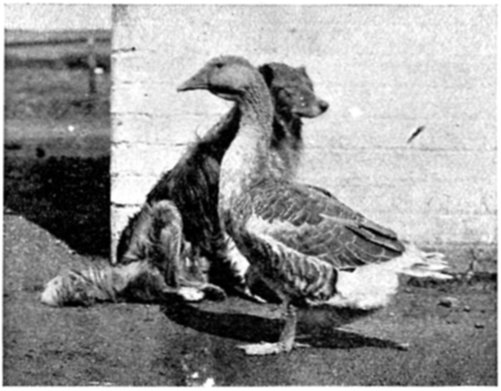
"THE INSEPARABLES."
One would have thought from stories that have come from Australia that dogs and kangaroos were inveterate enemies. In our illustration we seem, however, to have a direct refutation of such an erroneous belief. We have here five dogs and a kangaroo, the Australian placidly munching some carrot-heads. There has been no posing about this picture: the subjects settled themselves together in the most natural fashion.
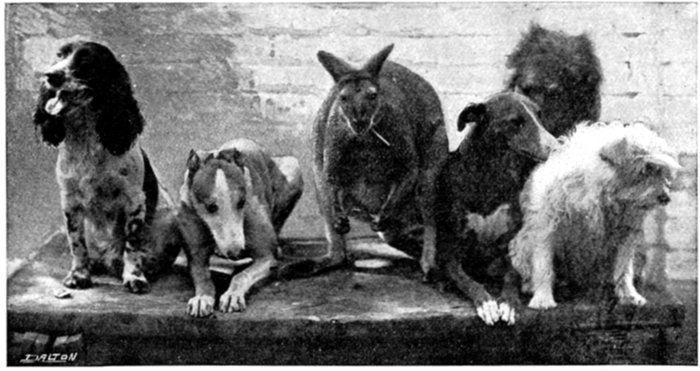
KANGAROO AND DOGS.
From a Photo. by A. J. Johnson.
The dog has not only proved himself to[Pg 43] be man's best friend, but he seems to show a great deal of affection for other animals with which he may happen to come in contact, either as occasional friends or more often as constant companions. We have here, for instance, a number of photos. showing the marvellous way in which animals fraternize as though they belonged to one family. Professor Lorenzo, of 5, Crowndale Road, N.W., has a most extraordinary collection of animals of all kinds. It includes dogs, cats, tame rabbits and wild rabbits, kangaroos, bantams, pigeons, cockatoos and parrots, and other pets. Among these we find a friendship which is of many years' standing. A spaniel and bantam are not often seen together, yet we have them here in thorough good-fellowship. The dog is a lovable creature, and the bantam knows it.
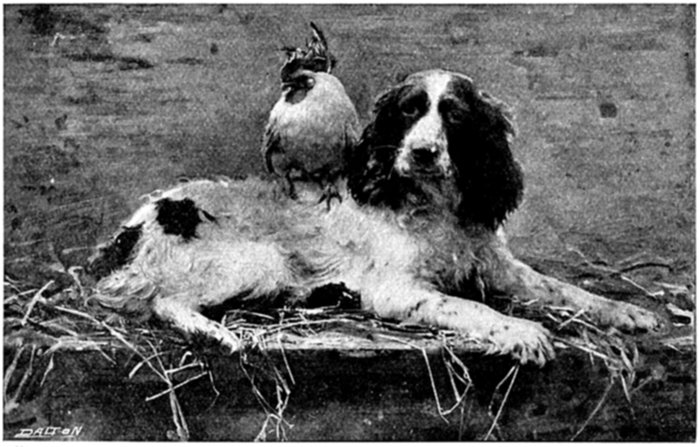
SPANIEL AND BANTAM.
From a Photo. by A. J. Johnson.
That very bantam, by the way, is the most cheeky fellow in creation. He does not believe in roosting in orthodox fashion; but chooses, in preference, some soft, velvety surface whereupon he can settle at ease and remain as long as he pleases. As shown in the next picture, a cat is another friend of his. Puss is almost crushed by the weight of this most unblushing intruder, yet she does not move, lest she should interfere with his comfort.
Cats and rabbits next come under notice. It may be interesting to quote a pretty story told by Miss Hamond, of Cheltenham. She says: "The following incident occurred under my own eyes during my residence in Spain. The province of Jaen, in sunny Andalusia, is rich in minerals, and the quaint old country town of Linares may be called the centre of the lead-mining district, where a goodly number of Englishmen have settled down with their wives and families and household gods, to make the best of life under conditions very different from those to which they were born.
"The children—as children do all the world over—used to keep a good many pets of different kinds, and in one household which I often visited—that of Mr. Romer, manager to one of the mining companies—their name was legion. One afternoon when I came in to tea there was a great commotion in the yard; obviously something important had happened. I knew at once that it must be a new kind of pet which somebody had given them.
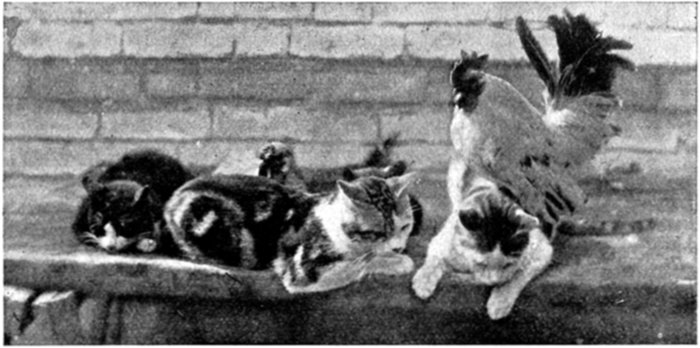
BANTAM AND CATS.
From a Photo. by A. J. Johnson
"'One of the miners has brought us some infant rabbits,' said Conchita, the second girl, hardly able to speak from ill-suppressed excitement. 'They are such babies, they can't feed themselves; do advise us. They will die if they are not fed soon.' A piece of rag dipped in milk seemed the only way out of the difficulty; the infants took to it[Pg 44] at once. Indeed, they soon began to nibble at the milk in the saucer. This problem was evidently solved, but the weather was very cold, and they had doubtless been accustomed to a warm fur cloak about them. So Conchita said, 'Might she take them to bed with her?'
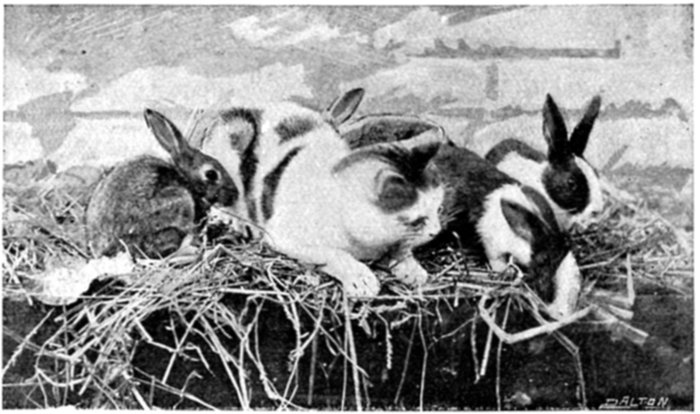
CATS AND RABBITS.
From a Photo. by A. J. Johnson.
"'Take them in to Molly, and see if he will adopt them,' I suggested, not intending to be taken at my word; but Conchita thought it an excellent idea, and acted upon it at once. We all followed her. (I must explain here that Molly was an immense tom-cat, fat and amiable; he lived in the schoolroom in a wadded basket, which just fitted him comfortably.) 'He will eat them up at once, of course,' remarked one of the bystanders, 'and perhaps it is just as well that he should.' But he didn't. That excellent cat allowed the mites to be stuffed into his lap; they at once nestled down and Molly went off to sleep again. Some of us looked in later in the evening to see what had happened. That excellent cat was sitting up washing the rabbits! It was the funniest thing in the world: he evidently remembered his own nursery days, and was doing his duty according to his lights by his strange charges. When he came to the long ears he paused, evidently mildly surprised at the innovation, but those rabbits had a thorough licking before they finally retired to rest. This sort of thing went on for a fortnight, the rabbits feeding out of Molly's saucer of bread and milk with him regularly, though it soon had to be changed for a soup-plate, and a bigger bed had to be provided. At the end of the fortnight the rabbits began to take so much exercise that it was difficult to keep them in one room, and there were so many ferocious cats in the neighbourhood that Conchita decided that the rabbits must be provided with a hutch of their own, and so the pretty little comedy came to an end. It never seemed to have occurred to the amiable Molly that they were good to eat. We used to bring friends—scoffers and unbelievers, who went out converted—to that schoolroom, and if Molly, the conscientious foster-father, were sleepy and indisposed to show off, we used to put a little butter on the infants' backs. This never failed to wake him up and induce him to perform their toilet with much energy."
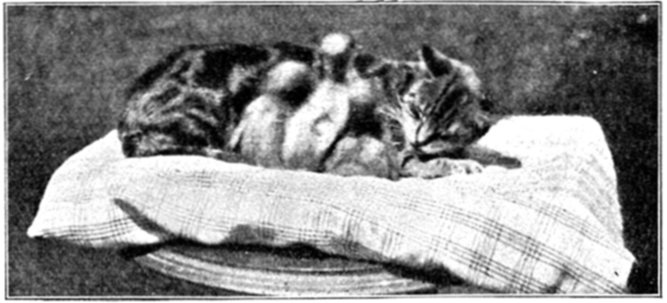
CAT AND DUCKLINGS.
One of our Australian friends, who prefers his name not to be published, but whose statements we have very good reasons to believe to be absolutely true, sends us the extraordinary photo. given below. "Away out in New Zealand," our kindly correspondent was able to take this curious picture. He tells the following story in connection with it: "Everyone knows how deficient in sense of maternal responsibility are mother ducks, and some ducklings of mine, appearing neglected, were put into a small box, with flannel, to add to their comfort. As one of our cats happened to be present, and inspected them with some interest, my wife said to her, 'Here are some kittens for you, Minna.' Without more ado Minna jumped into the box, and there and then adopted them as her very own. When they fell out of the box, she very tenderly picked them up in her mouth and replaced them. When they pecked at[Pg 45] her after the manner of their kind, she very gently reproached them with her paw, and seemed to try and tell them in her own language that she had never seen well-behaved kittens behave in that way before. Altogether they became a very happy family." Our correspondent says nothing of their ultimate fate, but we would imagine that when the ducklings first took to the water, the foster-mother's grief must have been extremely touching. "On another occasion, however," adds the owner of the ducklings, "I was standing, one evening, watching my Aylesburys waddling home to supper and bed after 'a happy day at the seaside,' when I noticed a little black-and-white duckling evidently not theirs, which to my surprise was with them. It stopped and looked at me as the others passed, and seemed to ask, 'What are you going to do with me?' I picked it up and called the old cat. Putting the duckling in a box, I said, 'There is another kitten for you, Minna.' Without a moment's hesitation she once more undertook her strange maternal duty, and took charge of the mite for some days, till she thought the little one old enough to face a hard and cruel world by itself. The duckling, which was called Kitty after its foster-mother, used to follow her about the garden and up and down the veranda stairs. At last, however, some boys—for there are cruel and thoughtless boys even in New Zealand—killed it with a stone."
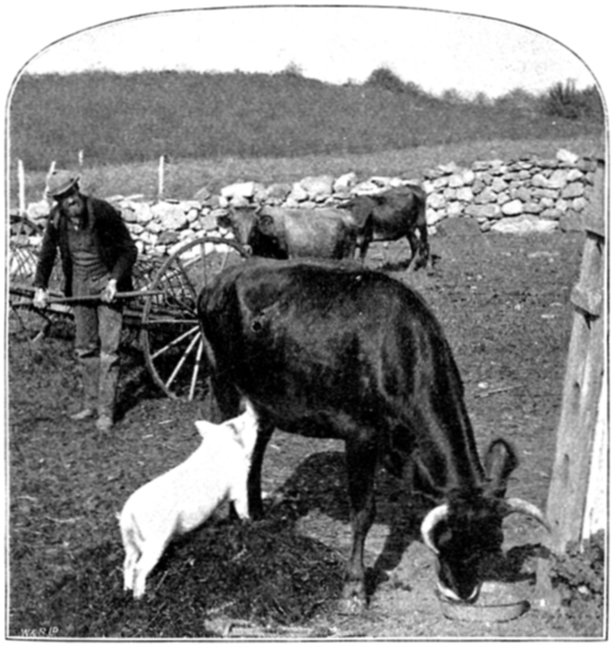
CAUGHT IN THE ACT. From a Copyright Stereo Photo, by Underwood & Underwood.
Of foster-mothers we have indeed some extraordinary instances. They show the truthful confidence with which little suckling animals will approach, and regard as their mother, beasts of quite a different species. We have here two instances of suckling pigs. In the one case we have an amusing picture, showing how the little porker was caught in the act, not only by the camera, but by the jolly farmer in the background. Stealing milk from a cow, whose yield in consequence fell noticeably short, was an injudicious thing to do, but it would not have mattered much had piggie not been caught. The second photo., which exemplifies a peculiar coincidence, was sent in by Mr. J. A. Hern, of Wayne, Nebraska, U.S.A. It is a striking confirmation of the preceding incident, with the difference that, instead of one thief only, we have three, and already well satisfied they look.
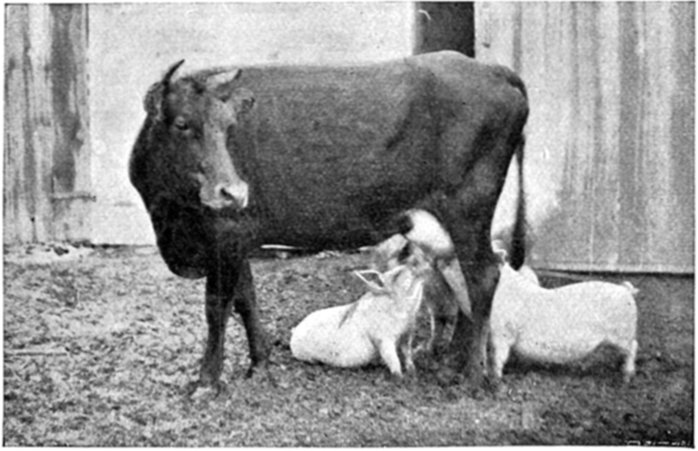
WHY JERSEY LILY GAVE NO MILK.
Another peculiar pair hail from the States. They live in Walsenburg, Colorado, the photo being sent in by Mr. Thomas Bunker, of that town. The mother ass in this case is[Pg 46] a most interesting animal. Her ordinary occupation is that of wood-carrier, as may be gathered from the load on her patient back; but besides having to suckle her own offspring, standing so gloomy, sad-eyed, and reproachful on the right, she also has to nurse the exuberant little lamb seen in the very act of robbing the little donkey foal of its natural right. The three animals belong to an old Mexican, and the lamb was reared entirely on the milk of the mother ass.
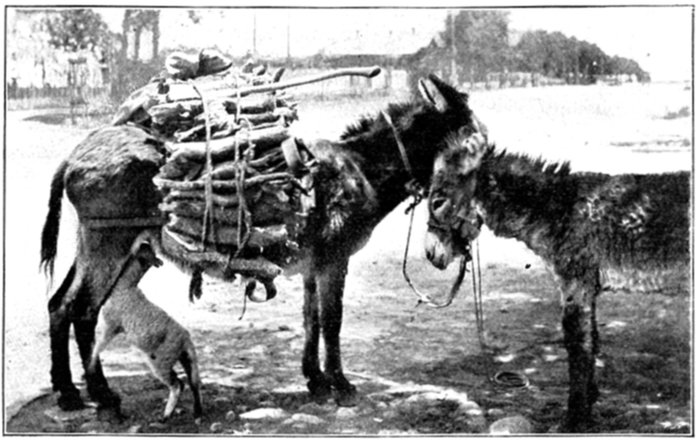
AN INFRINGEMENT OF FILIAL RIGHTS. From a Photo. by Thomas Bunker, Walsenburg, Colorado.
The pretty terrier shown in the next illustration was once the happy mother of an even happier family. Unfortunately, the puppies all died soon after birth, leaving the mother broken-hearted. For a long while the dog was inconsolable. It refused its food, moped, and grew thin. One day, however, a tiny, motherless kitten was given to it. The gift turned out to be the dog's salvation; it took the greatest care of the little creature, and woe betide the unfortunate stranger who ventured too near her precious charge. These pets belong to Miss J. Dresser, of Bexley Heath, Kent, and we are indebted to her kindness for this interesting photograph.
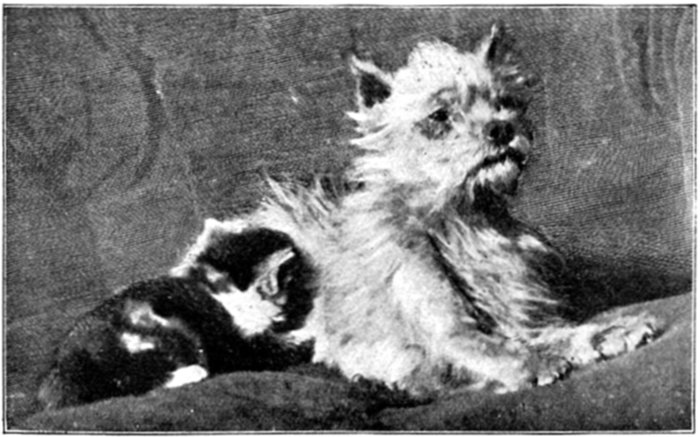
A DESPAIRING MOTHER'S SALVATION.
From a Photo. by A.R. Dresser.
Mr. Edward T. Williams, of Tedworth Square, Chelsea, owns a dove and a dog. There is nothing very fresh in this item of news; but wait a moment: that dog will carry the dove on his head for more than a quarter of a mile! They are the staunchest of friends, and as soon as the door of the cage is opened, out hurries the dove. It searches for the dog, if the latter should not already happen to be waiting for his rider in the immediate neighbourhood, and the dog seems to consider it as an absolute duty to carry his friend about in this comical fashion.
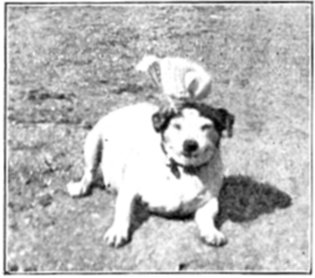
DOG AND DOVE.
Amongst other quaint and extraordinary friendships between animals of diverse species, one of the most interesting is that so frequently struck up between cats and horses. Pussie loves to make a fragrant, hay-scented stable her daily lounge and to nestle against the warm coat of the horse, who often takes his night's repose lying in his stall with the favoured Grimalkin snugly sleeping between his iron-shod hoofs. It was in Brook Mews, N., that the animal in question was "snapped"[Pg 47] amidst the eager and excited observations of the many bystanders, who quickly thronged to see the fun.
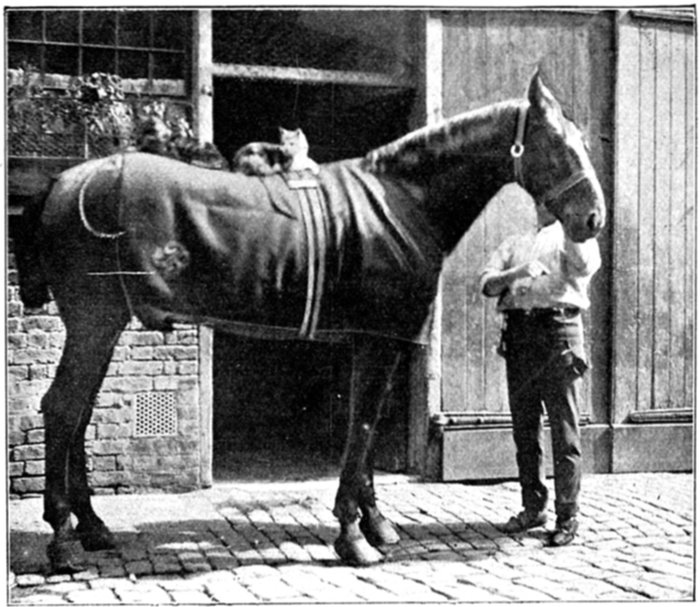
HORSE AND CAT.
From a Photo. by J. Marks.
The ladies who have risen to such an elevated position in life are mother and daughter. The sedate matron is fully alive to the importance of the occasion, and has adopted an easy, graceful pose; while the youngster, frisky and somewhat shy, was with difficulty persuaded to settle comfortably down. Mother cat is an animal of very self-contained and amiable disposition. She has contracted a fast friendship with two white rabbits belonging to the coachman's little boy. They live in a hutch in the stables, and are often allowed a little liberty for a frolic with puss, who chases them in and out of an empty stall.
From Covington, U.S.A., comes another remarkable instance. Mr. E. E. Cone, of that town, has a hen that displays a remarkably perverted maternal instinct. One of the neighbours has a cat with four small kittens. The cat would be faithful to her offspring were she not prevented by the following circumstance. This particular hen had been sitting for some time when she suddenly conceived the idea that the care of the kittens was more to her liking. She, therefore, promptly drove the mother cat away and took possession of the kits. No hen-mother ever watched over her brood with greater care than has this one over her mewing, squirming litter of kittens. The kittens offer no objection, and, with the exception of the old cat, who looks on at a safe distance, all is serene in this anomalous family. In our photograph the hen is shown endeavouring to cover the four kittens with her wings, but it does not seem a very easy task.
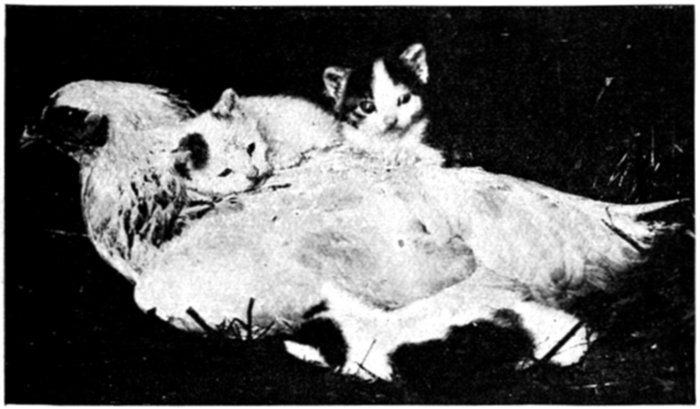
HEN AND KITTENS.
From a Photo. by W.J. Cone, Covington, Ill.
Extraordinary as this instance may seem, we have in a way a parallel to it. We see a cat taking under her charge some newly-born chicks in much the same way as the mother-hen did with the kittens. Mr. C. K. Eaton, of Melbourne House, Montpelier, Bristol, very kindly sends us the photograph.
It appears that, through some inexplicable reason of her own, the mother of the chicks deserted them almost immediately after being hatched, and consequently, there being no other means of rearing them, they were for some time kept in the kitchen, where, after a few days, they became fast friends with puss, who proved a[Pg 48] splendid substitute for the mother hen. She seldom left them, and when they were able to get about she, for a long time, followed them about the garden. The sight, needless to add, was an extremely pathetic one.
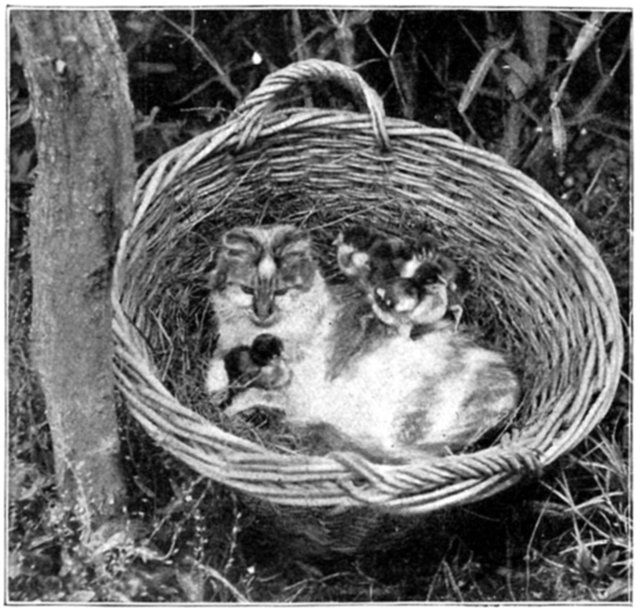
CAT AND CHICKS. From a Photo. by W. Perkins, Wickwar.
Miss Powell, of the Grove, Bishopton, Ripon, very kindly sends us the annexed amusing little photo, of a guinea-pig with a tame rat on its back. Now, who would ever have thought of such a peculiar freak of friendship? The pig is one of a pair, which Miss Powell has trained in harness. Brutus drags fair Venus about the room in a miniature coach. They are now being taught to sit in loving companionship at a tea-table. The rat is a tame one, and is an adept at various clever feats, in the imitation of which the guinea-pigs are nowhere.
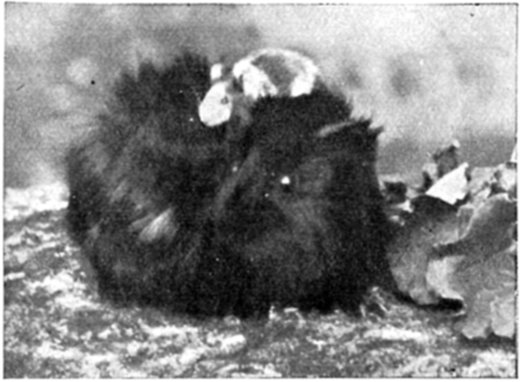
GUINEA-PIG AND RAT.
And now for the strangest instance in our collection. This astonishing photograph of a collie suckling a brood of young foxes was taken by Mr. Brown at a farm near Lanark. The little rascals were found in a den not a hundred miles from the farm. The farmer, with due solicitude, secured the little family, and took it to his own fire-side. But what could a respectable farmer do with a brood of young foxes? Now, it happened that only a day or two before this remarkable find, a fine collie owned by the farmer had become the happy mother of a family of her own. The little collies were speedily disposed of, and the young brood of foxes given to the mother and left to her kind solicitude. Wonderful to relate, the dog took very kindly to them, and actually suckled them for five or six weeks.
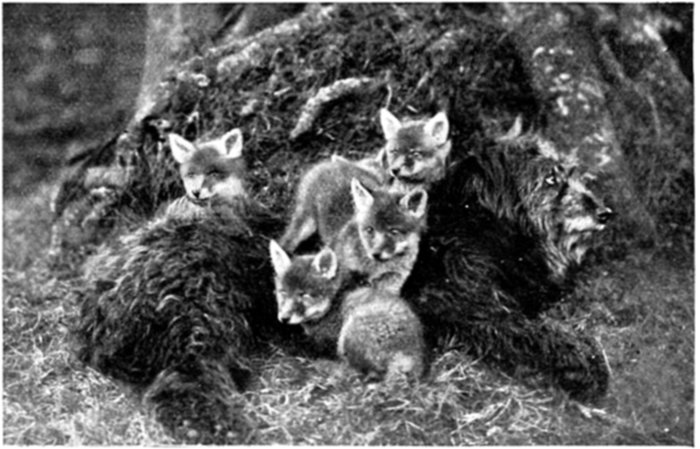
COLLIE AND FOXES.
From a Photo. by A. Brown & Co., Lanark.
By Grant Allen.

I did not sleep that night. Next morning, I rose very early from a restless bed with a dry, hot mouth and a general feeling that the solid earth had failed beneath me.
Still no news from Harold! It was cruel, I thought. My faith almost flagged. He was a man and should be brave. How could he run away and hide himself at such a time? Even if I set my own anxiety aside, just think to what serious misapprehension it laid him open!
I sent out for the morning papers. They were full of Harold. Rumours, rumours, rumours! Mr. Tillington had deliberately chosen to put himself in the wrong by disappearing mysteriously at the last moment. He had only himself to blame if the worst interpretation were put upon his action. But the police were on his track; Scotland Yard had "a clue": it was confidently expected an arrest would be made before evening at latest. As to details, authorities differed. The officials of the Great Western Railway at Paddington were convinced that Mr. Tillington had started, alone and undisguised, by the night express for Exeter. The South-Eastern inspectors at Charing Cross, on the other hand, were equally certain that he had slipped away with a false beard, in company with "his accomplice," Higginson, by the 8.15 p.m. to Paris. Everybody took it for granted, however, that he had left London.
Conjecture played with various ultimate destinations—Spain, Morocco, Sicily, the Argentine. In Italy, said the Chronicle, he might lurk for a while—he spoke Italian fluently, and could manage to put up at tiny osterie in out-of-the-way places seldom visited by Englishmen. He might try Albania, said the Morning Post, airing its exclusive "society" information: he had often hunted there, and might in turn be hunted. He would probably attempt to slink away to some remote spot in the Carpathians or the Balkans, said the Daily News, quite proud of its geography. Still, wherever he went, leaden-footed justice in this age, said the Times, must surely overtake him. The day of universal extradition had dawned; we had no more Alsatias: even the Argentine itself gives up its rogues—at last; not an asylum for crime remains in Europe, not a refuge in Asia, Africa, America, Australia, or the Pacific Islands.
I noted with a shudder of horror that all the papers alike took his guilt as certain. In spite of a few decent pretences at not prejudging an untried cause, they treated him already as the detected criminal, the fugitive from justice. I sat in my little sitting-room at the hotel in Jermyn Street, a limp rag, looking idly out of the window with swimming eyes, and waiting for Lady Georgina. It was early, too early, but—oh, why didn't she come! Unless somebody soon sympathized with me, my heart would break under this load of loneliness!
Presently, as I looked out on the sloppy morning street, I was vaguely aware through the mist that floated before my dry eyes (for tears were denied me) of a very grand carriage driving up to the doorway—the porch with the four wooden Ionic pillars. I took no heed of it. I was too heart-sick for observation. My life was wrecked, and Harold's with it. Yet, dimly through the mist, I became conscious after a while that the carriage was that of an Indian prince; I could see the black faces, the white turbans, the gold brocades of the attendants in the dickey. Then it came home to me with a pang that this was the Maharajah.
It was kindly meant; yet after all that had been insinuated in court the day before, I was by no means over-pleased that his dusky Highness should come to call upon me. Walls have eyes and ears. Reporters were hanging about all over London, eager to distinguish themselves by successful eavesdropping. They would note, with brisk innuendoes after their kind, how "the Maharajah of Moozuffernuggar called early in the day on Miss Lois Cayley, with whom he remained for at least half an hour in close consultation." I had half a mind to send down a message that I could not see him. My face still burned with the undeserved shame of the cross-eyed Q.C.'s unspeakable suggestions.
Before I could make my mind up, however, I saw to my surprise that the Maharajah did not propose to come in himself. He leaned back in his place with his lordly Eastern air, and waited, looking down on the gapers in the street, while one of the two gorgeous attendants in the dickey descended obsequiously to receive his orders. The man was dressed as usual in rich Oriental stuffs, and wore his full white turban swathed in folds round his head. I could not see his features. He bent forward respectfully with Oriental suppleness to take his Highness's orders. Then, receiving a card and bowing low, he entered the porch with the wooden Ionic pillars, and disappeared within, while the Maharajah folded his hands and seemed to resign himself to a temporary Nirvana.
A minute later, a knock sounded on my door. "Come in!" I said, faintly; and the messenger entered.

"THE MESSENGER ENTERED."
I turned and faced him. The blood rushed to my cheek. "Harold!" I cried, darting forward. My joy overcame me. He folded me in his arms. I allowed him, unreproved. For the first time he kissed me. I did not shrink from it.
Then I stood away a little and gazed at him. Even at that crucial moment of doubt and fear, I could not help noticing how admirably he made up as a handsome young Rajput. Three years earlier, at Schlangenbad, I remembered he had struck me as strangely Oriental-looking: he had the features of a high-born Indian gentleman, without the complexion. His large, poetical eyes, his regular, oval face, his even teeth, his mouth and moustache, all vaguely recalled the highest type of the Eastern temperament. Now, he had blackened his face and hands with some permanent stain—Indian ink, I learned later—and the resemblance to a Rajput chief was positively startling. In his gold brocade and ample white turban, no passer-by, I felt sure, would ever have dreamt of doubting him.
"Then you knew me at once?" he said, holding my face between his hands. "That's bad, darling! I flattered myself I had transformed my face into the complete Indian."
"Love has sharp eyes," I answered. "It can see through brick walls. But the disguise is perfect. No one else would detect you."
"Love is blind, I thought."
"Not where it ought to see. There, it pierces everything. I knew you instantly, Harold. But all London, I am sure, would pass you by, unknown. You are absolute Orient."
"That's well; for all London is looking for me," he answered, bitterly. "The streets bristle with detectives. Southminster's knaveries have won the day. So I have tried this disguise. Otherwise, I should have been arrested the moment the jury brought in their verdict."
"And why were you not?" I asked, drawing back. "Oh, Harold, I trust you; but why did you disappear and make all the world believe you admitted yourself guilty?"
He opened his arms. "Can't you guess?" he cried, holding them out to me.
I nestled in them once more; but I answered through my tears—I had found tears now—"No, Harold; it baffles me."
"You remember what you promised me?" he murmured, leaning over me and clasping me. "If ever I were poor, friendless, hunted—you would marry me. Now the opportunity has come when we can both prove ourselves. To-day, except you and dear Georgey, I haven't a friend in the world. Everyone else has turned against me. Southminster holds the field. I am a suspected forger; in a very few days I shall doubtless be a convicted felon. Unjustly, as you know; yet still—we must face it—a convicted felon. So I have come to claim you. I have come to ask you now, in this moment of despair, will you keep your promise?"
I lifted my face to his. He bent over it trembling. I whispered the words in his ear. "Yes, Harold, I will keep it. I have always loved you. And now I will marry you."
"I knew you would!" he cried, and pressed me to his bosom.
We sat for some minutes, holding each other's hands, and saying nothing; we were too full of thought for words. Then suddenly, Harold roused himself. "We must make haste, darling," he cried. "We are keeping Partab outside, and every minute is precious, every minute's delay dangerous. We ought to go down at once. Partab's carriage is waiting at the door for us."
"Go down?" I exclaimed, clinging to him. "How? Why? I don't understand. What is your programme?"
"Ah, I forgot I hadn't explained to you! Listen here, dearest—quick; I can waste no words over it. I said just now I had no friends in the world but you and Georgey. That's not true, for dear old Partab has stuck to me nobly. When all my English friends fell away, the Rajput was true to me. He arranged all this; it was his own idea; he foresaw what was coming. He urged me yesterday, just before the verdict (when he saw my acquaintances beginning to look askance), to slip quietly out of court, and make my way by unobtrusive roads to his house in Curzon Street. There, he darkened my face like his, and converted me to Hinduism. I don't suppose the disguise will serve me for more than a day or two; but it will last long enough for us to get safely away to Scotland."
"Scotland?" I murmured. "Then you mean to try a Scotch marriage?"
"It is the only thing possible. We must be married to-day, and in England, of course, we cannot do it. We would have to be called in church, or else to procure a license, either of which would involve disclosure of my identity. Besides, even the license would keep us waiting about for a day or two. In Scotland, on the other hand, we can be married at once. Partab's carriage is below, to take you to Euston. He is staunch as steel, dear fellow. Do you consent to go with me?"
My faculty for promptly making up such mind as I possess stood me once more in good stead. "Implicitly," I answered. "Dear Harold, this calamity has its happy side—for without it, much as I love you, I could never have brought myself to marry you!"
"One moment," he cried. "Before you go, recollect, this step is irrevocable. You will marry a man who may be torn from you this evening, and from whom fourteen years of prison may separate you."
"I know it," I cried, through my tears. "But—I shall be showing my confidence in you, my love for you."
He kissed me once more, fervently. "This makes amends for all," he cried. "Lois, to have won such a woman as you, I would go through it all a thousand times over. It was for this, and for this alone, that I hid myself last night. I wanted to give you the chance of showing me how much, how truly you loved me."
"And after we are married?" I asked, trembling.
"I shall give myself up at once to the police in Edinburgh."
I clung to him wistfully. My heart half urged me to urge him to escape. But I knew that was wrong. "Give yourself up,[Pg 52] then," I said, sobbing. "It is a brave man's place. You must stand your trial: and, come what will, I will strive to bear it with you."
"I knew you would," he cried. "I was not mistaken in you."
We embraced again, just once. It was little enough after those years of waiting.
"Now, come!" he cried. "Let us go."
I drew back. "Not with you, dearest," I whispered. "Not in the Maharajah's carriage. You must start by yourself. I will follow you at once, to Euston, in a hansom."
He saw I was right. It would avoid suspicion, and it would prevent more scandal. He withdrew without a word. "We meet," I said, "at ten, at Euston."
I did not even wait to wash the tears from my eyes. All red as they were, I put on my hat and my little brown travelling jacket. I don't think I so much as glanced once at the glass. The seconds were precious. I saw the Maharajah drive away, with Harold in the dickey, arms crossed, imperturbable, Orientally silent. He looked the very counterpart of the Rajput by his side. Then I descended the stairs and walked out boldly. As I passed through the hall, the servants and the visitors stared at me and whispered. They spoke with nods and liftings of the eyebrows. I was aware that that morning I had achieved notoriety.
At Piccadilly Circus, I jumped of a sudden into a passing hansom. "Euston!" I cried, as I mounted the step. "Drive quick! I have no time to spare." And, as the man drove off, I saw, by a convulsive dart of someone across the road, that I had given the slip to a disappointed reporter.
At the station I took a first-class ticket for Edinburgh. On the platform, the Maharajah and his attendants were waiting. He lifted his hat to me, though otherwise he took no overt notice. But I saw his keen eyes follow me down the train. Harold, in his Oriental dress, pretended not to observe me. One or two porters, and a few curious travellers, cast inquiring eyes on the Eastern prince, and made remarks about him to one another. "That's the chap as was up yesterday in the Ashurst will kise!" said one lounger to his neighbour. But nobody seemed to look at Harold; his subordinate position secured him from curiosity. The Maharajah had always two Eastern servants, gorgeously dressed, in attendance; he had been a well-known figure in London society, and at Lord's and the Oval, for two or three seasons.
"Bloomin' fine cricketer!" one porter observed to his mate as he passed.
"Yuss; not so dusty for a nigger," the other man replied. "Fust-rite bowler; but, Lord, he can't 'old a candle to good old Ranji."
As for myself, nobody seemed to recognise me. I set this fact down to the fortunate circumstance that the evening papers had published rough wood-cuts which professed to be my portrait, and which naturally led the public to look out for a brazen-faced, raw-boned, hard-featured termagant.
I took my seat in a ladies' compartment by myself. As the train was about to start, Harold strolled up as if casually for a moment. "You think it better so?" he queried, without moving his lips or seeming to look at me.
"Decidedly," I answered. "Go back to Partab. Don't come near me again till we get to Edinburgh. It is dangerous still. The police may at any moment hear we have started and stop us half-way; and now that we have once committed ourselves to this plan, it would be fatal to be interrupted before we have got married."
"You are right," he cried; "Lois, you are always right, somehow."
I wished I could think so myself; but 'twas with serious misgivings that I felt the train roll out of the station.
Oh, that long journey north, alone, in a ladies' compartment—with the feeling that Harold was so near, yet so unapproachable: it was an endless agony. He had the Maharajah, who loved and admired him, to keep him from brooding; but I, left alone, and confined with my own fears, conjured up before my eyes every possible misfortune that Heaven could send us. I saw clearly now that if we failed in our purpose this journey would be taken by everyone for a flight, and would deepen the suspicion under which we both laboured. It would make me still more obviously a conspirator with Harold.
Whatever happened, we must strain every nerve to reach Scotland in safety, and then to get married, in order that Harold might immediately surrender himself.
At York, I noticed with a thrill of terror that a man in plain clothes, with the obtrusively unobtrusive air of a detective, looked carefully though casually into every carriage. I felt sure he was a spy, because of his marked outer jauntiness of demeanour, which hardly masked an underlying hang-dog expression of scrutiny. When he reached my place, he took a long, careless stare at me—[Pg 53]a seemingly careless stare, which was yet brim-full of the keenest observation. Then he paced slowly along the line of carriages, with a glance at each, till he arrived just opposite the Maharajah's compartment. There he stared hard once more. The Maharajah descended; so did Harold and the Hindu attendant, who was dressed just like him. The man I took for a detective indulged in a frank, long gaze at the unconscious Indian prince, but cast only a hasty eye on the two apparent followers. That touch of revelation relieved my mind a little. I felt convinced the police were watching the Maharajah and myself, as suspicious persons connected with the case; but they had not yet guessed that Harold had disguised himself as one of the two invariable Rajput servants.

"HE TOOK A LONG, CARELESS STARE AT ME."
We steamed on northward. At Newcastle, the same detective strolled, with his hands in his pockets, along the train once more, and puffed a cigar with the nonchalant air of a sporting gentleman. But I was certain now, from the studious unconcern he was anxious to exhibit, that he must be a spy upon us. He overdid his mood of careless observation. It was too obvious an assumption. Precisely the same thing happened again when we pulled up at Berwick. I knew now that we were watched. It would be impossible for us to get married at Edinburgh if we were thus closely pursued. There was but one chance open; we must leave the train abruptly at the first Scotch stopping station.
The detective knew we were booked through for Edinburgh. So much I could tell, because I saw him make inquiries of the ticket examiner at York, and again at Berwick, and because the ticket-examiner thereupon entered a mental note of the fact as he punched my ticket each time: "Oh, Edinburgh, miss? All right"; and then stared at me suspiciously. I could tell he had heard of the Ashurst will case. He also lingered long about the Maharajah's compartment, and then went back to confer with the detective. Thus, putting two and two together, as a woman will, I came to the conclusion that the spy did not expect us to leave the train before we reached Edinburgh. That told in our favour. Most men trust much to just such vague expectations. They form a theory, and then neglect the adverse chances. You can only get the better of a skilled detective by taking him thus, psychologically and humanly.
By this time, I confess, I felt almost like a criminal. Never in my life had danger loomed so near—not even when we returned with the Arabs from the oasis. For then[Pg 54] we feared for our lives alone; now, we feared for our honour.
I drew a card from my case before we left Berwick station, and scribbled a few hasty words on it in German. "We are watched. A detective! If we run through to Edinburgh, we shall doubtless be arrested or at least impeded. This train will stop at Dunbar for one minute. Just before it leaves again, get out as quietly as you can—at the last moment. I will also get out and join you. Let Partab go on; it will excite less attention. The scheme I suggest is the only safe plan. If you agree, as soon as we have well started from Berwick, shake your handkerchief unobtrusively out of your carriage window."

"I BECKONED A PORTER."
I beckoned a porter noiselessly without one word. The detective was now strolling along the fore-part of the train, with his back turned towards me, peering as he went into all the windows. I gave the porter a shilling. "Take this to a black gentleman in the next carriage but one," I said, in a confidential whisper. The porter touched his hat, nodded, smiled, and took it.
Would Harold see the necessity for acting on my advice?—I wondered. I gazed out along the train as soon as we had got well clear of Berwick. A minute—two minutes—three minutes passed; and still no handkerchief. I began to despair. He was debating, no doubt. If he refused, all was lost, and we were disgraced for ever.
At last, after long waiting, as I stared still along the whizzing line, with the smoke in my eyes, and the dust half blinding me, I saw, to my intense relief, a handkerchief flutter. It fluttered once, not markedly, then a black hand withdrew it. Only just in time, for even as it disappeared, the detective's head thrust itself out of a farther window. He was not looking for anything in particular, as far as I could tell—just observing the signals. But it gave me a strange thrill to think even now we were so nearly defeated.
My next trouble was—would the train draw up at Dunbar? The 10 a.m. from Euston is not set down to stop there in Bradshaw, for no passengers are booked to or from the station by the day express; but I remembered from of old when I lived at Edinburgh, that it used always to wait about a minute for some engine-driver's purpose. This doubt filled me with fresh fear; did it draw up there still?—they have accelerated the service so much of late years, and abolished so many old accustomed stoppages. I counted the familiar stations with my breath held back. They seemed so much farther apart than usual. Reston—Grant's House—Cockburnspath—Innerwick.
The next was Dunbar. If we rolled past that, then all was lost. We could never get married. I trembled and hugged myself.
The engine screamed. Did that mean she was running through? Oh, how I wished I had learned the interpretation of the signals!
Then gradually, gently, we began to slow. Were we slowing to pass the station only? No; with a jolt she drew up. My heart gave a bound as I read the word "Dunbar" on the station notice-board.
I rose and waited, with my fingers on the door. Happily it had one of those new-fashioned slip-latches which open from inside. No need to betray myself prematurely to the detective by a hand displayed on the outer handle. I glanced out at him cautiously. His head was thrust through his window, and his sloping shoulders revealed the spy, but he was looking the other way—observing the signals, doubtless, to discover why we stopped at a place not mentioned in Bradshaw.
Harold's face just showed from another window close by. Too soon or too late might either of them be fatal. He glanced inquiry at me. I nodded back, "Now!" The train gave its first jerk, a faint backward jerk, indicative of the nascent intention of starting. As it braced itself to go on, I jumped out; so did Harold. We faced one another on the platform without a word. "Stand away there!" the station-master cried, in an angry voice, and waved his white flag. The detective, still absorbed on the signals, never once looked back. One second later, we were safe at Dunbar, and he was speeding away by the express for Edinburgh!
It gave us a breathing space of about an hour.
For half a minute I could not speak. My heart was in my mouth. I hardly even dared to look at Harold. Then the station-master stalked up to us with a threatening manner. "You can't get out here," he said, crustily, in a gruff Scotch voice. "This train is not timed to set down before Edinburgh."

"'YOU CAN'T GET OUT HERE,' HE SAID, CRUSTILY."
"We have got out," I answered, taking it upon me to speak for my fellow-culprit, the Hindu—as he was to all seeming. "The logic of facts is with us. We were booked through to Edinburgh, but we wanted to stop at Dunbar; and as the train happened to pull up, we thought we needn't waste time by going on all that way and then coming back again."
"Ye should have changed at Berwick," the station-master said, still gruffly, "and come on by the slow train." I could see his careful Scotch soul was vexed (incidentally) at our extravagance in paying the extra fare to Edinburgh and back again.
In spite of agitation, I managed to summon up one of my sweetest smiles—a smile that ere now had melted the hearts of rickshaw coolies and of French douaniers. He thawed before it visibly. "Time was important to us," I said—oh, he guessed not how important; "and besides, you know, it is so good for the company!"
"That's true," he answered, mollified. He could not tilt against the interests of the North British shareholders. "But how about yer luggage? It'll have gone on to Edinburgh, I'm thinking."
"We have no luggage," I answered, boldly.
He stared at us both, puckered his brow a moment, and then burst out laughing. "Oh, ay, I see," he answered, with a comic air of amusement. "Well, well, it's none of my[Pg 56] business, no doubt, and I will not interfere with ye; though why a lady like you——" He glanced curiously at Harold.
I saw he had guessed right, and thought it best to throw myself unreservedly on his mercy. Time was indeed important. I glanced at the station clock. It was not very far from the stroke of six, and we must manage to get married before the detective could miss us at Edinburgh, where he was due at 6.30.
So I smiled once more, that heart-softening smile. "We have each our own fancies," I said, blushing—and, indeed (such is the pride of race among women), I felt myself blush in earnest at the bare idea that I was marrying a black man, in spite of our good Maharajah's kindness. "He is a gentleman, and a man of education and culture." I thought that recommendation ought to tell with a Scotchman. "We are in sore straits now, but our case is a just one. Can you tell me who in this place is most likely to sympathize—most likely to marry us?"
He looked at me—and surrendered at discretion. "I should think anybody would marry ye who saw yer pretty face and heard yer sweet voice," he answered. "But, perhaps, ye'd better present yerself to Mr. Schoolcraft, the U.P. minister at Little Kirkton. He was ay soft-hearted."
"How far from here?" I asked.
"About two miles," he answered.
"Can we get a trap?"
"Oh, ay, there's machines always waiting at the station."

"WE TOLD OUR TALE."
We interviewed a "machine," and drove out to Little Kirkton. There, we told our tale in the fewest words possible to the obliging and good-natured U.P. minister. He looked, as the station-master had said, "soft-hearted"; but he dashed our hopes to the ground at once by telling us candidly that unless we had had our residence in Scotland for twenty-one days immediately preceding the marriage, it would not be legal. "If you were Scotch," he added, "I could go through the ceremony at once, of course; and then you could apply to the sheriff to-night for leave to register the marriage in proper form afterward: but as one of you is English, and the other I judge"—he smiled and glanced towards Harold—"an Indian-born subject of Her Majesty, it would be impossible for me to do it: the ceremony would be invalid, under Lord Brougham's Act, without previous residence."
This was a terrible blow. I looked away appealingly. "Harold," I cried in despair, "do you think we could manage to hide ourselves safely anywhere in Scotland for twenty-one days?"
His face fell. "How could I escape notice? All the world is hunting for me. And then, the scandal! No matter where you stopped—however far from me—no,[Pg 57] Lois, darling, I could never expose you to it."
The minister glanced from one to the other of us, puzzled. "Harold?" he said, turning over the word on his tongue. "Harold? That doesn't sound like an Indian name, does it? And——" he hesitated, "you speak wonderful English!"
I saw the safest plan was to make a clean breast of it. He looked the sort of man one could trust on an emergency. "You have heard of the Ashurst will case?" I said, blurting it out suddenly.
"I have seen something about it in the newspapers; yes. But it did not interest me: I have not followed it."
I told him the whole truth; the case against us—the facts as we knew them. Then I added, slowly, "This is Mr. Harold Tillington, whom they accuse of forgery. Does he look like a forger? I want to marry him before he is tried. It is the only way by which I can prove my implicit trust in him. As soon as we are married, he will give himself up at once to the police—if you wish it, before your eyes. But married we must be. Can't you manage it somehow?"
My pleading voice touched him. "Harold Tillington?" he murmured. "I know of his forebears. Lady Guinevere Tillington's son, is it not? Then you must be Younger of Gledcliffe." For Scotland is a village: everyone in it seems to have heard of every other.
"What does he mean?" I asked. "Younger of Gledcliffe?" I remembered now that the phrase had occurred in Mr. Ashurst's will, though I never understood it.
"A Scotch fashion," Harold answered. "The heir to a laird is called Younger of so-and-so. My father has a small estate of that name in Dumfriesshire; a very small estate: I was born and brought up there."
"Then you are a Scotchman?" the minister asked.
"I have never counted myself so," Harold answered, frankly: "except by remote descent. We are trebly of the female line at Gledcliffe; still, I am no doubt more or less Scotch by domicile."
"Younger of Gledcliffe! Oh, yes, that ought certainly to be quite sufficient for our purpose. But then—the lady?"
"She is unmitigatedly English," Harold admitted, in a gloomy voice.
"Not quite," I answered. "I lived four years in Edinburgh. And I spent my holidays there while I was at Girton. I keep my boxes still at my old rooms in Maitland Street."
"Oh, that will do," the minister answered, quite relieved; for it was clear that our anxiety and the touch of romance in our tale had enlisted him in our favour. "Indeed, now I come to think of it, it suffices for the Act if one only of the parties is domiciled in Scotland. Still, I can do nothing save marry you now by religious service in the presence of my servants—which constitutes what we call an ecclesiastical marriage—it becomes legal if afterwards registered; and then you must apply to the sheriff for a warrant to register it. But I will do what I can; later on, if you like, you can be remarried by the rites of your own Church in England."
"Are you quite sure our Scotch domicile is good enough in law?" Harold asked, still doubtful.
"I can turn it up, if you wish. I have a legal hand-book. Before Lord Brougham's Act, no formalities were necessary. But the Act was passed to prevent Gretna Green marriages. The usual phrase is that such a marriage does not hold good unless one or other of the parties either has had his or her usual residence in Scotland, or else has lived there for twenty-one days immediately preceding the date of the marriage. If you like, I will wait to consult the authorities."
"No, thank you," I cried. "There is no time to lose. Marry us first, and look it up afterwards. 'One or other' will do, it seems. Mr. Tillington is Scotch enough, I am sure; we will rest our claim upon that. Even if the marriage turns out invalid, we only remain where we were. This is a preliminary ceremony to prove good faith, and to bind us to one another. We can satisfy the law, if need be, when we return to England."
The minister called in his wife and servants, and explained to them briefly. He exhorted us and prayed. We gave our solemn consent in legal form before five witnesses. Then he pronounced us duly married. In a quarter of an hour more, we had made declaration to that effect before the sheriff, and were formally affirmed to be man and wife before the law of Great Britain. I asked if it would hold in England as well.
"You couldn't be firmer married," the sheriff said, with decision, "by the Archbishop of Canterbury in Westminster Abbey."
Harold turned to the minister. "Will you send for the police?" he said, calmly. "I wish to inform them that I am the man for whom they are looking in the Ashurst will case."
Our own cabman went to fetch them. It[Pg 58] was a terrible moment. But Harold sat in the sheriffs study and waited, as if nothing unusual were happening. He talked freely but quietly. Never in my life had I felt so proud of him.
At last the police came, much inflated with the dignity of so great a capture, and took down our statement. "Do you give yourself in charge on a confession of forgery?" the superintendent asked, as Harold ended.
"Certainly not," Harold answered. "I have not committed forgery. But I do not wish to skulk or hide myself. I understand a warrant is out against me in London. I have come to Scotland, hurriedly, for the sake of getting married, not to escape apprehension. I am here, openly, under my own name. I tell you the facts; 'tis for you to decide: if you choose, you can arrest me."
The superintendent conferred for some time in another room with the sheriff. Then he returned to the study. "Very well, sir," he said, in a respectful tone, "I arrest you."
So that was the beginning of our married life. More than ever, I felt sure I could trust in Harold.
The police decided, after hearing by telegram from London, that we must go up at once by the night express, which they stopped for the purpose. They were forced to divide us. I took the sleeping car; Harold travelled with two constables in an ordinary carriage. Strange to say, notwithstanding all this, so great was our relief from the tension of our flight, that we both slept soundly.
Next morning we arrived in London, Harold guarded. The police had arranged that the case should come up at Bow Street that afternoon. It was not an ideal honeymoon, and yet, I was somehow happy.
At Euston, they took him away from me. And still, I hardly cried. All the way up in the train, whenever I was awake, an idea had been haunting me—a possible clue to this trickery of Lord Southminster's. Petty details cropped up and fell into their places. I began to unravel it all now. I had an inkling of a plan to set Harold right again.
The will we had proved——but I must not anticipate.
When we parted, Harold kissed me on the forehead, and murmured rather sadly, "Now I suppose it's all up. Lois, I must go. These rogues have been too much for us."

"I HAVE FOUND A CLUE."
"Not a bit of it," I answered, new hope growing stronger and stronger within me. "I see a way out. I have found a clue. I believe, dear Harold, the right will still be vindicated."
And red-eyed as I was, I jumped into a hansom, and called to the cabman to drive at once to Lady Georgina's.
By Alfred I. Burkholder.
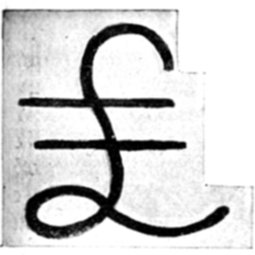
Logs belonging to various individuals and firms in the lumber industry of the North Western United States are identified and separated in a striking fashion. To illustrate this it will be necessary to outline briefly the routine of work connected with the great lumbering industry of the regions mentioned. Logging camps are established in the heart of a forest. Where no railroads have been extended to the vicinity of the camps, roads are cut to the nearest river, which is the highway by which the logs are taken in the spring to saw-mills, where they are manufactured into shingles, lath, boards, timbers, and planks. Therefore, proximity to a river is necessarily taken into consideration when a camp is located.
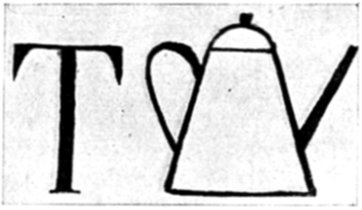
After the trees are sawed down by men engaged especially for this duty, they are sawed into log lengths and hauled, perhaps several miles, to the bank of the river. Some of the camps contain as many as 300 or 400 men, and this force is kept busy during the entire winter cutting down trees, sawing them into logs, and hauling them to the river. Here they are placed in huge piles, and it is at this time that the log-mark of the owner is placed upon them by an individual known as the "scaler," whose duty it also is to measure the diameter of each log and keep a record of it.
In this article we show a few of these curious log-marks—odd artistic inventions of the untrained minds of the lumber-camps. There is no attempt at uniformity in ideas. Anything that has the least bit of distinctiveness about it is sufficient for the purpose, which explains the presence of pound-marks, tea-pots, frogs, babies, yokes, division signs, and wheel-barrows in the illustrations for this article.
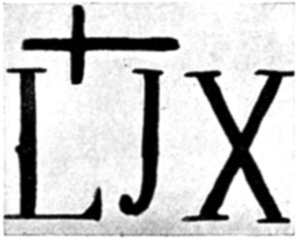
The instrument with which the "scaler" places the mark upon a log is in the shape of a sledge-hammer, the back of the hammer portion having upon it a device similar to the log-mark of the man by whom he is employed and to whom the logs belong. The log-mark itself is raised to a height of about 1½in. or 2in. above the surrounding surface of steel, and when the sawed end of a log is struck with it, the mark of the owner is punched into the end of the log to a depth which prevents its obliteration, unless the whole end of the log is sawed off and removed. Crude designs, differing from the regular log-mark, are sometimes cut into the bark of the log to assist in more readily identifying the owner. Copies of log-marks and cattle-brands are, as provided by law, placed on a file in the office of the county recorder of deeds in the county in which the cattle owner or lumberman operates.
For greater convenience the ice in the river is thickly covered with the logs as spring approaches. When the break-up of ice in the river occurs, and the stream is swollen by the melting of snow and the early spring rains, what is called the log "drive" commences. In some portions of the lumbering regions the disappearance of the forests has left the saw-mills further and further from the product without which they cannot operate, and the logs have to be floated great distances. Thus, a "drive" of 100 or 200 miles is nothing unusual, and on the Mississippi river logs are frequently taken as much as 300 miles.
On one river perhaps a dozen or more lumbering firms, having no connection with each other, are operating, and when spring comes all their logs are rolled into the stream, to soon become so mixed up that the novice naturally becomes of the opinion that their separation is an impossibility. The work during a log "drive" is the hardest and most dangerous connected with the lumbering industry.
The men are required to be up long before daylight, so that they may eat their breakfasts and walk to the river, perhaps several miles distant, arriving there at daylight to begin the work of the day. Refreshments are taken to them twice during the day, at about ten o'clock in the forenoon, and again at two o'clock in the afternoon. They work until it becomes dark, when they walk back to their camps to procure their[Pg 60] suppers and much-needed rest. The log drivers are required to keep the logs floating in the streams. In rainy or cold weather, such as is frequently experienced in the lumbering regions, their work is very arduous and debilitating. It is of the utmost importance that the work of floating the logs out be pushed while there is sufficient water in the streams, many of which become nothing more than creeks later in the season, when dry weather sets in.
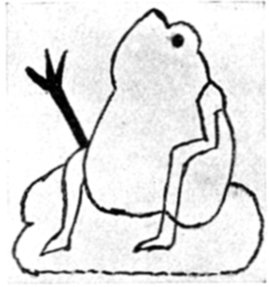
The force of the current behind the huge mass of logs may force hundreds of logs to a lodgment on the bank when curves in the stream are reached, and then the men are compelled to work, perhaps waist deep, in the water in order to clear the stranded logs and once more get them afloat. The foremost logs are especially looked after and kept on the move, for should they become lodged the obstruction thus formed would speedily cause a log "jam," the thing particularly to be dreaded by the drivers.

Notwithstanding the extreme care and precautions, jams occasionally occur. Then the logs are piled high in the air, the weight of the mass sinking the logs to the bottom of the river, and extending from bank to bank of the stream, forming an almost solid wedge, which constantly becomes larger and more compact. It is nothing unusual for the logs to be piled to a height of 100ft. or 150ft., and extending for several miles up the river.
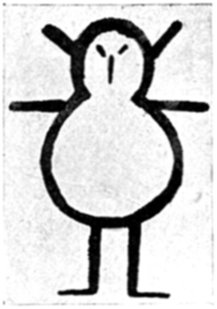
A jam in the St. Croix river, in Wisconsin and Minnesota, in the spring of 1892, was about six miles in length. Another one that formed in the Chippewa river, in the former State, in 1886, extended ten miles. This river was also the scene, twenty years ago, of perhaps the greatest log jam in history. It extended for a distance of twenty-five miles, and was estimated to contain over 150,000,000ft. of lumber.
It sometimes requires several days' hard labour to "break" a jam. Not infrequently a single log may be the cause of the whole difficulty, and the removal of this "key" log is naturally a dangerous duty. It may be lodged so tightly by the great mass of logs wedged against it by the swift current of the river, that its removal is accomplished only after chopping it in two with an axe. The man who does this takes his life in his hands, for the removal of the "key" log almost instantly releases the towering mass of logs behind it and the greatest agility is required by the daring man to reach a place of safety ere the released mass goes churning onward, forced to almost lightning speed by the irresistible power behind it.
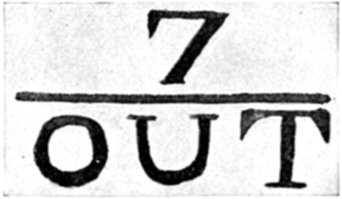
The log drivers wear heavy boots, from the soles of which project sharpened steel or iron spikes, placed thickly. With these, it in time becomes an easy matter for the men to run about on the floating and twisting logs with as much confidence as that exhibited by the dweller in a city when striding along a pavement. Accidents, however, occasionally happen, and some of the men are precipitated into the water. Where an experienced hand loses his balance and falls into the water he immediately becomes an object of ridicule, and is severely bantered by his comrades. The involuntary bath of a new hand is taken as a matter of course, and occasions no particular comment.
The men become surprisingly expert at log "riding," as it is termed. A remarkable instance of this expertness was witnessed by a writer while visiting the lumber region on the Ottawa and tributary rivers, in Canada. He was sitting in his tent one evening on the west bank of the River des Quinze, near the head of Lake Temiscamingue, when he heard a young Frenchman on the opposite side of stream call for a boat to come over him across. At the time, a great many logs were floating down the river, the current carrying them close to the shore a short distance above the point where the young Frenchman stood, and then sweeping[Pg 61] them diagonally across the stream close to the shore nearly in front of the tent of the observer.
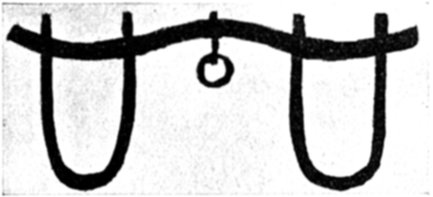
No boat answering his hail, the Frenchman walked up the shore to where the logs were pressing it most closely, and, watching his opportunity, jumped upon one. With his hands in his pockets he unconcernedly waited for his improvised ferry to take him to the opposite shore. In midstream the logs were carried through a rapid. Here the log upon which the young man was standing began to revolve rapidly in the swift current, but he speedily checked the dangerous movement by forcing it to revolve in the opposite direction.
During the strange journey across the river, which at that point was fully 200yds. wide, he never for a moment lost his balance, and all the time was whistling cheerily, apparently wholly oblivious of the danger. When the log upon which he stood was swept across the river and close to the opposite shore, he calmly leaped to the bank. He could not swim, which, strange to relate, is the case with fully one-half of the men engaged in the dangerous work of log driving.
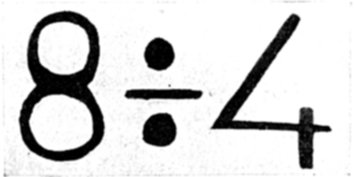
I am told by a gentleman familiar with the scenes and incidents connected with log driving, that he has frequently seen the drivers cross rivers which were comparatively free of logs, by standing upon a log and with their feet making it revolve quite swiftly, and thus gradually propelling it across the stream. Perhaps it was by observing this operation that the inventor conceived the idea of a roller boat, with which experiments have been made on the Atlantic.
When the logs have reached their destination the utility of the log-marks is apparent. When the great mass of logs have been floated to the vicinity of the saw-mills which will manufacture them into lumber, they are brought to a standstill, and preparations are made to separate the logs belonging to different owners. Long "booms" are constructed up and down the river a short distance below the head of the drive of logs.
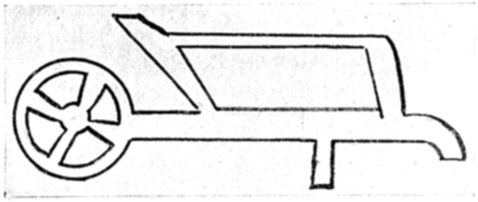
Logs placed end to end, and securely fastened together, form the "booms." The upper end is chained to piers or other immovable objects, which are stout enough to hold the string of logs forming the booms. A river is divided off into a sufficient number of "booms" to provide a separate boom for each firm or individual having logs in the "drive." A strong rope is then stretched across the river a short distance above the ends of the booms. This swings only a few feet above the river, and is for the convenience of the men who separate the logs and float them into the proper boom.
The space between the shore and the first boom is exclusively for logs belonging to a certain firm or individual; the space between the first and second booms for those of another, and so on. As the logs are floated down from the stationary "drive" above, which, perhaps, fills the river from bank to bank, and extends up the stream as far as the eye can reach, the men whose duty it is to separate the logs catch them as fast as they are floated down to them, hastily glance at the log-mark, mount the log, and, with the aid of the rope stretched from bank to bank, pull themselves and the log to a point directly above the boom of the owner of the log, and then release it, and permit it to be carried by the current into the proper boom.
With the aid of pike-poles and other appliances, each man can take care of a number of logs at one time, thus simplifying and expediting the work of separating the logs. As many men as can work without being in each other's way are stationed immediately above the booms, and separate the logs with astonishing accuracy and rapidity.
The log-marks, as in the case of cattle-brands, reduce the theft of logs to the minimum, as the tell-tale mark, if overlooked and not removed, is a silent though convincing witness against anyone who steals it and in whose possession it is found.

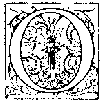
Once or twice one has come across a story of some adventurous couple (usually in America) who have been married in a captive balloon. The incident is reproduced from time to time, the newspapers printing it almost always placing on some other newspaper the responsibility of the statement. The story may originally have taken its birth in a diseased craving of some undistinguished couple for notoriety, or, as is more likely, in a lack of striking headlines for some very enterprising American paper. But in any case, we are concerned here with no such matter, but with an actual wedding trip, undertaken and carried through by a very distinguished couple, in a perfectly free balloon; and this with no idea of notoriety-hunting.
The name of M. Camille Flammarion, the distinguished French astronomer, is very nearly as familiar in this country as in France, and some of his most important works are made popular by means of translations. He is distinguished by an imagination very rare in men of science, and his theories of the inhabitation of the stars are of a very striking and beautiful character; while many other of his astronomical speculations are similarly bold and original.
M. Flammarion's interest in ballooning began more than thirty years ago, and since that time he has been a most enthusiastic aeronaut; making very numerous ascents and recording large numbers of extremely important scientific observations. His book, "Voyages en Ballon," contains many interesting accounts of his ascents, and has been translated by Mr. James Glaisher, the English meteorologist and aeronaut. It is of the wedding trip performed in a balloon by Monsieur and Madame Flammarion that we are to speak.
Madame Flammarion is herself a most enthusiastic balloon-traveller. Indeed, she has often said that nothing but the practical impossibility of the feat prevents her living altogether in a balloon. And she takes much delight in recounting the story of her wedding trip, which was her first balloon ascent, and of a humorous incident which characterized it. We shall give Madame Flammarion's account as nearly as her own words can be rendered in English. The story was told us in the beautiful garden of the Château Juvisy, the magnificent house which is now M. Flammarion's home and observatory, but which has been the resting-place of French Kings in their journeys between Paris and Fontainebleau, from Henri Quatre to Louis Philippe. Parenthetically we may say that Madame Flammarion is herself a distinguished person, and Vice-President of the League of Ladies on behalf of International Disarmament. This is her story as she tells it:—
I had always wished to make a balloon ascent. The stories and descriptions I had read had touched my enthusiasm, and already, before I had entered a balloon, I was, at heart, an enthusiastic aeronaut. To hang in space above, looking down upon the rolling world below, and all the little people in it, was for years the height of all my ambitions. Nevertheless, I never expected to make an ascent in circumstances so novel and charming as those which actually accompanied my first balloon experience.
Just before our marriage, in discussing with my future husband the form which our wedding journey should take, I begged him to choose the most magnificent and poetical route possible—an ideal route, never before made use of in the like circumstances. M. Flammarion understood my meaning at once. Indeed, the same thought had occurred to himself, though I first gave it expression.
From this moment Flammarion was busily engaged with the aeronaut, M. Jules Godard, in making preparations for the aerial journey. But preparations for the wedding itself also claimed attention, and it was in some part in consequence of Flammarion's desires in this matter that an odd incident made memorable the first part of our journey.
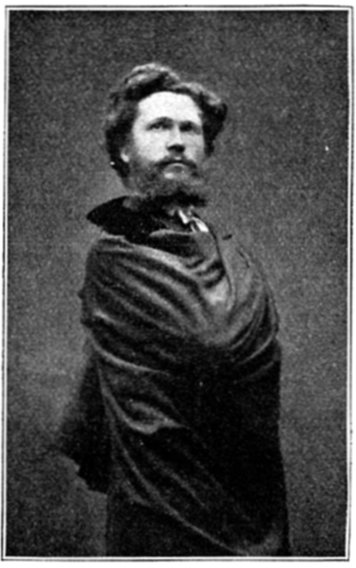
M. FLAMMARION (AT THE TIME OF THE WEDDING). From a Photo. by Alexander Martin, Paris.
First we were married in legal form—in a manner corresponding to marriage before a registrar in England. Flammarion wished this to be the only ceremony, and desired no Church rite; in this being consistent with his great astronomical philosophy, which I expect to be the religion of the future. But in the end he waived his determination, to please our mothers—and, I must confess, to please me also. But he made the condition that there should be no confession, such as is usually made part of the Roman Catholic ceremony. The good Abbé P——, who was to officiate, expended all his eloquence to shake Flammarion's determination in this respect, but his eloquence and his pains went for nothing. It was useless to insist, Flammarion assured him, and he found it so.
"But, my dear friend," pleaded the excellent Abbé, "if not a confession, then at least something: merely a conversation."
"No! Never! Not even that!" was Flammarion's final answer.
"Then," persisted the Abbé, "you will at any rate grant me one personal favour—nothing connected with the ceremony. Say, now, will you grant me that favour?"
"Most certainly," Flammarion replied, rather incautiously. "Granted before asked. What is it?"
"That I may ascend with you in the balloon."
"Abbé—you are a shrewd man. It shall be as you wish, of course. In fact, the balloon will carry four, and as we ourselves, with the aeronaut, M. Godard, make only three, there is a vacancy. You shall fill it, Monsieur l'Abbé—it is promised."
Unfortunately, the outcome of this promise was very deep offence to a very worthy man—so deep, that the Abbé was almost estranged from my husband, as you shall hear.
Every detail of the events of our wedding-day is as clearly defined in my memory as if it were but a recollection of yesterday. It was a brilliant day, and all the town seemed as gay and as happy as we. Still, there was one little matter of regret—our balloon trip must be postponed for a little while, for M. Jules Godard had had an apoplectic fit three days before, and was not yet recovered. This the Abbé did not know.
The service, which was short, had finished, and we were in our carriage—indeed, Flammarion was in the act of closing the door—when a vigorous hand seized the bridegroom's and a joyous voice cried, "And I also?"
It was the Abbé. In the confusion of our happiness we had quite forgotten that he was to accompany us to the breakfast—to which, as a matter of fact, he had been the first person invited.
The Abbé entered the carriage with no more ceremony, installed himself comfortably, and carefully deposited a travelling bag on the seat before him.
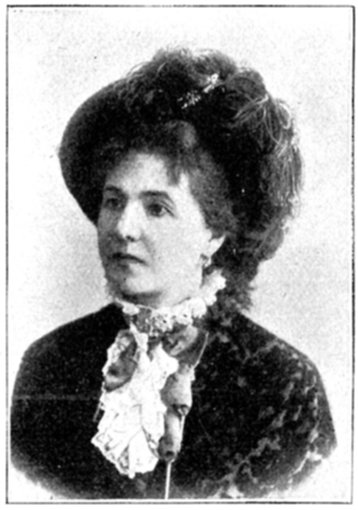
MADAME FLAMMARION (AT THE TIME OF THE WEDDING). From a Photo. by Dagron, Paris.
"Hey! hey!" quoth the Abbé", laughing merrily and rubbing his hands together. "Here we are, my friends! Well! We set out this evening in our balloon, don't we? Eh? I have prepared—O yes, I have prepared! I shall send messages to all my friends. I have filled this bag with little papers, on each of which I have written:[Pg 64] 'From the altitude of the heavens I salute you. Abbé P——.' These we will throw out from the balloon!"
"But, my dear Abbé," said Flammarion, a little taken aback; "we haven't told you. We're not going now!"
The Abbé grew almost livid. "Come!" he stammered. "What—what's this? Is it a joke? Anyhow, it isn't a good one!"
"I assure you, my dear Abbé, it is no joke, but the simple truth. We can't go, for Godard the aeronaut is ill. Three days ago he had an apoplectic fit—indeed, he very nearly died. What should we have done if the fit had occurred in the balloon? He is better now, but not well enough to make the ascent."
The poor Abbé was thunderstruck. "And I was so counting on the journey!" he said. "I've been telling everybody I know! People have even been sending me provisions for the voyage. Truly, I don't know where we should have put them; but that's beside the question—they came. And now we are not to go! I shall be the laughing-stock of all my acquaintance! It's too bad—too bad!"
All through the breakfast the Abbé remained melancholy, notwithstanding the merry occasion, and the fact that Madame Godard, who was present, assured him that her husband was quite unable to make an ascent in his weakly condition. Till at last, in parting from him, Flammarion cheered him by the assurance that he should go up in a balloon after all, for, in fact, the project was only deferred. And so the Abbé departed hopefully. But who can count on the future? Fate disposed things differently, and poor Abbé P——'s misfortune endured to the end of the matter.
At last the time arrived, a week after the wedding-day. On the eve of the day fixed for the ascent my brother-in-law—Ernest Flammarion, the publisher—came to see us. He also wished to ascend with us; was most eager, in fact. It must be remembered that, at the time I speak of, balloon ascents were much less common than they have since become, and one had very few opportunities of an experience in the air. In the end, my husband promised his brother that he should come, if only the Abbé should be prevented, or should from any cause forego his claim. Ernest quite understood the situation, and waited with much anxiety, but with little hope. "It's not of much use," he said. "The Abbé won't give up his place. I'm afraid the thing's settled!"
The few hours intervening before the time fixed for the start were hours of anxious watching. The weather was perfect, but we were constantly on thorns lest some change should manifest itself.
But what of the Abbé? When the start was determined upon—on the morning of the day when Ernest Flammarion called on us—my husband hurried out to inform the Abbé, but found that he was away from home, at La Varenne Saint-Hilaire, which he always made his summer residence. Still, the Abbé's servant assured Flammarion that he would be back, doubtless in the evening. So a note was written and left on the Abbé's desk, thus:—
"We set out to-morrow at close of day in a balloon; do not miss this celestial appointment, but meet us at about five o'clock at the gas-works of La Villette.—Flammarion."
The eventful day (it was the 28th of August, 1874) dawned brilliantly, and the day fulfilled the promise of the dawn—a delightfully equable temperature, a gentle breeze, and a bright sky. And at five we assembled at the gas-works—our aeronaut and his wife, my brother-in-law, Ernest Flammarion, and ourselves, with a number of friends to see us off.
It is necessary to allow plenty of time for preparations in view of a balloon ascent, because of the innumerable details to be attended to, any one of which may delay the start for an unexpected length of time. One may allow an hour as ample, and then, at the end of three hours, find the balloon still unready. No such delay occurred in this case, though Godard and his assistants were hard at work for some time, while we talked with our friends.
The balloon, which rolled and swung before us, had been specially made for us, and it was of 2,000 mètres cubic capacity. Its material was the best China silk, and it had a magnificent dark golden tint, most beautiful as it rose, semi-transparent in the sunshine.
In vain we awaited the Abbé. We wondered whether anything could have prevented his receiving the note, or whether he might be ill. It would soon be impossible to wait longer. The balloon trembled, and the great globe rose, little by little, from the ground. Soon it was a truly beautiful object, immense in its rotundity and majestic as it rose above us, vibrating with the powerful breath that soon was to lift us up into the unknown.
Everything was prepared, and still there was no sign of Abbé P——.
"Plainly the Abbé is not coming," said Godard. "We can wait no longer. We must start at once if we are to see Paris at sunset!"
"Then we will go," said my husband. And scarce had he turned to speak to his brother when the latter was in the car beside the aeronaut. Indeed, he scarce seemed certain of his good fortune till he was well in the air.
Now it was my turn. The car was a little way from the ground, so my husband carried me. I was trembling with excitement and impatience. In another minute, when all four were in their places, Godard cried, "Let go, all!" and our friends about the car fell back quickly.
For me, I confess, it was a serious moment. I could not resist speculations as to where we were going, into what tempestuous whirlwind we might be carried, what lightning-cloud might rend and burn our balloon, now so gallant and so beautiful.
We rose, at first, softly and slowly. For a long time we could hear the voices below us, "Au revoir! A good voyage and a quick return!" But with our release from the earth we were no longer the same: we seemed to leave all earthly interests behind us. Our bodily weight we seemed to lose, and our brains also grew buoyant. We were held entirely by admiration of the wonders about us.

"AU REVOIR!"
Nothing so magnificent had I ever imagined. The charming landscapes of the earth were small things indeed in comparison with the colossal, the marvellous prospect that was before our eyes. When at last we found our voices our exclamations seemed ridiculously inadequate to the occasion.
"Heavens! How beautiful it is, how beautiful!" But we could not find adequate words for it.
My husband said, "The earth descends below us." And the words well expressed the sensation conveyed. The earth seemed to sink away from us in a wonderful, indeed, in a terrible, manner. Everything was wonderful and weird. Indeed, the whole of such a journey seems a strange and fantastic dream, luxurious to the senses and impressively superb. Its beauty cannot be told, cannot be written. It must be seen and felt.
The sun was sinking in the west. For a while the daylight seemed even more intense as it was about to vanish. Then the sun disappeared; it had set. But we rose and rose, and presently we saw the red wonder again. In simple fact, here was the sun rising again for us alone, and in the west! But the sight lasted a very short time, and once more the great luminary sank from sight. We had seen the sun set twice in one evening!
My delight was inexpressible; to sit here beside my newly-made husband here in the sky, travelling I knew not where. Our movement was altogether imperceptible—we would seem to be entirely still; there was no such current of air even as would cause a quiver in the flame of a candle. At this time our height was about 300 or 400 mètres, and we gazed over the edge of the car at the towns, the railway lines, the fields, and the woods—all Liliputian toys, and things to smile at.
We passed over the Buttes-Chaumont, at Vincennes. I turned my head to ask a question of Godard, and was terrified to perceive[Pg 66] that he had in his mouth a large pipe! I touched my husband's arm, and pointed. He looked, and with a cry he instantly snatched the pipe away. "Do you want to blow us all up?" he exclaimed.
But Godard merely laughed. "Ha! ha!" he cried, "you don't perceive. There is no light to it! It is a mere habit. I can't do without my pipe, and I keep it in my mouth and imagine I am smoking. Come, let me have it!"
The incident amused us much, and for almost the whole of the remainder of the journey the pipe remained between Godard's lips, while he, to all appearance, smoked with perfect satisfaction.
And now we came by the mouth of the Marne. Suddenly there was a burst of laughter among us; it came from my husband. At first he could not answer our questions; then he pointed below, to a place where we could perceive something moving. "Listen!" he said.

"'DO YOU WANT TO BLOW US ALL UP?' HE EXCLAIMED."
We listened eagerly, and heard cries of despair in the quiet evening air, far below. "Flammarion! Flammarion! Hé! Flammarion! Come down! Come down here!"
There was great excitement in the little place below. From the garden of a little house several persons were making signs to us.
"This is the place," exclaimed Flammarion; "this is the place, clearly. There is a fatality in this! My friends, we are exactly and perpendicularly above the estate of the Abbé P——, at La Varenne Saint-Hilaire! Do you hear? He calls us!"
And indeed it was the fact, the simple fact. What cruel tricks chance will play!
"Come down! Come down, Flammarion!" And then the voices of those below died away, for we had gone from their sight. It is probable that if we had attempted to descend just there we should all have experienced a good bath in the Marne—a dangerous river in these parts.
Godard threw out ballast, and we rose higher still. "What will the Abbé think?" I said. "He will never pardon us for this heart-breaking disappointment!" And, indeed, to finish with the poor Abbé, I may say here that he would never believe the truth of what had happened, nor under what conditions Ernest Flammarion had been allowed to take his place. He maintained that we had arranged the whole thing beforehand; and for more than a year we saw nothing of him, notwithstanding our friendly attentions and most cordial appeals.
Now the moon shone with such intensity that the country stood as clearly defined as in full daylight, and the time was half-past nine. Here we were at the height of 1,900 mètres, and we seemed to be entering into another world. Here all Nature was in dead silence, superb and terrible; we were in the clouds. My husband has described the scene better than I am able. We were in the starry skies, having at our feet clouds that seemed vast mountains of snow—an impressive, unearthly landscape—white alps, glaciers, valleys, ridges, precipices. An unknown Nature revealed herself, creating, as in a dream, the most dazzling and fantastic panoramas. Stupendous combats between the clouds arose and rolled; the air-currents followed one another, hurled and flung themselves in mighty commotion, shaking and breaking, in dead silence, the monstrous masses. We felt, we saw in action, the powerful, incessant, prodigious forces of the atmosphere, while the earth slept below.
It was a scene beyond all words. Presently[Pg 67] a monstrous elephant formed itself before our eyes. We entered into the very midst of it, and were blinded by the cold and damp vapour—a singular and awful cloud, whence we emerged but to plunge again into others more awful still; now a furious sea, now a group of hideous phantoms, now long, luminous tracts, glittering like streams of silver in the ghostly white light. "This is not so pleasant," my brother-in-law murmured. "Why not descend?"
The billows of cloud piled together, terribly agitated. Above us, below us and about us, all was stirred to fury. My agitation was great; for of all these circumstances the silence, the absolute silence, was the most terrible. Amid all the shocks of the cloud-masses, amid all the rages of the hideous gigantic phantoms, of those fearful forces that might at any moment crush us in a clap of thunder, not a sound, even of the faintest, was heard. The balloon glided through the enervating, cloud-filled heavens steadily and proudly, and soon we were free of the mists, and sailing serenely under the deep blue sky in the pale light of the moon.

"A SINGULAR AND AWFUL CLOUD."
"I like this better," said Ernest, and we agreed with him.
We gazed at the white plain of rolling clouds below us. What was that—the little ball that ran so quickly along the furrowed white spaces? The little ball edged with an aureole of tender colours?
"That?" answered Godard. "That is we ourselves—the balloon, or rather its shadow. What do you think of its rate of travelling, Madame Flammarion—you who imagine that we are not moving at all?"
Truly, it was our own shadow, swiftly skimming the clouds below, a curious and charming sight.
And now we saw the first signs of dawn. The balloon sank and sank, and soon we were skimming above meadows scented with a thousand perfumes. To us it seemed that we must touch the trees every moment, so nearly did we approach the earth. But, as a matter of fact, we were still a hundred mètres from the ground. Again it was a delightful experience, thus to skim above the earth in the silent, starry morning, without a breath of air that we could feel. The plains, the hills, the rivulets passed before us as in a dream. It was communion with Nature indeed.
"Now," said Godard, suddenly, "we are ascending, and quickly." And, indeed, as he spoke we shot upwards, and in a moment were again among the clouds. In the distance we observed a peculiar light. Was it a lighthouse? No, we were far from the sea. Reassured on this point, we are soon uneasy in regard to another, for presently we saw that lightning-flashes were traversing the clouds. "It is a storm," Godard observed, "and it will be a bad one."
"Then we will throw out ballast and avoid it," said my husband.
It was done, and instantly we ascended to the height of 3,000 mètres. Now we saw that the deep blue of the sky was paling, and day broke. Far above us Sirius glittered, and in[Pg 68] a few moments more our altitude was 4,000 mètres, the highest of the trip. At this height I breathed less freely; and everything liquid in the car—even the wine—was frozen. We shivered under our furs, and there was a humming in my ears. In spite of these drawbacks I was as enthusiastic as ever, and I assured my husband, who expressed some solicitude for me, that I had never been better, and that I would be very glad to live in a balloon! And as for descending, who could think of it, with such a spectacle before us? Behind us was the moon and the darkness; below, afar, a storm of lightning and thunder; and before us, most wonderful of all, the rising of the sun, filling the empyrean with his rays and flinging a mantle of purple and gold over all, clouds and balloon alike. The mysterious and weird beauties of the night gave place to the brilliant metamorphosis of day.
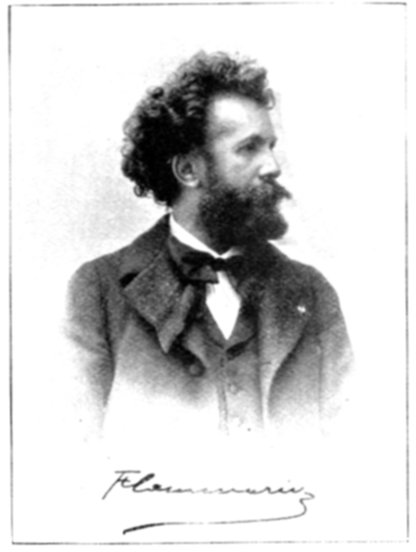
M. FLAMMARION (PRESENT DAY). From a Photo. by Professor Stebbing, Paris.
And now, alas! we returned to earth. In twenty minutes, after a swift though tranquil descent from the height of 4,000 mètres, we were again among our fellow-mortals, in the neighbourhood of Spa. Our trip had lasted nearly thirteen hours.
The population of the district had never seen a balloon so near, and our arrival roused the countryside. The people came running from every direction, yelling and gesticulating, and scarcely had the car touched earth when it was surrounded so closely by a crowd of peasants that it was impossible for Godard to make proper arrangements for landing. By dint of frightful grimaces and abuse, he induced them to draw back sufficiently to enable him to make fast, and then my companions were obliged to protect me: for the women, and even some of the men, came to touch me—my hair, my hands, my face, and my clothes—to make sure that I was really alive!
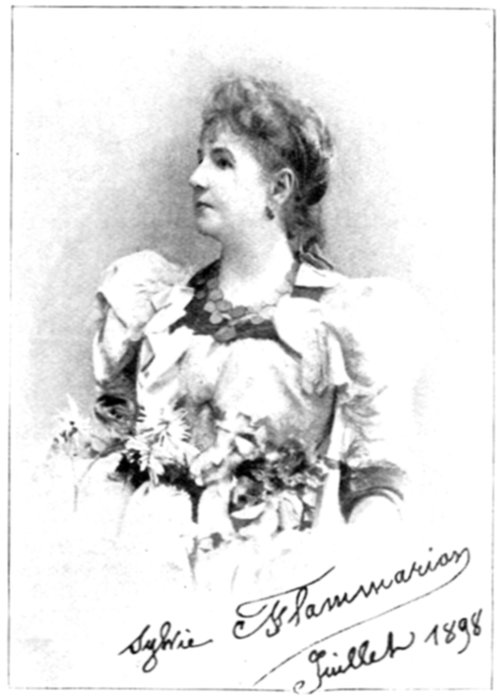
MADAME FLAMMARION (PRESENT DAY). From a Photo. by Professor Stebbing, Paris.
Ernest Flammarion alighted first. "I am very happy," he said, "to have been up in a balloon, but I don't think I shall go again."
As for my husband, his persistent passion for ballooning is well known; and as for myself, I have made two more aerial voyages with him, and I would be glad to make a thousand.
One gets, of course, very little of common luxuries in a balloon. There is just a car of basket-work, and a wooden plank for a seat. The knees must serve for a table, and the head rests on the edge of the car when one sits and rests. The bench will hold only two at a time, and even the two find it a tight fit. Of course, it is impossible to cook in a balloon, for anything in the nature of fire would produce an instant blow-up, and a scattering of the whole expedition to the four winds. The food one takes consists of cold meat, bread, fruit, eggs, and perhaps salad—prepared beforehand. M. Flammarion carried his instruments as usual—his barometers, telescopes, thermometers, and the rest—on his wedding trip, and made scientific observations and notes from first to last.
By J. Holt Schooling.
[The Proprietors of "Punch" have given special permission to reproduce the accompanying illustrations. This is the first occasion when a periodical has been enabled to present a selection from Mr. Punch's famous pages.]

Mr. Punch has, perhaps, never given a better proof of ability to gauge the public mind of this country than that contained in the following lines, quoted from the issue dated November 5, 1898:
A WARNING WORD.
[From Mr. Punch's "Vagrant."]
[Here follow some verses relating to political affairs, and then come the lines printed below. J. H. S.]
Punch published these lines just before Lord Salisbury announced at the Mansion House dinner, given in honour of Lord Kitchener on November 4, that France had come round to our view of the Fashoda question, and Punch's neat verses just quoted give an excellently succinct and pithy expression to the feeling of the average peace-loving Briton, who has become quite weary of being diplomatically played with by France in our colonial affairs, and who was, and is, quite ready to "take off his coat."

1.—THE FIRST PAGE OF THE ORIGINAL PROSPECTUS OF "PUNCH," IN THE HANDWRITING OF MARK LEMON. 1841.
The preceding illustration of Mr. Punch's terse and true expression of public opinion is the most recent that can now be given, but as one looks through the pages of the 113 Volumes of Punch, which bring this famous periodical to the end of the year 1897, one notices many other examples of Mr. Punch's acute discernment and pithy expression of the public mind, which have been stepping-stones of fame to him during his long life of nearly sixty years, quite apart from the weekly dish of good things offered by Mr. Punch to his public.
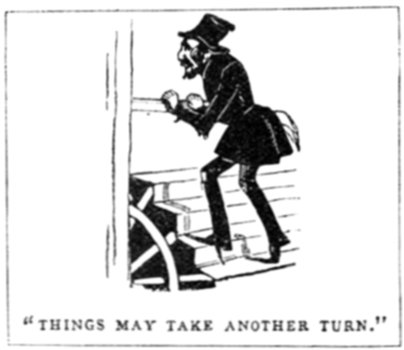
"THINGS MAY TAKE ANOTHER TURN."
2.—THE FIRST PICTURE IN "PUNCH." 1841.
Thanks to the kindness of Messrs. Bradbury and Agnew, the proprietors of Punch, I am able to give to the general public some of the pleasure that comes from the possession of a complete set of Punch. In reading one's Punch the pleasure is much enhanced by Mr. M. H. Spielmann's most admirable book, "The History of Punch" [Cassell and Company, Limited, 1895], for Mr. Spielmann is probably the best living authority on this subject, and his researches, which extended over four years, enable the ordinary Punch-lover to find many points of great interest [specially in the early Volumes] which, without Mr. Spielmann's book, might be passed over without notice. Some of the Punch engravings now shown have been found by the aid of Mr. Spielmann's book, which is a thoroughly reliable and quite indispensable Text-Book on Punch, while, on other points, I have been privileged to consult Mr. W. Lawrence Bradbury and Mr. Philip L. Agnew as well as Mr. Spielmann himself.
CANDIDATES UNDER DIFFERENT PHASES.
CANVASSING. THE DEPUTATON.
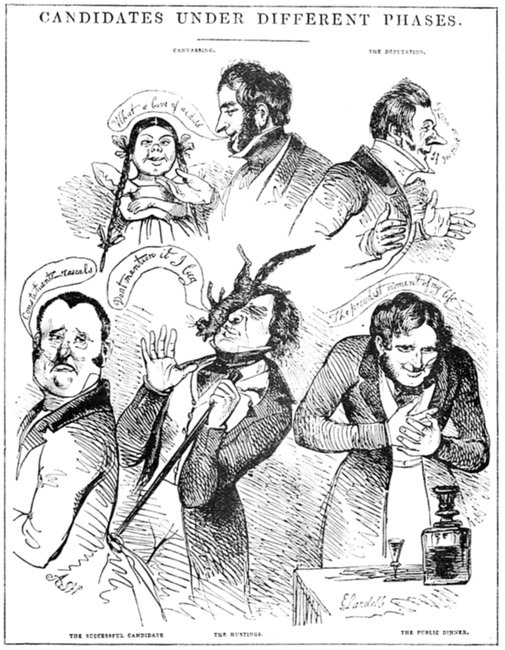
THE SUCCESSFUL CANDIDATE. THE HUSTINGS. THE PUBLIC DINNER.
3.—THE FIRST OF MR. PUNCH'S CARTOONS. 1841.
When the Queen came to the throne there was no Punch. He was conceived in circumstances of much mystery, for many have claimed the honour of his paternity. The historian of Punch has devoted a long chapter to this matter of Punch's paternity, and has judicially weighed the evidence for or against each claimant. Mr. Spielmann writes:—
Yet although it was not ... Henry Mayhew who was the actual initiator of Punch, it was unques[Pg 71]tionably he to whom the whole credit belongs of having developed Landell's specific idea of a "Charivari," and of its conception in the form it took. Though not the absolute author of its existence, he was certainly the author of its literary and artistic being, and to that degree, as he was wont to claim, he was its founder.
PUNCH'S PENCILLINGS.——Nº IV.
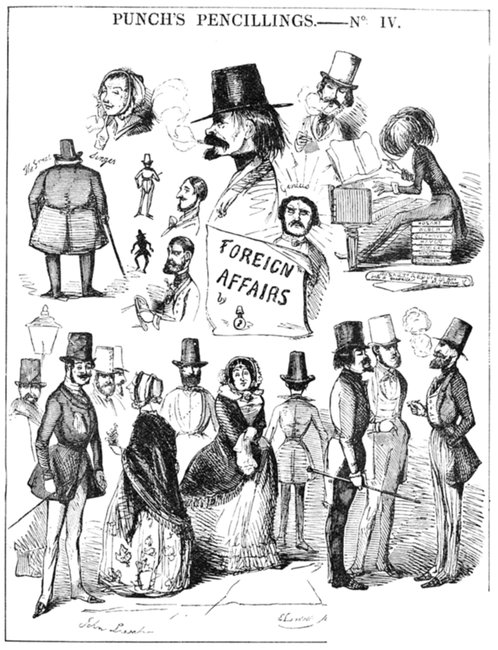
4.—THE FIRST PICTURE BY JOHN LEECH. 1841.
Thus, the opinion of the best authority is that Henry Mayhew and Ebenezer Landells were the real founders of Punch.
Early in 1841, after several discussions between the members of the first staff of Punch, the original prospectus was drawn up by Mark Lemon. The first page of this three-page foolscap document is shown in reduced facsimile in illustration No. 1 of this article. An excellent facsimile, on the original blue foolscap paper, is bound up in a little anonymous pamphlet published in the year 1870, "Mr. Punch: His Origin and Career": but Mr. Bradbury told me that many of the statements about Punch in this pamphlet are erroneous, although the document is an exact copy of the original in Mr. Bradbury's possession, which happens just now to be packed away in a warehouse, and so cannot be photographed.
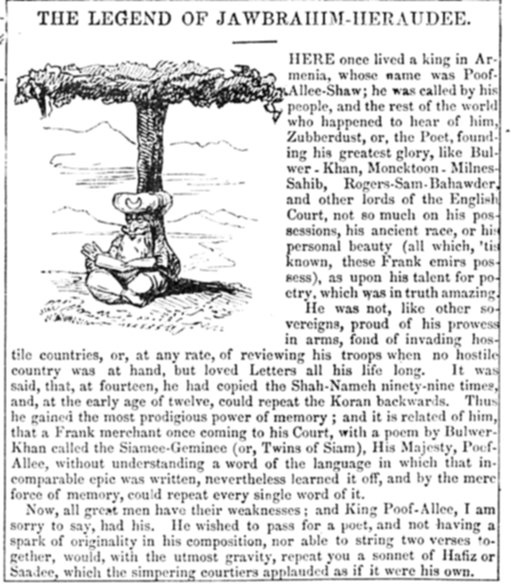
THE LEGEND OF JAWBRAHIM-HERAUDEE.
There once lived a king in Armenia, whose name was Poof-Allee-Shaw; he was called by his people, and the rest of the world who happened to hear of him, Zubberdust, or, the Poet, founding his greatest glory, like Bulwer-Khan, Moncktoon-Milnes-Sahib, Rogers-Sam-Bahawder, and other lords of the English Court, not so much on his possessions, his ancient race, or his personal beauty (all which, 'tis known, these Frank emirs possess), as upon his talent for poetry, which was in truth amazing.
He was not, like other sovereigns, proud of his prowess in arms, fond of invading hostile countries, or, at any rate, of reviewing his troops when no hostile country was at hand, but loved Letters all his life long. It was said, that, at fourteen, he had copied the Shah-Nameh ninety-nine times, and, at the early age of twelve, could repeat the Koran backwards. Thus he gained the most prodigious power of memory; and it is related of him, that a Frank merchant once coming to his Court, with a poem by Bulwer-Khan called the Siamee-Geminee (or, Twins of Siam), His Majesty, Poof-Allee, without understanding a word of the language in which that incomparable epic was written, nevertheless learned it off, and by the mere force of memory, could repeat every single word of it.
Now, all great men have their weakness; and King Poof-Allee, I am sorry to say, had his. He wished to pass for a poet, and not having a spark of originality in his composition, nor able to string two verses together, would, with the utmost gravity, repeat you a sonnet of Hafiz or Saadee, which the simpering courtiers applauded as if it were his own.
5.—THE COMMENCEMENT OF THE FIRST LITERARY CONTRIBUTION BY THACKERAY, WHO ALSO DREW THIS INITIAL SKETCH, 1842.
It is interesting to see in No. 1 that the name Punch was substituted for the struck-out title, "The Fun——." It has been suggested that the title thus cut short in favour of the single word Punch was to have been "The Funny Dogs[Pg 72] with Comic Tales," and the prospectus ends with the words, "Funny dogs with comic tales." The price was written "Twopence," although the price of Punch has always been Threepence.
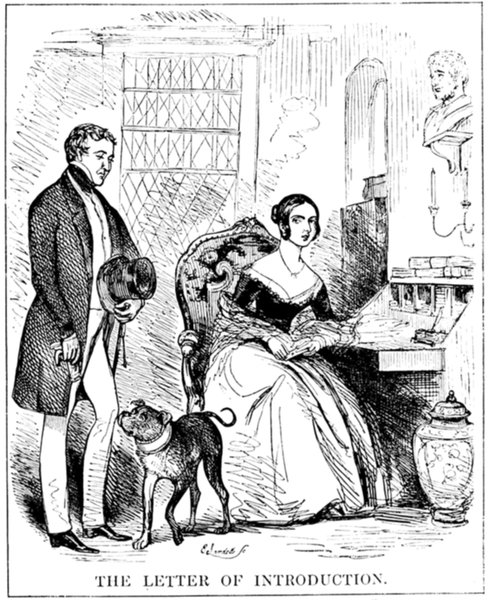
THE LETTER OF INTRODUCTION.
6.—THE FIRST PICTURE OF THE QUEEN IN "PUNCH." 1841.
As regards the sudden change of title to Punch—a change made, as we see from the facsimile, while Mark Lemon was in the very act of writing the title—Mr. Spielmann has recorded that there are as many versions as to the origin of Punch's name as of the origin of the periodical itself.
Hodder declares that it was Mayhew's sudden inspiration. Last asserted that when "somebody" at the Edinburgh Castle meeting spoke of the paper, like a good mixture of punch, being nothing without Lemon, Mayhew caught at the idea and cried, "A capital idea! We'll call it Punch!"
There have been many other claimants to the distinction of having thought of the title "Punch," which is certainly an infinitely better title than "Funny Dogs with Comic Tales" and much better than "The Funny Dogs," which I suggest may have been the title Mark Lemon began to write, judging from the place on the paper (see No. 1), where he began with the words, "The Fun——"; for if he had intended to write the longer title, "The Funny Dogs with Comic Tales," he must have run the last part of this long title too far to the right of his paper to be consistent with the symmetrical position given to his other headings, etc., on the sheet of foolscap: a practised writer unconsciously allows enough space for the symmetrical setting out of his headlines, etc., and that Mark Lemon was a specially practised writer is very clearly shown by inspection of this interesting facsimile.
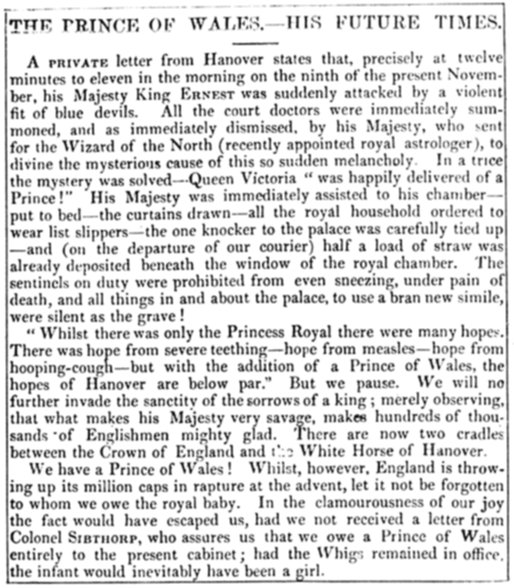
THE PRINCE OF WALES.—HIS FUTURE TIMES.
A private letter from Hanover states that, precisely at twelve minutes to eleven in the morning on the ninth of the present November, his majesty King Ernest was suddenly attacked by a violent fit of blue devils. All the court doctors were immediately summoned, and as immediately dismissed, by His Majesty, who sent for the Wizard of the North (recently appointed royal astrologer), to divine the mysterious cause of this so sudden melancholy. In a trice the mystery was solved—Queen Victoria "was happily delivered of a Prince!" His Majesty was immediately assisted to his chamber—put to bed—the curtains drawn—all the royal household ordered to wear list slippers—the one knocker to the palace was carefully tied up—and (on the departure of our courier) half a load of straw was already deposited beneath the window of the royal chamber. The sentinels on duty were prohibited from even sneezing, under pain of death, and all things in and about the palace, to use a brand new simile, were silent as the grave!
"Whilst there was only the Princess Royal there were many hopes. There was hope from severe teething—hope from measles—hope from hooping-cough—but with the addition of a Prince of Wales, the hopes of Hanover are below par." But we pause. We will no further invade the sanctity of the sorrows of a king; merely observing, that what makes his Majesty very savage, makes hundreds of thousands of Englishmen mighty glad. There are now two cradles between the Crown of England and the White Horse of Hanover.
We have a Prince of Wales! Whilst, however, England is throwing up its million caps in rapture at the advent, let it not be forgotten to whom we owe the royal baby. In the clamorousness of our joy the fact would have escaped us, had we not received a letter from Colonel Sibthorp, who assures us that we owe a Prince of Wales entirely to the present cabinet; had the Whigs remained in office, the infant would inevitably have been a girl.
7.—THE FIRST MENTION OF THE PRINCE OF WALES. 1841.
The first number of Punch came out on the 17th July, 1841, at 13, Wellington Street, Strand. There was a good demand for it, two editions of five thousand copies each being sold in two days. This demand was caused by advertising in various ways, including the distribution of 100,000 copies of a printed prospectus that was nearly identical with the draft whose first page has been shown here.
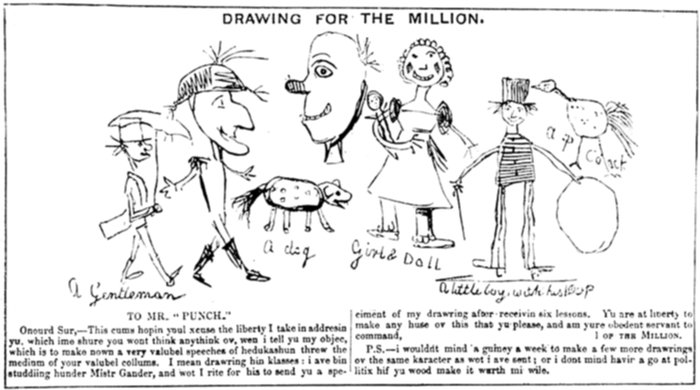
DRAWING FOR THE MILLION.
TO MR. "PUNCH."
Onourd Sur,—This cums hopin youl xcuse the liberty I take in addresin yu, which ime shure you wont think anythink ov, wen I tell yu my objec, which is to make nown a very valubel speeches of hedukashun threw the medium of your valubel collums. I mean drawring bin klasses: i ave bin studdiing hunder Mistr Gander, and wot I rite for his to send yu a speciment of my drawring after receivin six lessons. Yu are at liberty to make any huse ov this that yu please, am yure obedent servant to command,
1 of the Million.
P.S.—i wouldn't mind 'a guiney a week' to make a few more drawrings ov the same karacter as wot I ave sent; or i dont mind havin a go at politix hif yu wood make it wurth mi wile.
8.—A SUPPOSITITIOUS OFFER TO "PUNCH." 1842.
From the first Volume of Punch I have chosen the five pictures here numbered 2, 3, 4, 6, and 7. No. 2 is the first picture in Punch, a distinction that gives importance to this little sketch [the same size as the original] of a broken-down man at work on the tread-mill. By the first picture, I mean the first that was printed on the numbered pages of Punch—this is on page 2 of Vol. I.—for the Introduction contained three wood-cuts, and there was the outside wrapper—of which I shall speak later. But this little cut in No. 2 is really the first of Mr. Punch's famous gallery of black-and-white art. It was drawn by William Newman, and this is one of his so-called "blackies"—little silhouettes that were paid for at the rate of eighteen shillings per dozen.
No. 3 is the first of Mr. Punch's long series of cartoons. This was done by A. S. Henning, and it makes a much nicer picture in its present reduced size than in its original large size, where the work is too coarse in texture. In the forties, there were no ingenious photographic processes for reproducing an artist's work to any scale; the work had to be cut on the wood-block and shown the same size as the original drawing. Hence, in a weekly paper such as Punch, there was often not much time to spend on the wood-engraving, and so many of the drawings, especially the early ones, are wanting in finish.
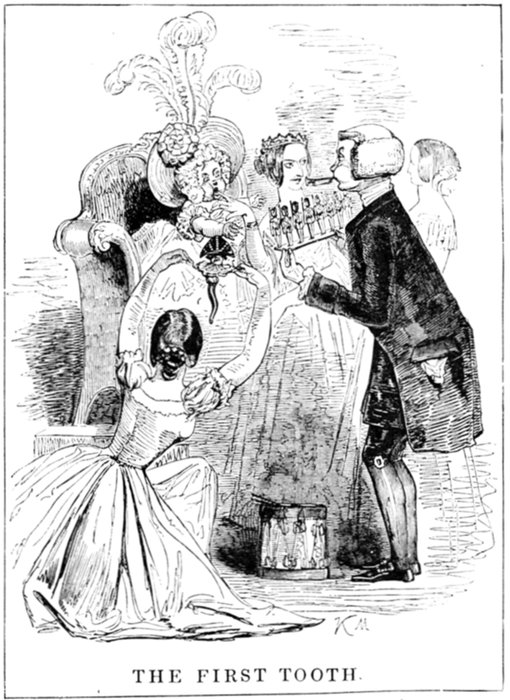
THE FIRST TOOTH.
9.—THE FIRST PICTURE OF THE PRINCE OF WALES. 1843.
Picture No. 4 is the first by famous John Leech—Mr. Punch's first great artist—and in addition to the signature "John Leech"[Pg 74] at the bottom of the block, there is in the middle of the design the curious sign-manual, a leech in a bottle, which John Leech often used to mark his work. This first design by Leech was in the fourth number of Punch, August 7, 1841, and its title "Foreign Affairs" has reference to the groups of foreign refugees who at that time were specially numerous in Soho and Leicester Square—places that even nowadays are characterized by the presence of numerous and not too desirable foreigners.
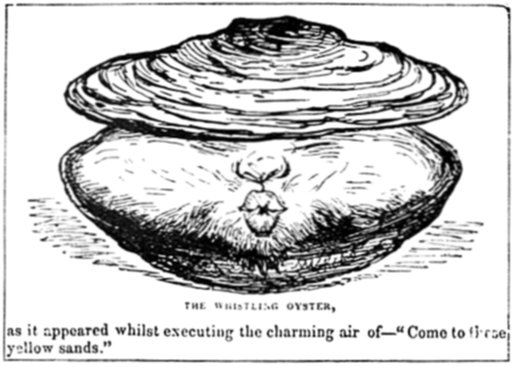
10.—A FANCIFUL DISCOVERY BY "PUNCH." 1843.
The facsimile in No. 5 is from the commencement of Thackeray's first literary contribution to Punch, and the sketch which forms the initial letter T is also by Thackeray. Mr. Spielmann says this sketch is "undoubtedly" by Thackeray; the full contribution is on page 254 of Volume II.
The cartoon shown in No. 6 contains the first picture of Queen Victoria in Punch, and it represents Sir Robert Peel sent for by the Queen to form an Administration in place of the beaten Ministry of Lord Melbourne. This was in the autumn of 1841. The words, The Letter of Introduction, at the bottom of the cartoon, are the title of "a MS. drama, called the 'Court of Victoria,'" on page 90 of Volume I. of Punch, which commences:—
SCENE IN WINDSOR CASTLE.
[Her Majesty discovered sitting thoughtfully at an escritoire.]
Enter the Lord Chamberlain.
Lord Chamberlain: May it please your Majesty, a letter from the Duke of Wellington.
The Queen (opens the letter): Oh! a person for the vacant place of Premier—show the bearer in, my lord. [Exit Lord Chamberlain.]
The Queen (muses): Sir Robert Peel—I have heard that name before, as connected with my family. If I remember rightly he held the situation of adviser to the Crown in the reign of Uncle William, and was discharged for exacting a large discount on all the State receipts; yet Wellington is very much interested in his favour. Etc., etc., etc.
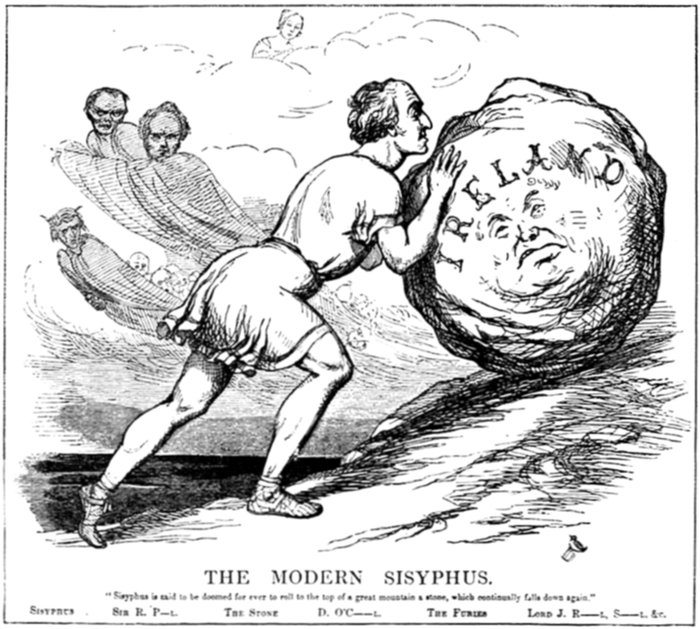
THE MODERN SISYPHUS
"Sisyphus is said to be doomed for ever to roll to the top of a great mountain a stone, which continually falls down again."
Sisyphus Sir R. P—l. The Stone D. O'C——l. The Furies Lord J. R——l, S——l, &c.
11.—RICHARD DOYLE'S FIRST CARTOON. 1844.
In facsimile No. 7 we see the first mention in Punch of the Prince of Wales. It is the first part of a full-page article on page 222 of Volume I., which records the birth of the Prince on November 9, 1841, and which also refers to the disappointment caused to the King of Hanover by the birth of the Queen's second child. Punch writes: "There are now two cradles between the Crown of England and the White Horse of Hanover." How many British Royal[Pg 75] "cradles" are there now between the two things named by Punch?
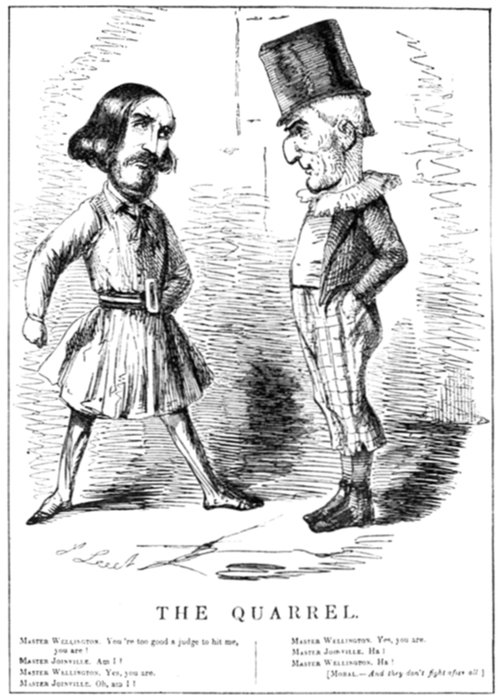
THE QUARREL.
Master Wellington. You're too good a judge to hit me, you are!
Master Joinville. Am I?
Master Wellington. Yes, you are.
Master Joinville. Oh, am I!
Master Wellington. Yes, you are.
Master Joinville. Ha!
Master Wellington. Ha!
[Moral.—And they don't fight after all.]
12.—A SUPPOSITITIOUS CONVERSATION BETWEEN THE DUKE OF WELLINGTON AND THE PRINCE DE JOINVILLE (OF THE FRENCH NAVY). 1844.
This comical sketch in No. 8 was, I suspect, suggested to Mr. Punch by one of the many offers of unsolicited "outside" contributions which have always been severely discouraged. Mr. Punch prefers to rely upon his own staff, although he is always on the alert for fresh talent, and amongst the clever men who have thus been invited to contribute to Punch are Mr. H. W. Lucy ("Toby, M.P."), Mr. R. C. Lehmann (who wrote "The Adventures of Picklock Holes"), Mr. Bernard Partridge (the brilliant successor to Mr. du Maurier), and Mr. Phil May.
We see in No. 9 the first Punch picture of the Prince of Wales. This cartoon was drawn by Kenny Meadows. The Queen is standing at the left of the infant Prince, and points to the first tooth, the doctor blows a toy-trumpet and offers some soldiers, while the lady who kneels is offering a baby's coral with a Punch's head as its chief attraction.
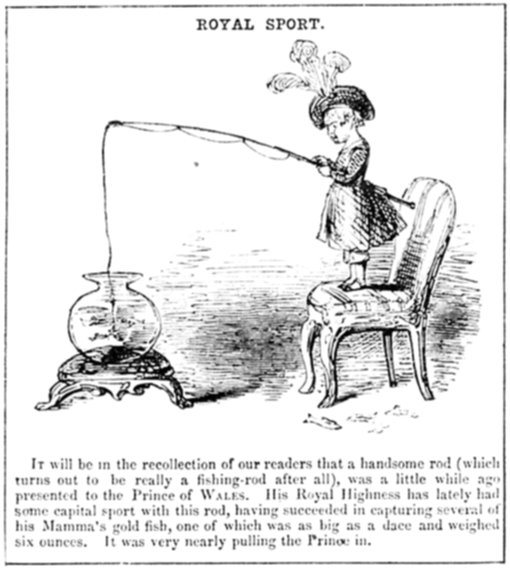
ROYAL SPORT.
It will be in the recollection of our readers that a handsome rod (which turns out to be really a fishing-rod after all), was a little while ago presented to the Prince of Wales. His Royal Highness has lately had some capital sport with this rod, having succeeded in capturing several of his Mamma's gold fish, one of which was as big as a dace and weighed six ounces. It was very nearly pulling the Prince in.
13.—ANOTHER PICTURE OF THE PRINCE OF WALES. 1844.
No. 10 is a very clever sketch of "The Whistling Oyster." A full account of this supposititious discovery is given on page 142-3 of Volume V. of Punch, in the year 1843, and this curiosity was stated to be "in the possession of Mr. Pearkes of Vinegard Yard, opposite the gallery door of Drury Lane Theatre."
The cartoon in No. 11 is the first by another of Mr. Punch's great guns—the famous Richard Doyle. This appeared on March 16, 1844; and "The Modern Sisyphus" is Sir Robert Peel, then Premier, seen in the task of rolling up the great stone [Daniel O'Connell, the Irish orator, who was then agitating for the repeal of the union between Ireland and Great Britain], while Lord John Russell and others represent "The Furies" who are watching Peel's unavailing exertions. The sign-manual at the right of this cartoon—a dicky-bird perched on a D—was often used by Richard Doyle, and may be seen on the present wrapper of Punch. Although No. 11 is the first cartoon contributed by Doyle, it is not the first work he did for Punch, for Doyle commenced his association with the paper by drawing comic borders for the[Pg 76] Christmas number of 1842.
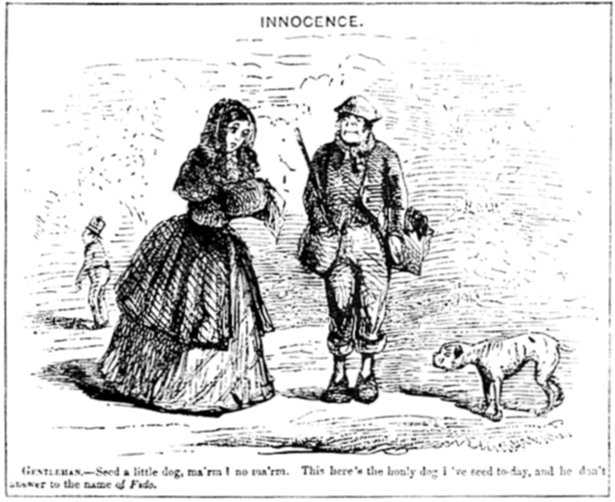
INNOCENCE.
Gentleman.—Seed a little dog, ma'rm? no ma'rm. This here's the honly dog I've seed to-day, and he don't answer to the name of Fido.
14.—A PICTURE OF INNOCENCE. 1845.
John Leech's cartoon, in No. 12, was published September 14, 1844; the Prince de Joinville was in command of the French Navy, and there was some foolish talk in the French papers about an invasion of England. The expression of the Duke of Wellington's face in this cartoon is simply perfect, as he stands with his hands in his pockets calmly looking at the threatening Joinville, and quietly says to the Frenchman, "You're too good a judge to hit me, you are!" One is irresistibly reminded by this clever cartoon of a quite recent affair with our French neighbour, in which the relative positions were not unlike those here shown, and to which the climax was [at any rate, up to date, November, 1898] the same as in Leech's cartoon—And they don't fight after all!
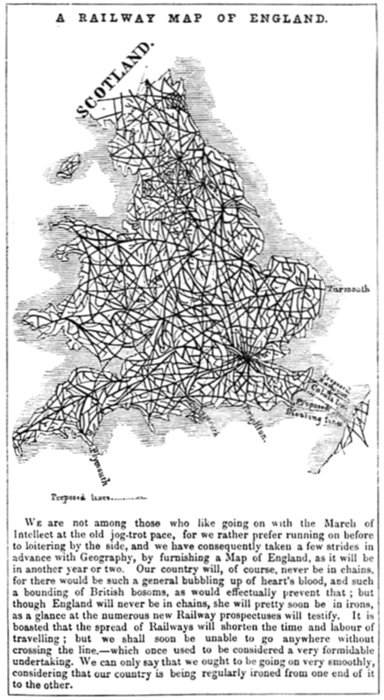
A RAILWAY MAP OF ENGLAND.
We are not among those who like going on with the March of Intellect at the old jog-trot pace, for we rather prefer running on before to loitering by the side, and we have consequently taken a few strides in advance with Geography, by furnishing a Map of England, as it will be in another year or two. Our country will, of course, never be in chains, for there would be such a general bubbling up of heart's blood, and such a bounding of British bosoms, as would effectually prevent that; but though England will never be in chains, she will pretty soon be in irons, as a glance at the numerous new Railway prospectuses will testify. It is boasted that the spread of Railways will shorten the time and labour of travelling; but we shall soon be unable to go anywhere without crossing the line.—which once used to be considered a very formidable undertaking. We can only say that we ought to be going on very smoothly, considering that our country is being regularly ironed from one end of it to the other.
15.—MR. PUNCH POKES FUN AT THE RAILWAY MANIA OF 1845.
No. 13 is from page 157 of Volume VII., October 5, 1844. It represents the Prince of Wales, then not quite three years old, "capturing several of his Mamma's gold fish, one of which was as big as a dace, and weighed six ounces. It was very nearly pulling the Prince in."
In the "Innocence" picture, No. 14, observe that the little dog Fido, which is being sought by the lady, is just visible in the left coat-pocket of the Bill-Sikes-looking rough.
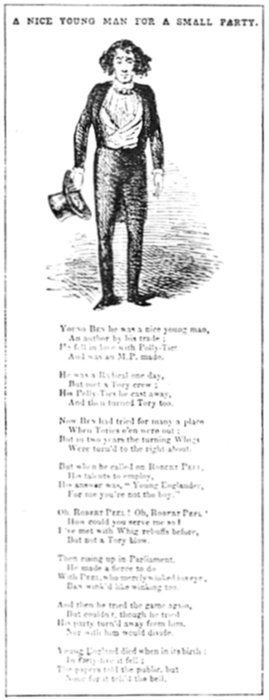
A NICE YOUNG MAN FOR A SMALL PARTY.
16.—AN EARLY PICTURE OF LORD BEACONSFIELD, AS BENJAMIN DISRAELI, 1845.
The Railway Map of England, No. 15, is one of Mr. Punch's prophecies that has[Pg 77] become fact. It is in the issue of October 11, 1845, and refers to the precipitate influx of new lines just then taking place. To us, nowadays, there is nothing remarkable in this Railway Map, which might be mistaken for a genuine railway map of England and Wales; but in 1845, when this map was made by Mr. Punch, he no doubt intended it as a piece of satire.

17.—AT THE END OF 1845.
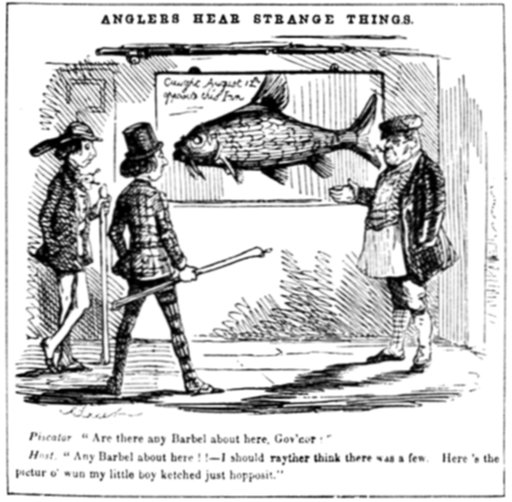
ANGLERS HEAR STRANGE THINGS.
Piscator. "Are there any Barbel about here, Gov'nor?"
Host. "Any Barbel about here!!—I should rayther think there was a few. Here's the picur o' wun my little boy ketched just hopposit."
18.—ONE OF MR. PUNCH'S FISHING TALES. 1845.
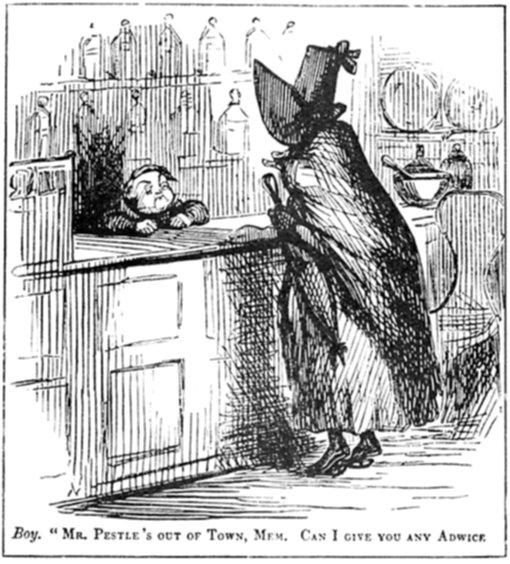
Boy. "Mr. Pestle's out of Town, Mem. Can I give you any Adwice?"
19.—THE DOCTOR'S ASSISTANT. 1846.
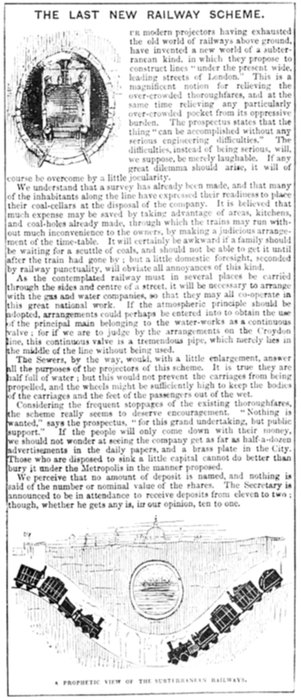
THE LAST NEW RAILWAY SCHEME.
Our modern projectors having exhausted the old world of railways above ground, have invented a new world of a subterranean kind, in which they propose to construct lines "under the present wide, leading streets of London" This is a magnificent notion for relieving the over-crowded thoroughfares, and at the same time relieving any particularly over-crowded pocket from its oppressive burden. The prospectus states that the thing "can be accomplished without any serious engineering difficulties." The difficulties, instead of being serious, will, we suppose, be merely laughable. If any great dilemma should arise, it will of course be overcome by a little jocularity.
We understand that a survey has already been made, and that many of the inhabitants along the line have expressed their readiness to place their coal-cellars at the disposal of the company. It is believed that much expense may be saved by taking advantage of areas, kitchens, and coal-holes already made, through which the trains may run without much inconvenience to the owners, by making a judicious arrangement of the time-table. It will certainly be awkward if a family should be waiting for a scuttle of coals, and should not be able to get it until after the train had gone by; but a little domestic foresight, seconded by railway punctuality, will obviate all annoyances of this kind.
As the contemplated railway must in several places by carried through the sides and centre of a street, it will be necessary to arrange with the gas and water companies, so that they may all co-operate in this great national work. If the atmospheric principle should be adopted, arrangements could perhaps be entered into to obtain the use of the principal main belonging to the water-works as a continuous valve; for if we are to judge by the arrangements on the Croydon line, this continuous valve is a tremendous pipe, which merely lies in the middle of the line without being used.
The Sewers, by the way, would, with a little enlargement answer all the purposes of the projectors of this scheme. It is true they are half full of water; but this would not prevent the carriages from being propelled, and the wheels might be sufficiently high to keep the bodies of the carriages and the feet of the passengers out of the wet.
Considering the frequent stoppages of the existing thoroughfares, the scheme really seems to deserve encouragement. "Nothing is wanted" says the prospectus, "for this grand undertaking, but public support." If the people will only come down with their money, we should not wonder at seeing the company get as far as half-a-dozen advertisements in the daily papers, and a brass plate in the City. Those who are disposed to sink a little capital cannot do better than bury it under the Metropolis in the manner proposed.
We perceive that no amount of deposit is named, and nothing is said of the number or nominal value of the shares. The Secretary is announced to be in attendance to receive deposits from eleven to two: though, whether he gets any is, in our opinion, ten to one.
A PROPHETIC VIEW OF THE SUBTERRANEAN RAILWAYS.
20.—MR. PUNCH SCOFFS AT THE UNDERGROUND RAILWAY SCHEME. 1846.
No. 16 introduces us to a very early Punch-picture of Benjamin Disraeli [June, 1845]; not the first, which was, Mr. Philip Agnew tells me, in the year 1844, but this is the more interesting picture of the two. Mr. Punch was sometimes very severe in his treatment of Disraeli, and this sketch with the accompanying verses is a good example of Punch's early satire. As regards Mr. Punch's politics, it is interesting to quote the following words from "The History of Punch":—
"The Table" [i.e., the weekly Punch dinner-table at which the cartoons, etc., are discussed.—J. H. S.] has always shown an amalgam of Conservative and Liberal instincts and leanings, although the former have never been those of the "predominant partner." The constant effort of the Staff is to be fair and patriotic, and to subordinate their personal views to the general good.[Pg 78] For, whatever the public may think, neither Editor nor Staff is bound by any consideration to any party or any person, but hold themselves free to satirise or to approve "all round."
When No. 16 was published, Disraeli was the leader of the "Young England" party, having some years previously been converted from a Radical into a Tory: hence the allusions contained in the lines below this sketch.
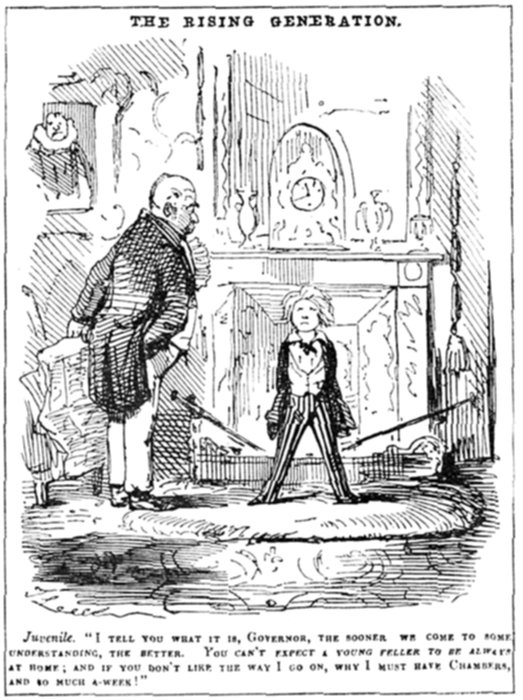
THE RISING GENERATION.
Juvenile. "I tell you what it is, Governor, the sooner we come to some understanding, the better. You can't expect a young feller to be always at home; and if you don't like the way I go on, why I must hate Chambers, and so much a-week!"
21.—ONE OF LEECH'S SKETCHES. 1847.
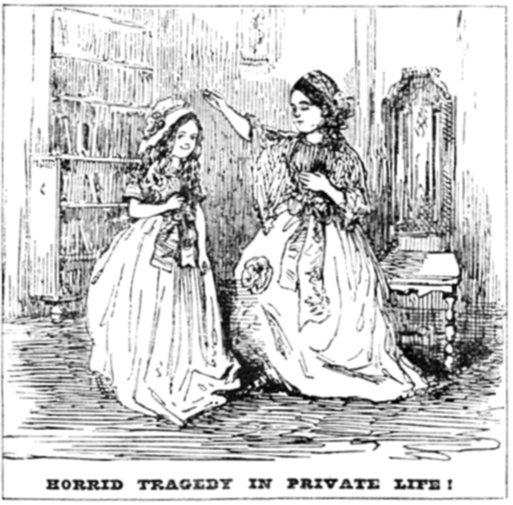
HORRID TRAGEDY IN PRIVATE LIFE!
22.—A JOKE DRAWN BY THACKERAY, THE POINT OF WHICH HAS NEVER BEEN DISCOVERED. 1847.
In a later part of this article Mr. Punch's treatment of Disraeli's great rival Gladstone will be illustrated.
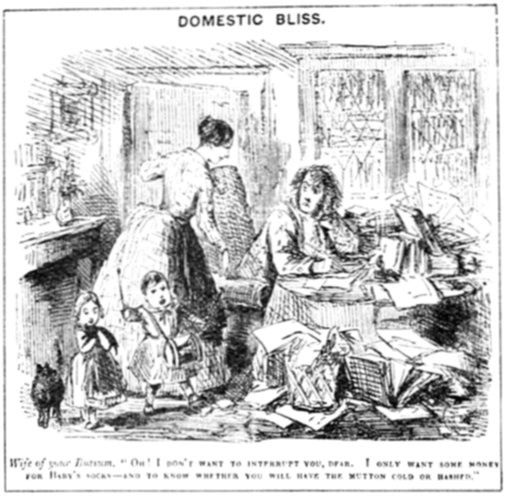
DOMESTIC BLISS.
Wife of your Bussum. "Oh! I don't want to interrupt you, dear. I only want some money for Baby's socks—and to know whether you will have the mutton cold or hashed."
23.—A PICTURE OF DOMESTIC BLISS. 1847.

MR. JOHN BULL AFTER AN ATTACK OF INCOME-TAX.
24.—A SKETCH BY DOYLE. 1848.
The vivid "Portrait of the Railway Panic," by Doyle, No. 17, was published November 8, 1845, and refers to the depression in railway-dividends then being caused by over-competition in railway-promotion; No. 20 also refers to the railway-schemes of that time, and is Mr. Punch's ironical notice [dated September 26, 1846] of "The Last New Railway Scheme," i.e., the proposal for making an Underground Railway, which, as we here read, was scoffed at by Punch—"The Secretary is announced to be in attendance to receive deposits from eleven to two; though, whether he gets any is, in our opinion, ten to one." But immediately below these words Mr. Punch gives a sectional diagram of the Underground Railway as he conceived it, and it is not a bad shot at "A prophetic view of the subterranean railways." As a matter of fact, the works for the now familiar Metropolitan (Under[Pg 79]ground) Railway were commenced in 1860; fourteen years after this ironical prophecy by Punch.
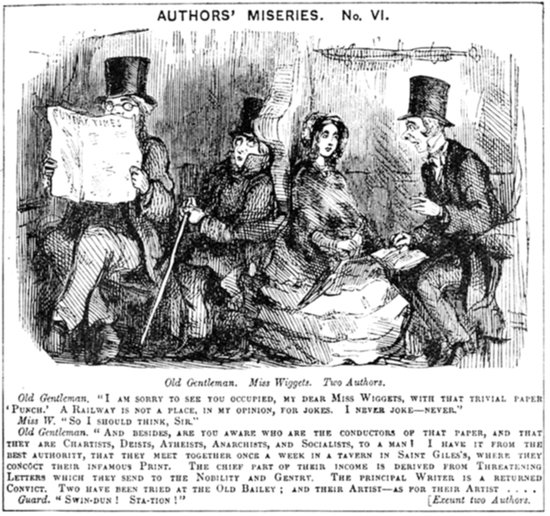
AUTHORS' MISERIES. No VI.
Old Gentleman. Miss Wiggets. Two Authors.
Old Gentleman. "I am sorry to see you occupied, my dear Miss Wiggets, with that trivial paper 'Punch.' A Railway is not a place, in my opinion, for jokes. I never joke—never."
Miss W. "So I should think, Sir."
Old Gentleman. "And besides, are you aware who are the conductors of that paper, and that they are Chartists, Deists, Atheists, Anarchists, and Socialists, to a man? I have it from the best authority, that they meet together once a week in a tavern in Saint Giles's, where they concoct their infamous Print. The chief part of their income is derived from Threatening Letters which they send to the Nobility and Gentry. The principal Writer is a returned Convict. Two have been tried at the Old Bailey; and their Artist—as for their Artist...."
Guard. "Swin-dun! Sta-tion!"
[Exeunt two Authors.
25.—DRAWN BY THACKERAY, AND CONTAINING AT THE LEFT PORTRAITS OF THACKERAY AND OF DOUGLAS JERROLD. 1848.
No. 18 is one of John Leech's jokes on fishermen's tales, and No. 19 is another joke probably based on fact. The amusing picture, No. 21, illustrating "The Rising Generation," is also by John Leech.
No. 22 is a curiosity. It was drawn by Thackeray and published on page 59 of Volume XII., February 6, 1847. From that day to this more than fifty years, no one has discovered the point of this joke by Thackeray. "The History of Punch" records that on the appearance of this sketch the "Man in the Moon" offered "a reward of £500 and a free pardon" to anyone who would publish an explanation. The reward was never claimed.
What does this sketch mean? Is the shorter female a servant caught in the act of trying on her mistress's best cap? But if so, why is the "scene" placed in a room that seems to be a library and not a bedroom? And is the object on, or near, the front of the taller woman's dress, the falling cap of the servant? But if so, how does the servant's cap come to be falling as the figures are placed—there is no sign on the part of the servant [?] that she has just dropped the cap [?] from her left hand? This is truly a puzzle and will probably never be solved, although when one remembers that this was drawn by Thackeray, and passed, as one may suppose, by Mark Lemon, the Editor of Punch in the year 1847, both men of keen wit, it is scarcely possible to think that this joke does not contain any point.
A sketch of "Domestic Bliss" is shown in No. 23, and No. 24 is a picture by Richard Doyle of "Mr. John Bull after an attack of Income-Tax." This was published in the spring of 1848, and must I think have been the outcome of a then-recent smart from an ordinary income-tax payment by Mr. Punch, for on turning up the income-tax records I find that the rate was not unusually high in the year 1848, the tax being 7d. in the £ for the years 1846 to 1852.
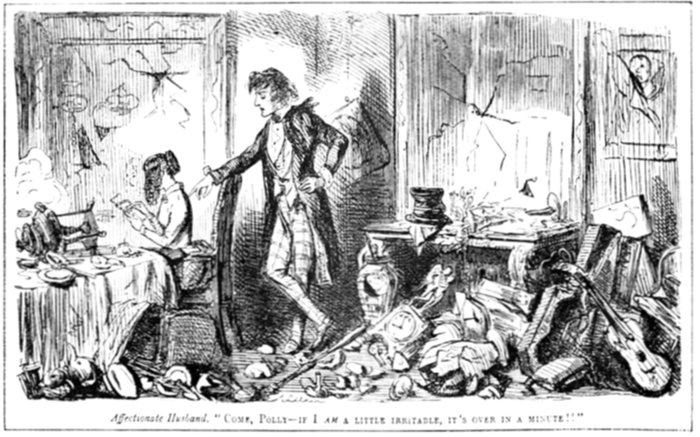
Affectionate Husband. "Come, Polly—if I am a little irritable, it's over in a minute!!"
26.—MORE DOMESTIC BLISS. 1848.
No. 25 was drawn by Thackeray, in 1848[Pg 80] and the "Two Authors" at the left are portraits of Thackeray, who is reading the Sunday Times, and of Douglas Jerrold, who is leaning against the padded division of the railway compartment, while both authors are listening to the denunciations of themselves and of their fellow-Punchites which are being poured out by the reverend gentleman at the other end of the compartment.
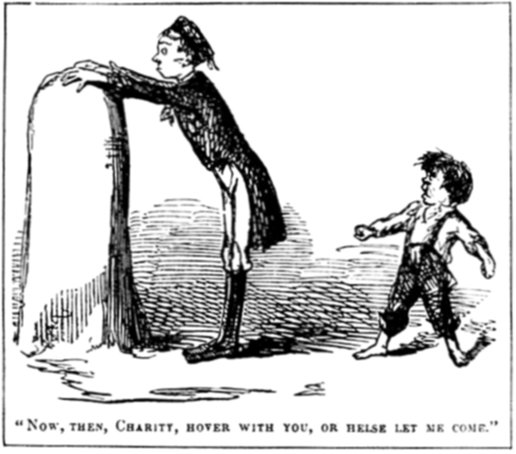
"Now then, Charity, hover with you, or helse let me come."
27.—A STREET-ARAB OF 1849.
Glancing at Nos. 26 and 27, we come to No. 28, which is one of Richard Doyle's very funny serial sketches, entitled "Manners and Customs of ye Englyshe." This is one of the funniest, although, where all are so good, it is difficult to single out any one of this remarkably clever series. Every bit of this sketch, No. 28, is worth looking at; the climbing positions of the deer-stalkers are most comical, and look at the two gillies holding back the dogs, and at the stag who is surveying the approaching attack. This was published September 22, 1849.
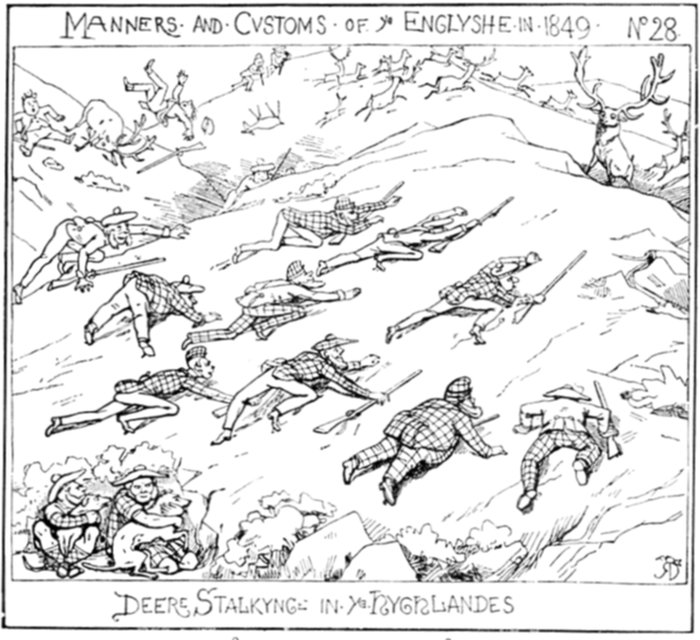
28.—BY RICHARD DOYLE. 1849.
When No. 29 was published there were only eleven (half-yearly) volumes of Punch available for use by the patient who is here seen consulting Dr. Punch. There are now available one hundred and fifteen of these volumes, and actual experience of Dr. Punch's advice to his patient enables me to thoroughly indorse the soundness of the advice given by the wise and genial old doctor of Fleet Street.
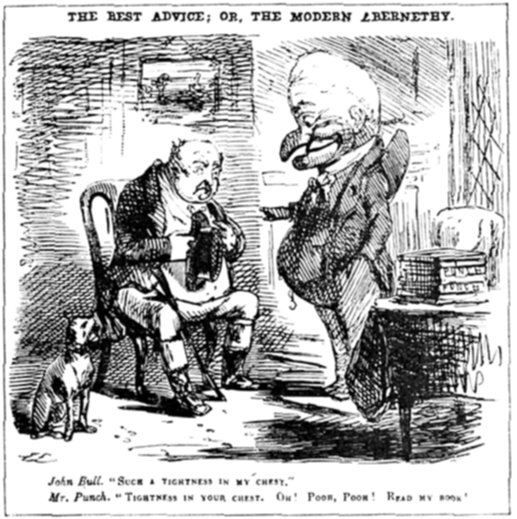
THE BEST ADVICE; OR, THE MODERN ABERNETHY.
John Bull. "Such a tightness in my chest."
Mr. Punch. "Tightness in your chest. Oh! Pooh, Pooh! Read my book!"
29.—A PIECE OF GOOD ADVICE BY DR. PUNCH. 1847.
(To be continued.)


The mineral waters of Spinbronn, in Hundsruck, a few leagues from Pirmesans, formerly enjoyed an excellent reputation, for Spinbronn was the rendezvous of all the gouty and rheumatic members of the German aristocracy. The wild nature of the surrounding country did not deter the visitors, for they were lodged in charming villas at the foot of the mountain. They bathed in the cascade which fell in large sheets of foam from the summit of the rocks, and drank two or three pints of the water every day. Dr. Daniel Haselnoss, who prescribed for the sick and those who thought they were, received his patients in a large wig, brown coat, and ruffles, and was rapidly making his fortune.
To-day, however, Spinbronn is no longer a favourite watering-place. The fashionable visitors have disappeared; Dr. Haselnoss has given up his practice; and the town is only inhabited by a few poor, miserable woodcutters. All this is the result of a succession of strange and unprecedented catastrophes, which Councillor Bremen, of Pirmesans, recounted to me the other evening.
"You know, Mr. Fritz," he said, "that the source of the Spinbronn flows from a sort of cavern about 5ft. high, and from 10ft. to 15ft. across; the water, which has a temperature of 67deg. centigrade, is salt. The front of the cavern is half hidden by moss, ivy, and low shrubs, and it is impossible to find out the depth of it, because of the thermal exhalations which prevent any entrance.
"In spite of that, it had been remarked for a century that the birds of the locality, hawks, thrushes, and turtle-doves, were engulphed in full flight, and no one knew of what mysterious influence it was the result. During the season of 1801, for some unexplained reason, the source became more abundant, and the visitors one evening, taking their constitutional promenade on the lawns at the foot of the rocks, saw a human skeleton descend from the cascade.
"You can imagine the general alarm, Mr. Fritz. It was naturally supposed that a murder had been committed at Spinbronn some years before, and that the victim had been thrown into the source. But the skeleton, which was blanched as white as snow, only weighed twelve pounds; and Dr. Haselnoss concluded that, in all probability, it had been in the sand more than three centuries to have arrived at that state of desiccation.
"Plausible as his reasoning was, it did not prevent many visitors leaving that same day, horrified to have drunk the waters. The[Pg 82] really gouty and rheumatic ones, however, stayed on, and consoled themselves with the doctor's version. But the following days the cavern disgorged all that it contained of detritus; and a veritable ossuary descended the mountain—skeletons of animals of all sorts, quadrupeds, birds, reptiles. In fact, all the most horrible things that could be imagined.
"Then Haselnoss wrote and published a pamphlet to prove that all these bones were relics of the antediluvian world, that they were fossil skeletons, accumulated there in a sort of funnel during the universal Deluge, that is to say, four thousand years before Christ; and, consequently, could only be regarded as stones, and not as anything repulsive.
"But his work had barely reassured the gouty ones, when one fine morning the corpse of a fox, and then of a hawk, with all its plumage, fell from the cascade. Impossible to maintain that these had existed before the Deluge, and the exodus became general.
"'How horrible!' cried the ladies. 'That is where the so-called virtue of mineral waters springs from. Better die of rheumatism than continue such a remedy.'
"At the end of a week the only visitor left was a stout Englishman, Commodore Sir Thomas Hawerbrook, who lived on a grand scale, as most Englishmen do. He was tall and very stout, and of a florid complexion. His hands were literally knotted with gout, and he would have drunk no matter what if he thought it would cure him. He laughed loudly at the desertion of the sufferers, installed himself in the best of the villas, and announced his intention of spending the winter at Spinbronn."

"AGATHA."
Here Councillor Bremen leisurely took a large pinch of snuff to refresh his memory, and with the tips of his fingers shook off the tiny particles which fell on his delicate lace jabot. Then he went on:—
"Five or six years before the revolution of 1789, a young doctor of Pirmesans, called Christian Weber, went to St. Domingo to seek his fortune. He had been very successful, and was about to retire, when the revolt of the negroes occurred. Happily he escaped the massacre, and was able to save part of his fortune. He travelled for a time in South America, and about the period of which I speak, returned to Pirmesans, and bought the house and what remained of the practice of Dr. Haselnoss.
"Dr. Christian Weber brought with him an old negress called Agatha; a very ugly old woman, with a flat nose, and enormous lips. She always enveloped her head in a sort of turban of the most startling colours; and wore rings in her ears which reached to her shoulders. Altogether she was such a singular-looking creature, that the mountaineers came from miles around just to look at her.
"The doctor himself was a tall, thin man, invariably dressed in a blue swallow-tailed coat and leather breeches. He talked very little, his laugh was dry and nervous, and his habits most eccentric. During his wanderings he had collected a number of insects of almost every species, and seemed to be much more interested in them than in his patients. In his daily rambles among the mountains he often found butterflies to add to his collection, and these he brought home pinned to the lining of his hat.
"Dr. Weber, Mr. Fritz, was my cousin and my guardian, and directly he returned to Germany he took me from school, and settled me with him at Spinbronn. Agatha was a great friend[Pg 83] of mine, though at first she frightened me, but she was a good creature, knew how to make the most delicious sweets, and could sing the most charming songs.
"Sir Thomas and Dr. Weber were on friendly terms, and spent long hours together talking of subjects beyond my comprehension—of transmission of fluids, and mysterious things which they had observed in their travels. Another mystery to me was the singular influence which the doctor appeared to have over the negress, for though she was generally particularly lively, ready to be amused at the slightest thing, yet she trembled like a leaf if she encountered her master's eyes fixed upon her.
"I have told you that birds, and even large animals, were engulphed in the cavern. After the disappearance of the visitors, some of the old inhabitants remembered that about fifty years before a young girl, Loisa Muller, who lived with her grandmother in a cottage near the source, had suddenly disappeared. She had gone out one morning to gather herbs, and was never seen or heard of again, but her apron had been found a few days later near the mouth of the cavern. From that it was evident to all that the skeleton about which Dr. Haselnoss had written so eloquently was that of the poor girl, who had, no doubt, been drawn into the cavern by the mysterious influence which almost daily acted upon more feeble creatures. What that influence was nobody could tell. The superstitious mountaineers believed that the devil inhabited the cavern, and terror spread throughout the district.
"One afternoon, in the month of July, my cousin was occupied in classifying his insects and re-arranging them in their cases. He had found some curious ones the night before, at which he was highly delighted. I was helping by making a needle red-hot in the flame of a candle.
"Sir Thomas, lying back in a chair near the window and smoking a big cigar, was regarding us with a dreamy air. The commodore was very fond of me. He often took me driving with him, and used to like to hear me chatter in English. When the doctor had labelled all his butterflies, he opened the box of larger insects.
"'I caught a magnificent horn-beetle yesterday,' he said, 'the lucanus cervus of the Hartz oaks. It is a rare kind.'
"As he spoke I gave him the hot needle, which he passed through the insect preparatory to fixing it on the cork. Sir Thomas, who had taken no notice till then, rose and came to the table on which the case of specimens stood. He looked at the spider of Guyana, and an expression of horror passed over his rubicund features.
"'There,' he said, 'is the most hideous work of the Creator. I tremble only to look at it.'
"And, sure enough, a sudden pallor spread over his face.
"'Bah!' said my guardian, 'all that is childish nonsense. You heard your nurse scream at a spider, you were frightened, and the impression has remained. But if you regard the creature with a strong microscope, you would be astonished at the delicacy of its organs, at their admirable arrangement, and even at their beauty.'
"'It disgusts me,' said the commodore, brusquely. 'Pouff!'
"And he walked away.
"'I don't know why,' he continued, 'but a spider always freezes my blood."
"Dr. Weber burst out laughing, but I felt the same as Sir Thomas, and sympathized with him.
"'Yes, cousin, take away that horrid creature,' I cried. 'It is frightful, and spoils all the others.'
"'Little stupid,' said he, while his eyes flashed, 'nobody compels you to look at them. If you are not pleased you can go.'
"Evidently he was angry, and Sir Thomas, who was standing by the window regarding the mountains, turned suddenly round, and took me by the hand.
"'Your guardian loves his spiders, Frantz,' he said, kindly. 'We prefer the trees and the grass. Come with me for a drive.'
"'Yes, go,' returned the doctor, 'and be back to dinner at six.' Then, raising his voice, 'No offence, Sir Thomas,' he said.
"Sir Thomas turned and laughed, and we went out to the carriage.
"The commodore decided to drive himself, and sent back his servant. He placed me on the seat beside him, and we started for Rothalps. While the carriage slowly mounted the sandy hill, I was quiet and sad. Sir Thomas, too, was grave, but my silence seemed to strike him.
"'You don't like the spiders, Frantz; neither do I. But, thank Heaven! there are no dangerous ones in this country. The spider which your cousin has in his box is found in the swampy forests of Guyana, which is always full of hot vapours and burning exhalations, for it needs a high temperature to support its existence. Its[Pg 84] immense web, or rather its net, would surround an ordinary thicket, and birds are caught in it, the same as flies in our spiders' webs. But do not think any more about it; let us drink a glass of Burgundy.'
"As he spoke he lifted the cover of the seat, and, taking out a flask of wine, poured me out a full leathern goblet.
"I felt better when I had drunk it, and we continued our way. The carriage was drawn by a little Ardennes pony, which climbed the steep incline as lightly and actively as a goat. The air was full of the murmur of myriads of insects. At our right was the forest of Rothalps. At our left was the cascade of Spinbronn; and the higher we mounted, the bluer became the silver sheets of water foaming in the distance, and the more musical the sound as the water passed over the rocks.
"Both Sir Thomas and I were captivated by the spectacle, and, lost in a reverie, allowed the pony to go on as he would. Soon we were within a hundred paces of the cavern of Spinbronn. The shrubs around the entrance were remarkably green. The water, as it flowed from the cavern, passed over the top of the rock, which was slightly hollowed, and there formed a small lake, from which it again burst forth and descended into the valley below. This lake was shallow, the bottom of it composed of sand and black pebbles, and, although covered with a slight vapour, the water was clear and limpid as crystal.
"The pony stopped to breathe. Sir Thomas got out and walked about for a few seconds.
"'How calm it is,' he said.
"Then, after a minute's silence, he continued: 'Frantz, if you were not here, I should have a bathe in that lake.'
"'Well, why not?' I answered. 'I will take a walk the while. There are numbers of strawberries to be found a little way up that mountain. I can go and get some, and be back in an hour.'
"'Capital idea, Frantz. Dr. Weber pretends that I drink too much Burgundy; we must counteract that with mineral water. This little lake looks inviting.'
"Then he fastened the pony to the trunk of a tree, and waved his hand in adieu. Sitting down on the moss, he commenced to take off his boots, and, as I walked away, he called after me:—
"'In an hour, Frantz.'
"They were his last words.
"An hour after I returned. The pony, the carriage, and Sir Thomas's clothes were all that I could see. The sun was going down and the shadows were lengthening. Not a sound of bird or of insect, and a silence as of death filled the solitude. This silence frightened me. I climbed on to the rock above the cavern, and looked right and left. There was nobody to be seen. I called; no one responded. The sound of my voice repeated by the echoes filled me with terror. Night was coming on. All of a sudden I remembered the disappearance of Loisa Muller, and I hurried down to the front of the cavern. There I stopped in affright, and glancing towards the entrance, I saw two red, motionless points.

"I SAW TWO RED, MOTIONLESS POINTS."
"A second later I distinguished some dark moving object farther back in the cavern, farther perhaps than human eye had ever before penetrated; for fear had sharpened my sight, and given all my senses an acute[Pg 85]ness of perception which I had never before experienced.
"During the next minute I distinctly heard the chirp, chirp of a grasshopper, and the bark of a dog in the distant village. Then my heart, which had been frozen with terror, commenced to beat furiously, and I heard nothing more. With a wild cry I fled, leaving pony and carriage.
"In less than twenty minutes, bounding over rocks and shrubs, I reached my cousin's door.
"'Run, run,' I cried, in a choking tone, as I burst into the room where Dr. Weber and some invited friends were waiting for us. 'Run, run; Sir Thomas is dead; Sir Thomas is in the cavern,' and I fell fainting on the floor.
"All the village turned out to search for the commodore. At ten o'clock they returned, bringing back Sir Thomas's clothes, the pony, and carriage. They had found nothing, seen nothing, and it was impossible to go ten paces into the cavern.
"During their absence Agatha and I remained in the chimney-corner, I still trembling with fear, she, with wide open eyes, going from time to time to the window, from which we could see the torches passing to and fro on the mountain, and hear the searchers shout to one another in the still night air.
"At her master's approach Agatha began to tremble. The doctor entered brusquely, pale, with set lips. He was followed by about twenty woodcutters, shaking out the last remnants of their nearly extinguished torches.
"He had barely entered before, with flashing eyes, he glanced round the room, as if in search of something. His eyes fell on the negress, and without a word being exchanged between them the poor woman began to cry.
"'No, no, I will not,' she shrieked.
"'But I will,' returned the doctor, in a hard tone.
"The negress shook from head to foot, as though seized by some invisible power. The doctor pointed to a seat, and she sat down as rigid as a corpse.
"The woodcutters, good, simple people, full of pious sentiments, crossed themselves, and I, who had never yet heard of the hypnotic force, began to tremble, thinking Agatha was dead.
"Dr. Weber approached the negress, and passed his hands over her forehead.
"'Are you ready?' he said.
"'Yes, sir.'
"'Sir Thomas Hawerbrook.'
"At these words she shivered again.
"'Do you see him?'
"'Yes, yes,' she answered, in a gasping voice, 'I see him.'
"'Where is he?'
"'Up there, in the depths of the cavern—dead!'
"'Dead!' said the doctor; 'how?'
"'The spider! oh, the spider!'
"'Calm yourself,' said the doctor, who was very pale. 'Tell us clearly.'
"'The spider holds him by the throat—in the depths of the cavern—under the rock—enveloped in its web—Ah!'
"Dr. Weber glanced round on the people, who, bending forward, with eyes starting out of their heads, listened in horror.
"Then he continued: 'You see him?'
"'I see him.'
"'And the spider. Is it a big one?'
"'O Master, never, never, have I seen such a big one. Neither on the banks of the Mocaris, nor in the swamps of Konanama. It is as large as my body.'
"There was a long silence. Everybody waited with livid face and hair on end. Only the doctor kept calm. Passing his hand two or three times over the woman's forehead, he recommenced his questions. Agatha described how Sir Thomas's death happened.
"'He was bathing in the lake of the source. The spider saw his bare back from behind. It had been fasting for a long time, and was hungry. Then it saw Sir Thomas's arm on the water. All of a sudden it rushed out, put its claws round the commodore's neck. He cried out, "Mon Dieu, Mon Dieu." The spider stung him and went back, and Sir Thomas fell into the water and died. Then the spider returned, spun its web round him, and swam slowly, gently back to the extremity of the cavern; drawing Sir Thomas after it by the thread attached to its own body.'
"I was still sitting in the chimney corner, overwhelmed with fright. The doctor turned to me.
"'Is it true, Frantz, that the commodore was going to bathe?'
"'Yes, cousin.'
"'At what time?'
"'At four o'clock.'
"'At four o'clock? It was very hot then, was it not?'
"'Yes; oh, yes.'
"'That's it. The monster was not afraid to come out then.'
"He spoke a few unintelligible words, and turned to the peasants.
"'My friends,' he cried, 'that is where the mass of débris and those skeletons come from. It is the spider which has frightened away your visitors, and ruined you all. It is there hidden in its web, entrapping its prey into the depths of the cavern. Who can say the number of its victims?'

"IT RUSHED OUT AND PUT ITS CLAWS AROUND THE COMMODORE'S NECK."
"He rushed impetuously from the house, and all the woodcutters hurried after him.
"'Bring fagots, bring fagots!' he cried.
"Ten minutes later two immense carts, laden with fagots, slowly mounted the hill; a long file of woodcutters followed, with hatchets on their shoulders. My guardian and I walked in front, holding the horses by the bridle; while the moon lent a vague, melancholy light to the funereal procession.
"At the entrance of the cavern the cortége stopped. The torches were lighted and the crowd advanced. The limpid water flowed over the sand, reflecting the blue light of the resinous torches, the rays of which illuminated the tops of the dark, overhanging pines on the rocks above us.
"'It is here you must unload,' said the doctor. 'We must block up the entrance of the cavern.'
"It was not without a feeling of dread that they commenced to execute his order. The fagots fell from the tops of the carts, and the men piled them up before the opening, placing some stakes against them to prevent their being carried away by the water. Towards midnight the opening was literally closed by the fagots. The hissing water below them flowed right and left over the moss, but those on the top were perfectly dry.
"Then Dr. Weber took a lighted torch, and himself set fire to the pile. The flames spread from twig to twig, and rose towards the sky, preceded by dense clouds of smoke. It was a wild, strange sight, and the woods lighted by the crackling flames had a weird effect. Thick volumes of smoke proceeded from the cavern, while the men standing round, gloomy and motionless, waited with their eyes fixed on the opening. As for me, though I trembled from head to foot, I could not withdraw my gaze.

"ONE OF THE MEN THREW HIS HATCHET."
"We waited quite a quarter of an hour, and Dr. Weber began to be impatient, when a black object, with long, crooked claws, suddenly appeared in the shadow, and then threw itself forward towards the opening. One of the men, fearing that it would leap over the fire, threw his hatchet, and aimed at the creature so well that, for an instant, the blood which flowed from its wound half-quenched the fire, but soon the flame revived, and the horrible insect was consumed.
"Evidently driven by the heat, the spider had taken refuge in its den. Then, suffocated by the smoke, it had returned to the charge, and rushed into the middle of the flames. The body of the horrible creature was as large as a man's, reddish violet in colour, and most repulsive in appearance.
"That, Mr. Fritz, is the strange event which destroyed the reputation of Spinbronn. I can swear to the exactitude of my story, but it would be impossible for me to give you an explanation. Nevertheless, admitting that the high temperature of certain thermal springs furnishes the same conditions of existence as the burning climate of Africa and South America, it is not unreasonable to suppose that insects, subject to its influence, can attain an enormous development.
"Whatever may have been the cause, my guardian decided that it would be useless to attempt to resuscitate the waters of Spinbronn; so he sold his house, and returned to America with his negress and his collection."
By Dr. Ch. H. Leibbrand.
Illustrated from Photographs taken under his direction by A. and G. Taylor, Photographers to the Queen.

Reader, have you been to Grays, the station next to historical Purfleet, on the London and Tilbury line to Southend? If not, let me tell you that it is not a large place, nor a nice place either. Still, this struggling township on the Thames is worth visiting. Almost within the shadow of its tiny red brick houses lies one of the finest institutions in England for the making of sailors, and soldiers, and citizens—for the making of men.

THE "EXMOUTH."
Proceeding a short distance along the main street towards the river the traveller will be brought face to face with this civilizing centre. He will see a huge, bold, sturdy vessel riding proudly upon the ebbing and flowing tide, moored about a hundred yards off the shore. This splendid three-decker, of 3,106 tons displacement and with a measurement of 220ft. by 59ft., is London's training ship Exmouth.
The vessel's ninety-one portholes still proclaim its original character—that of a man-of-war; even though her armament consists now of but two truck and two field pieces, instead of the ninety-one guns which should be mounted there. Its complement of 600 lads, its Captain-Superintendent, and staff of officers still more eloquently testify to its intimate connection with the defences of the country—with the Navy and the Army, with the development of patriotism and citizenship. For, from this training ship have gone forth about 5,700 youths, well equipped for the struggle of existence, and not less well trained to battle with winds and waves and the treachery of oceans deep. Indeed, of these 5,700 no fewer than 2,106 went to swell the ranks of the Royal Navy; 446 shipped as ordinary seamen; 1,385 as deck and cabin boys; 150 as apprentices, and 300 as assistant cooks and stewards. And again, within the same period, 900 have joined the Army as band boys; whilst hundreds, once more, embarked with average fair success upon other occupations, taking to handicrafts, trades, and industries for which they received their first moral and sound practical training on board this veteran three-decker.
A large part of the striking prosperity which has attended the Exmouth is undoubtedly due to the most competent Captain-Superintendent in Staff-Commander W. S. Bourchier. Entering the Navy in 1840, as a navigating midshipman on board the Impregnable, this officer had, previous to his appointment to the Goliath[Pg 89] in 1870, passed through a school of excellent training. After successive services as navigating sub-lieutenant, first in the Mediterranean, on board the Polyphemus; then on the south-east coast of America, on the brigantine Griffon, he had (upon being promoted navigating lieutenant) held the command of the Myrtle, steamer-tender to the flagship, for close on twelve years. And this varied and instructive career Captain Bourchier had been able to complete by a further service as navigating lieutenant to the then Captain, now Admiral, Sir Anthony Hoskins, on board the Zebra, engaged upon a lengthy cruise along the coast of Africa. With so thoroughly trained and experienced an officer in command the experiment could, therefore, hardly fail to prosper.
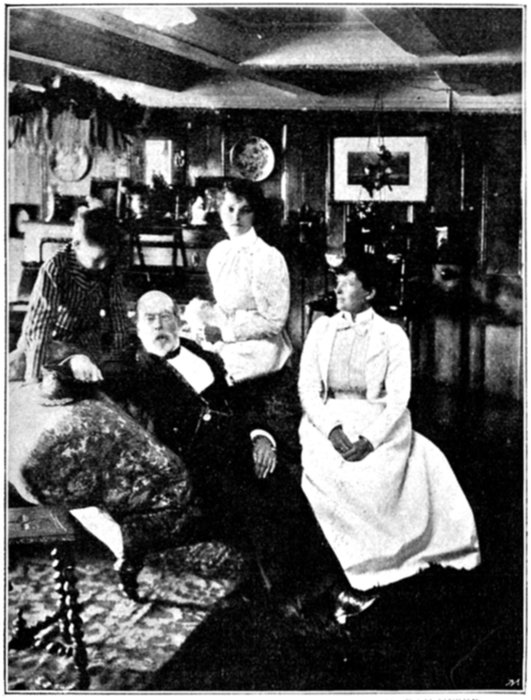
CAPTAIN BOURCHIER, HIS DAUGHTER, AND GRAND-DAUGHTER.
So successful, indeed, has been the training and other educational work carried on on board this splendid three-decker that the last report of Admiral Bosanquet, than whom as Inspecting Captain-General of Naval Training Ships there can hardly be a better authority, may be taken as typical. In this report he says:—
The training ship Exmouth for boys is in most excellent order. The drills and instructions are exceedingly well taught, and the comfort and well-being of the lads is sedulously attended to. Captain Bourchier's arrangements are admirable and conscientiously carried out by a very able staff of officers. It is a model training ship.
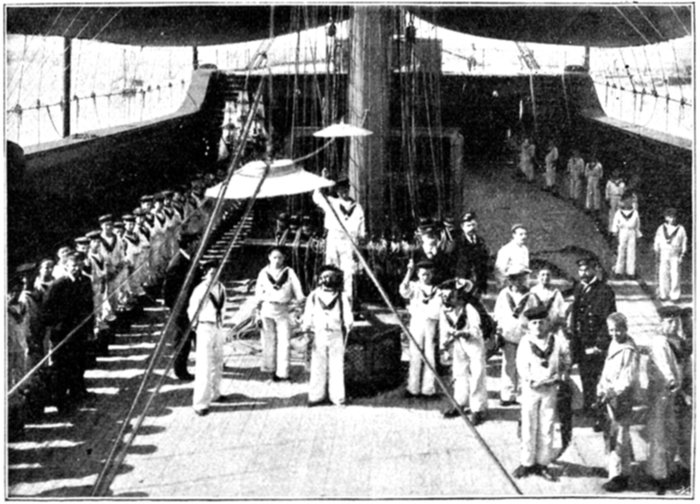
THE FIRE DRILL.
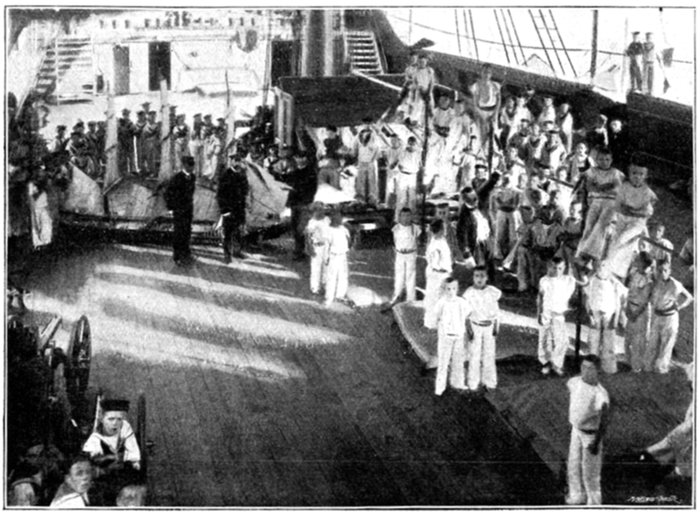
AT GYMNASTICS.
And a model training ship the Exmouth truly is; the brief history of which, who knows? may be a not unimportant factor in the making of British history. To appreciate this paradox, reader, you must see this tiny, yet withal so manly, crew as it was a short time ago my good fortune to see them when I visited the vessel, piloted by that genial assistant clerk to the Metropolitan Asylums Board, Mr. John Mallett. The notice informing the Captain-Superintendent of our intended visit, I afterwards[Pg 90] learned, had reached him but a few minutes previous to our arrival. Yet the moment we appeared on the landing-stage, the wind carried to us five notes of an assembly call. This was the only distinct sign of life on board. But scarcely had it passed by when, as if by magic, the cutters and whalers, the gigs and pinnaces, and the launches of the Exmouth were manned and afloat; when on the main and upper decks, and on the bowsprit, and up the fore, main, and mizzen masts swarmed Lilliputians to their[Pg 91] posts, every tiny man ready to "do his duty." Though, to be sure, it is not an easy duty these sailor boys have to perform, for the routine and discipline on board the Exmouth is as that on board a man-of-war, tempered only by a consideration of the youth of the crew and by the maxim that "kindness leads farther than harshness."
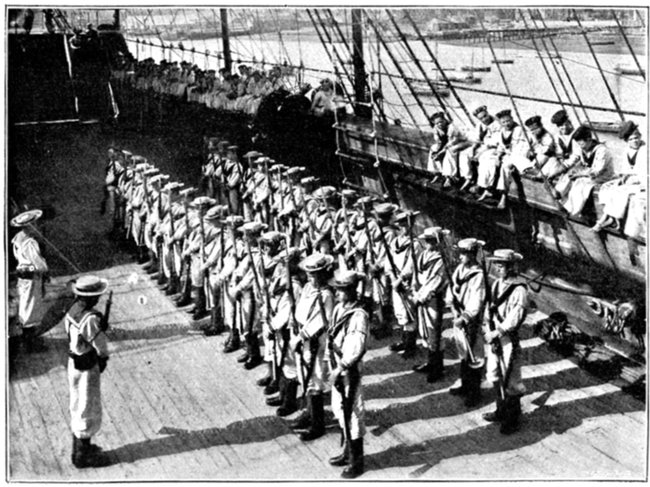
RIFLE DRILL.
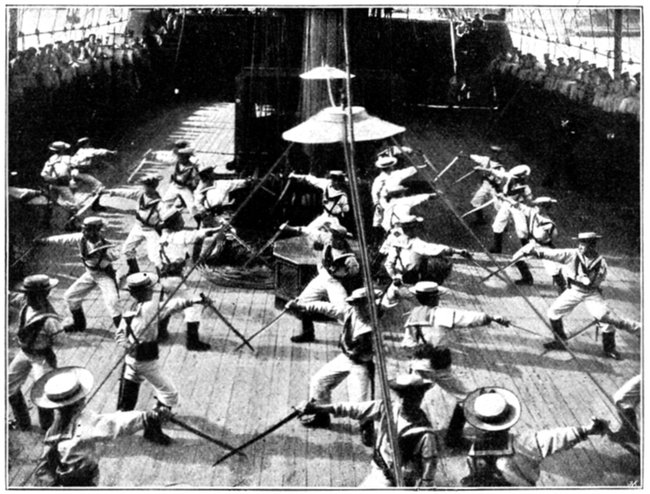
FENCING DRILL.
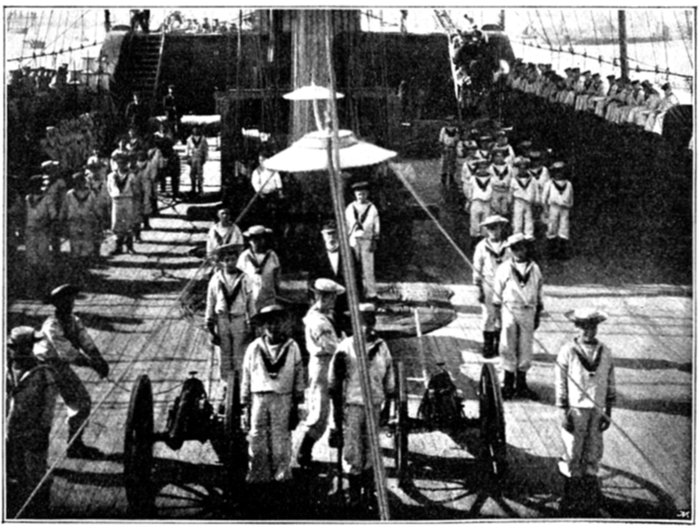
FIELD-GUN DRILL.
From the early morning, when the bugle calls for the speedy slinging up of their hammocks on the orlop deck, till late in the evening, when the general retreat is sounded and the hammock's are once more unslung, the various boat-crews and classes are kept going. Yet not as fancy's whim suggests; maxims evolved from sound experience inspire the educational system on board. For instance, cleanliness is said to be next to godliness. The two, again, are known to be most conducive to discipline. At the same time, the strictest observance of these three precepts is recognised to be absolutely essential to the well-being of a large floating establishment. In[Pg 92] conformity with these truisms, thorough ablutions and thoughtful religious practices, such as morning and evening prayers, at which both officers and crew attend, are, therefore, as prominent features of the training on the Exmouth as is the excellent discipline maintained on board the vessel. The ablutions, however, are particularly worthy of mention; the process is so original. There is a huge, broad tank-bath in the lavatory; not much smaller than a usual-sized swimming bath. Thither the lads proceed in marching order, though, of course, without any baggage, however slight; and promptly start to give themselves a wholesome shampoo with carbolic soap. Being thus lathered they plunge head foremost into the tank. Diving straight through its full width, with wonderful agility they then bound over its anything but low side, landing—at attention—before the officer on watch, ready for inspection as to their outward cleanliness.
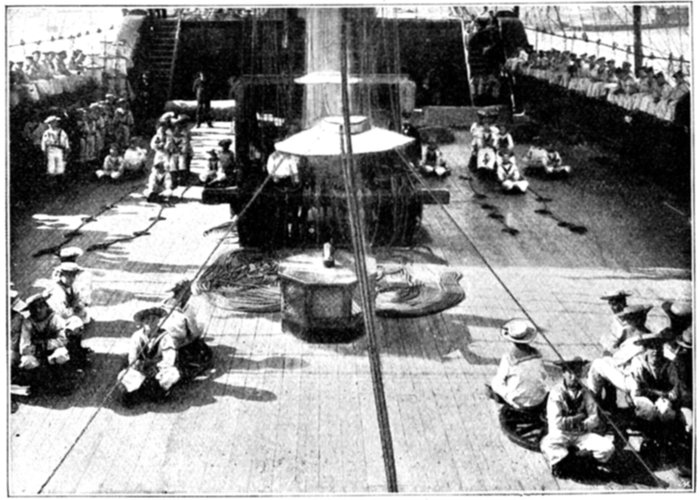
DISMOUNTING FIELD-GUNS.
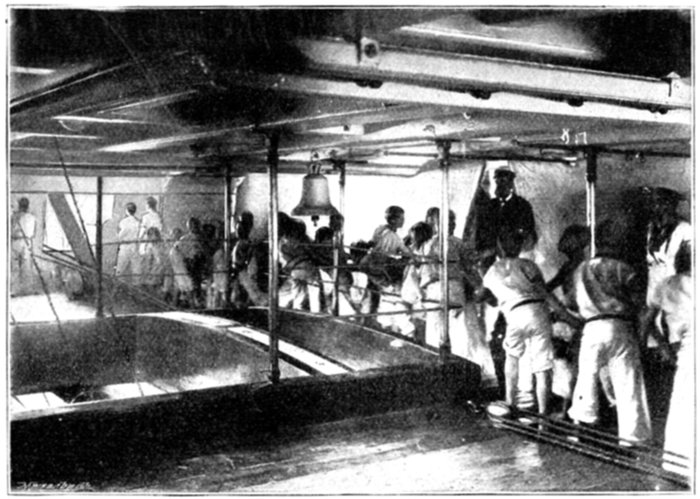
LOCATING THE TRUCK-GUNS.
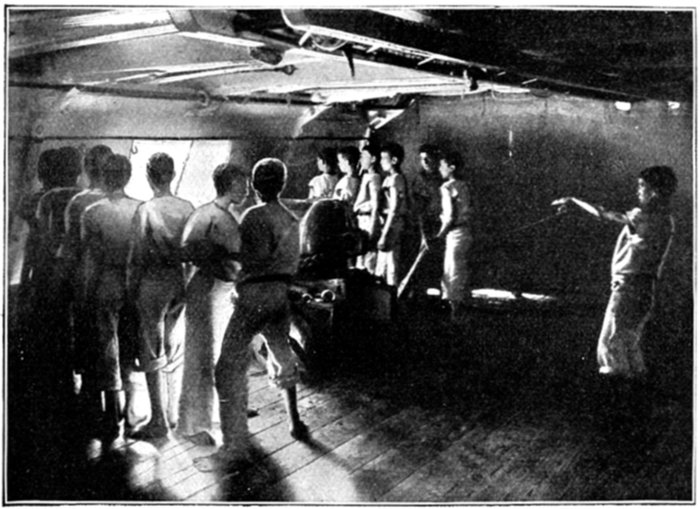
FIRING THE TRUCK-GUN
This agility, this precision in the action and decision in the conduct of the boy-sailors and marines, is noticeable at whatever occupation they may be. Such perfection is to a great extent due to the lads' instruction in gymnastics and athletics. As the several illustrations show, in these they pass through a most comprehensive and systematic course. They are trained in whatever may tend towards the development of their muscles. So efficiently are the boys taught, that those whom I have seen at my visit go through most difficult exercises on the horizontal and parallel bars and on the spring-board, I would safely have compete with the best model sections or Masterriegen of Germany's leading gymnastic societies. Yet the Fatherland is the home and, as it were, the academy of systematic physical culture! Highly satisfactory, too, if[Pg 93] not truly astonishing, is the perfect manner in which the Lilliputians on board the Exmouth take to their musketry, bayonet, and cutlass drill. Reader, you need but look at the illustrating snap-shots to feel that, when grown up or even before, these lads will prove men and warriors bold and true should occasion arise. Indeed, as it is, when witnessing the earnestness and skill with which each command of the drill-masters is executed, you soon fancy to be face to face with a company of marines—veterans in the exercise of arms—although, in fact, they are a company of mere boys, rescued from the streets and recruited from the workhouses. And as veterans in arms they behave at gun drill. At mounting or dismounting field-pieces, at charging or discharging the truck-guns, they are equally smart. How well the crews are trained, both in the use of rifle, cutlass, and cannon, and in their more extensive and complicated application to military tactics, is demonstrated by the photos, illustrating a sham-fight between a party of sailors and an imaginary enemy. It can be seen at a glance that the proceedings are looked upon by the[Pg 94] boys as something more than an amusing intermezzo in their daily routine; with them it is a serious lesson to be learned seriously.
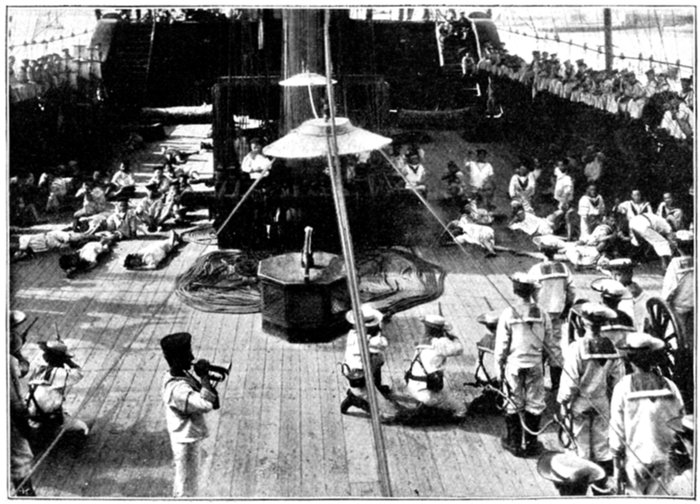
SHAM-FIGHT
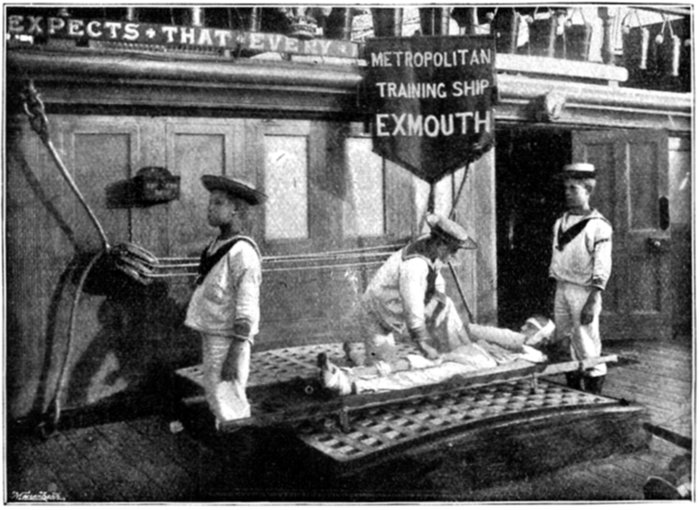
AMBULANCE DRILL.
However, the champions of disarmament and the advocates of peace must not assume that the training ship's youthful crew is reared up only in the spirit of militarism, and instructed only in the manifold defensive and offensive uses of the weapons of war. The picture showing the boy sailors and marines engaged upon Samaritan work, carried out with a promptitude and circumspection of which a master in surgery need not be ashamed, would already disprove their assumption. Yet, they may feel further assured that these principles of assisting the suffering are not confined in their educational operation to the mere bandaging and nursing of the wounded. These are inculcated into the mind and heart of the lads by many other methods, and applicable to many and far different situations.
For, hand in hand with their military training, the wards of the Metropolitan Asylums Board receive the benefit of moral training and a sound elementary education under the able direction of Mr. W. Hollamby, the head schoolmaster on board the vessel. This education, in spite of a rather small staff, considering the hundreds of pupils, is not only equal to that provided at any Metropolitan Board School, but it aspires, justifiably, because successfully—even beyond—at a higher, more comprehensive, more thorough-going instruction, excellent though teaching in London's Board Schools frequently is.
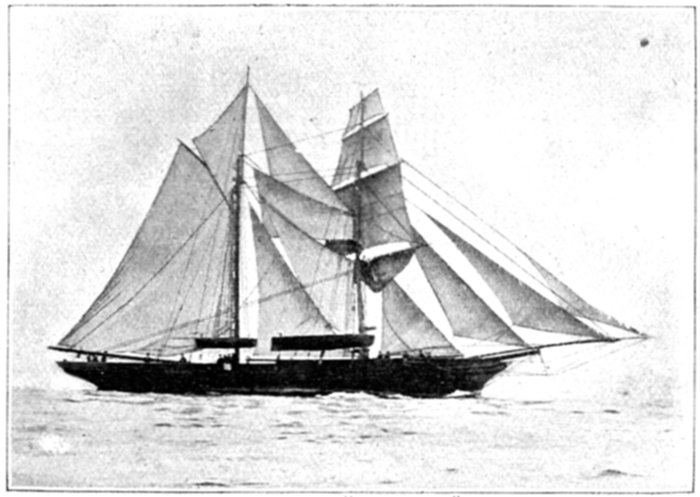
BRIGANTINE "STEADFAST."
Nor is the industrial side forgotten in the system of training on the Exmouth. Tailoring, carpentering, painting, sail and net-making, and so on, are part of the trades the boys have to learn and to prove efficient at. Indeed, most of the extensive and often difficult repairs constantly necessary to the three-decker, to her many boats, and to the boys' own outfits, are done by the latter, and done by these youngsters remarkably well, as, reader, you will see for yourself, if your good fortunes ever ship you to the Exmouth. I say advisedly "good fortunes," because there is a healthiness, a breeziness about the ship, about its captain, officers,[Pg 95] and numerous crew which truly smacks of the free, wholesome, bracing sea, and which cannot fail to act upon the visitor from the town as an excellent nerve-tonic.
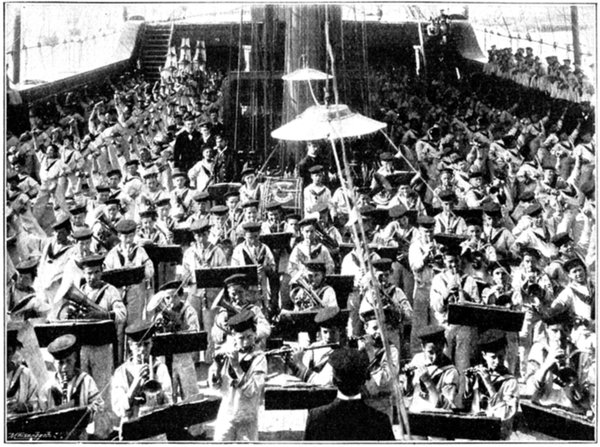
MUSICAL DRILL.
This healthiness, this breeziness, as it were, this sea-atmosphere is, however, easily accounted for by the very nature, by the very purpose of the vessel. Is not the aim of the education, of the training, on board the Exmouth above all to produce sailors of the type of those who have made England what she is to-day—the Queen and the beneficent Ruler Of the Oceans and the foremost colonizing and civilizing Power on earth? Naturally, to achieve this aim the tasks which devolve alike upon instructors and instructed are manifold and heavy. How many thousand and one details have to be taught—and learned? How many thousand and one minute elements are necessary to the making of genuine seamen of these boys? As kindly paymaster, Mr. A. Thompson, puts it in his "Exmouth Song":—
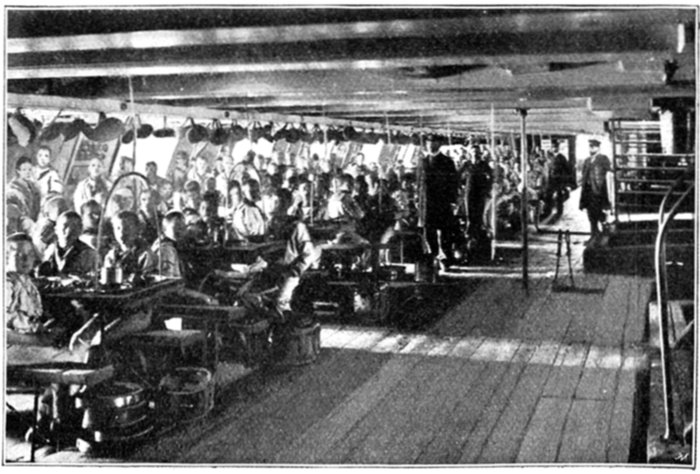
AT MESS.
But it quickly comes all right; the instructors and the lads' hearts are in their work. Thus:—
Sometimes, to be sure; a more practical lesson, which brings the matter truly home, is wanted. As for instance when:—
Yet here, too, all things work towards a good end. Therefore:—
And that these Liliputian men on board the Exmouth become smart sailors is vouchsafed not only by Captain-Superintendent Bourchier, and his capable chief officer, Mr. Wellman; not only by the brigantine Steadfast, the three-decker's sailing tender, and, as our illustration shows, a bold, handsome yacht, of 100 tons burden, with roomy decks and comfortable quarters for fifty lads; but it is also vouchsafed by her weather-beaten commander, Mr. Thomas Hall, than whom there is scarcely a more confidence-inspiring, able salt. Indeed, our Navy owes much to this brigantine. Apart from the nautical training she affords to the Exmouth boys, it is she who, by means of her constant cruises to southern and western ports, brings her complement of excellently taught youths to the direct notice of the captains of our men-of-war. How much they appreciate the budding sailors thus brought before them is shown by the fact that on each return from such a cruise the crew of the brigantine is considerably reduced. But not in consequence of desertions. No, the men-of-war men like the lads, and the lads like the men-of-war men. So it comes to pass that the sailor-boys of London's Training Ship Exmouth become blue-jackets of the Nation and her Queen. And once embarked upon this career we may safely leave them, although, reader, I would fain tell you yet of the large and exceptionally skilled band on board the three-decker which supplies our Navy and, particularly, our Army with so many able musicians every year. I would fain tell you of the Infirmary and its devoted matron, and of the Shipping Home at Limehouse, kept in connection with the training ship for the purpose of providing to the Exmouth lads berths on board merchantmen, and of affording them some safe anchorage when momentarily without a vessel through no fault of their own. I would fain enlist your co-operation in agitating for the increase of training ships such as the one I have endeavoured to describe to you, inasmuch as in these, I hold, lies the strength of our future Navy and supremacy of the seas. But space does not permit me. May I be at least consoled by the hope that I have roused your interest in, and kindled your sympathy for, the Exmouth and her officers and crew.

LEAVING THE SHIP.


Of course, there is a deal of bullying done at sea at times, said the night watchman, thoughtfully. The men call it bullying an' the officers call it discipline, but it's the same thing under another name. Still, it's fair in a way. It gets passed on from one to another. Everybody aboard a'most has got somebody to bully, except, perhaps, the smallest boy; he 'as the worst of it, unless he can manage to get the ship's cat by itself occasionally.
I don't think sailor-men mind being bullied. I never 'eard of it's putting one off 'is feed yet, and that's the main thing, arter all's said and done.
Fust officers are often worse than skippers. In the fust place, they know they ain't skippers, an' that alone is enough to put 'em in a bad temper, especially if they've 'ad their certifikit a good many years and can't get a vacancy.
I remember, a good many years ago now, I was lying at Calcutta one time in the Peewit, as fine a barque as you'd wish to see, an' we 'ad a fust mate there as was a disgrace to 'is sects. A nasty, bullying, violent man, who used to call the hands names as they didn't know the meanings of and what was no use looking in the dictionary for.
There was one chap aboard, Bill Cousins, as he used to make a partikler mark of. Bill 'ad the misfortin to 'ave red 'air, and the way the mate used to throw that in 'is face was disgraceful. Fortunately for us all, the skipper was a very decent sort of man, so that the mate was only at 'is worst when he wasn't by.
We was sitting in the fo'c's'le at ten one arternoon, when Bill Cousins came down, an' we see at once 'e'd 'ad a turn with the mate. He sat all by hisself for some time simmering, an' then he broke out. "One o' these days I'll swing for 'im; mark my words."
"Don't be a fool, Bill," ses Joe Smith.
"If I could on'y mark 'im," says Bill, catching his breath. "Just mark 'im fair an' square. If I could on'y 'ave 'im alone for ten minutes, with nobody standing by to see fair play. But, o' course, if I 'it 'im it's mutiny."
"You couldn't do it if it wasn't, Bill," ses Joe Smith again.
"He walks about the town as though the place belongs to 'im," said Ted Hill. "Most of us is satisfied to shove the niggers out o'[Pg 98] the way, but he ups fist an' 'its 'em if they comes within a yard of 'im."
"Why don't they 'it 'im back?" ses Bill. "I would if I was them."
Joe Smith grunted. "Well, why don't you?" he asked.
"'Cos I ain't a nigger," ses Bill.
"Well, but you might be," ses Joe, very soft. "Black your face an' 'ands an' legs, and dress up in them cotton things, and go ashore and get in 'is way."
"If you will, I will, Bill," ses a chap called Bob Pullin.
Well, they talked it over and over, and at last Joe, who seemed to take a great interest in it, went ashore and got the duds for 'em. They was a tight fit for Bill, Hindu's not being as wide as they might be, but Joe said if 'e didn't bend about he'd be all right, and Pullin, who was a smaller man, said his was fust class.
After they were dressed, the next question was wot to use to colour them with; coal was too scratchy, an' ink Bill didn't like. Then Ted Hill burnt a cork and started on Bill's nose with it afore it was cool, an' Bill didn't like that.
"Look 'ere," ses the carpenter, "nothin' seems to please you, Bill—it's my opinion you're backing out of it."
"You're a liar," ses Bill.
"Well, I've got some stuff in a can as might be boiled-down Hindu for all you could tell to the difference," ses the carpenter; "and if you'll keep that ugly mouth of your's shut, I'll paint you myself."
Well, Bill was a bit flattered, the carpenter being a very superior sort of a man, and quite an artist in 'is way, an' Bill sat down an' let 'im do 'im with some stuff out of a can that made 'im look like a Hindu what 'ad been polished. Then Bob Pullin was done too, an' when they'd got their turbins on, the change in their appearance was wonderful.
"Feels a bit stiff," ses Bill, working 'is mouth.
"That'll wear off," ses the carpenter; "it wouldn't be you if you didn't 'ave a grumble, Bill."
"And mind and don't spare 'im. Bill," ses Joe. "There's two of you, an' if you only do wot's expected of you, the mate ought to 'ave a easy time abed this v'y'ge."
"Let the mate start fust," ses Ted Hill. "He's sure to start on you if you only get in 'is way. Lord, I'd like to see his face when you start on 'im!"
Well, the two of 'em went ashore after dark with the best wishes o' all on board, an' the rest of us sat down in the fo'c's'le spekerlating as to what sort o' time the mate was goin' to 'ave. He went ashore all right, because Ted Hill see 'im go, an' he noticed with partikler pleasure as 'ow he was dressed very careful.
It must ha' been near eleven o'clock. I was sitting with Smith on the port side o' the galley, when we heard a 'ubbub approaching the ship. It was the mate just coming aboard. He was without 'is 'at; 'is neck-tie was twisted round 'is ear, and 'is shirt and 'is collar was all torn to shreds. The second and third officers ran up to him to see what was the matter, and while he was telling them, up comes the skipper.
"You don't mean to tell me, Mr. Fingall," ses the skipper, in surprise, "that you've been knocked about like that by them mild and meek Hindus?"
"Hindus, sir?" roared the mate. "Cert'n'y not, sir. I've been assaulted like this by five German sailor-men. And I licked 'em all."
"I'm glad to hear that," ses the skipper; and the second and third pats the mate on the back, just like you pat a dog you don't know.
"Big fellows they was," ses he, "an' they give me some trouble. Look at my eye!"
The second officer struck a match and looked at it, and it cert'n'y was a beauty.
"I hope you reported this at the police-station?" ses the skipper.
"No, sir," ses the mate, holding up 'is 'ed. "I don't want no p'lice to protect me. Five's a large number, but I drove 'em off, and I don't think they'll meddle with any British fust officers again."
"You'd better turn in," ses the second, leading him off by the arm.
The mate limped off with him, and as soon as the coast was clear we put our 'eds together and tried to make out how it was that Bill Cousins and Bob 'ad changed themselves into five German sailor-men.
"It's the mate's pride," ses the carpenter. "He didn't like being knocked about by Hindus."
We thought it was that, but we had to wait nearly another hour afore the two came aboard, to make sure. There was a difference in the way they came aboard, too, from that of the mate. They didn't make no noise, and the fust thing we knew of their coming aboard was seeing a bare, black foot waving feebly at the top of the fo'c's'le ladder feelin' for the step.
That was Bob. He came down without a word, and then we see 'e was holding another black foot and guiding it to where it should go. That was Bill, an' of all the 'orrid, limp-looking blacks that you ever see, Bill was the worst when he got below. He just sat on a locker all of a heap and held 'is 'ed, which was swollen up, in 'is hands. Bob went and sat beside 'im, and there they sat, for all the world like two wax-figgers instead o' human beings.
"Well, you done it, Bill?" ses Joe, after waiting a long time for them to speak. "Tell us all about it!"
"Nothin' to tell," ses Bill, very surly. "We knocked 'im about."
"And he knocked us about," ses Bob, with a groan. "I'm sore all over, and as for my feet——"
"Wot's the matter with them?" ses Joe.
"Trod on," ses Bob, very short. "If my bare feet was trod on once they was a dozen times. I've never 'ad such a doing in all my life. He fought like a devil. I thought he'd ha' murdered Bill."
"I wish 'e 'ad," ses Bill, with a groan; "my face is bruised and cut about cruel. I can't bear to touch it."

"IT CERT'N'Y WAS A BEAUTY."
"Do you mean to say the two of you couldn't settle 'im?" ses Joe, staring.
"I mean to say we got a hiding," ses Bill. "We got close to him fust start off and got our feet trod on. Arter that it was like fighting a windmill, with sledge-hammers for sails."
He gave a groan and turned over in his bunk, and when we asked him some more about it, swore at us. They both seemed quite done up, and at last dropped off to sleep just as they was, without even stopping to wash the black off or to undress themselves.
I was awoke rather early in the morning by the sounds of somebody talking to themselves, and a little splashing of water. It seemed to go on a long while, and at last I leaned out of my bunk and see Bill bending over a bucket and washing himself and using bad language.
"Wot's the matter, Bill?" ses Joe, yawning and sitting up in bed.
"My skin's that tender, I can hardly touch[Pg 100] it," ses Bill, bending down and rinsing 'is face. "Is it all orf?"
"Orf?" ses Joe; "no, o' course it ain't. Why don't you use some soap?"
"Soap," answers Bill, mad-like; "why, I've used more soap than I've used for six months in the ordinary way."
"That's no good," ses Joe; "give yourself a good wash."
Bill put down the soap then very careful, and went over to 'im and told him all the dreadful things he'd do to him when he got strong ag'in, and then Bob Pullin got out of his bunk an' 'ad a try on his face. Him an' Bill kept washing, and then taking each other to the light and trying to believe it was coming off until they got sick of it, and then Bill 'e up with his foot and capsized the bucket, and walked up and down the fo'c's'le raving.
"Well, the carpenter put it on," ses a voice, "make 'im take it orf."
You wouldn't believe the job we 'ad to wake that man up. He wasn't fairly woke till he was hauled out of 'is bunk an' set down opposite them two pore black fellers an' told to make 'em white again.
"I don't believe as there's anything will touch it," he ses, at last. "I forgot all about that."
"Do you mean to say," bawls Bill, "that we've got to be black all the rest of our life?"
"Certrily not," ses the carpenter, indignantly, "it'll wear off in time; shaving every morning'll 'elp it, I should say."
"I'll get my razor now," ses Bill, in a awful voice; "don't let 'im go, Bob. I'll 'ack 'is head orf."
He actually went off an' got his razor, but o' course, we jumped out o' our bunks and got between 'em and told him plainly that it was not to be, and then we set 'em down and tried everything we could think of, from butter and linseed oil to cold tea-leaves used as a poultice, and all it did was to make 'em shinier an' shinier.
"It's no good, I tell you," ses the carpenter, "it's the most lasting black I know. If I told you how much that stuff is a can, you wouldn't believe me."
"Well, you're in it," ses Bill, his voice all of a tremble; "you done it so as we could knock the mate about. Whatever's done to us'll be done to you too."
"I don't think turps 'll touch it," ses the carpenter, getting up, "but we'll 'ave a try."

"HE BURIED HIS FACE IN IT."
He went and fetched the can and poured some out on a bit o' rag and told Bill to dab his face with it. Bill give a dab, and the next moment he rushed over with a scream and buried his head in a shirt what Simmons was wearing at the time and began to wipe his face with it. Then he left the flustered Simmons an' shoved another chap away from the bucket and buried his face in it and kicked and carried on like a madman. Then 'e jumped into his bunk again and buried 'is face in the clothes and rocked hisself and moaned as if he was dying.
"Don't you use it, Bob," he ses, at last.
"'Tain't likely," ses Bob. "It's a good thing you tried it fust, Bill."
"'Ave they tried holy-stone?" ses a voice from a bunk.
"No, they ain't," ses Bob, snappishly, "and, what's more, they ain't goin' to."
Both o' their tempers was so bad that we let the subject drop while we was at breakfast. The orkard persition of affairs could no longer be disregarded. Fust one chap threw out a 'int and then another, gradually getting a little stronger and stronger, until Bill turned round in a uncomfortable way and requested of us to leave off talking with our mouths full and speak up like Englishmen wot we meant.
"You see, it's this way, Bill," ses Joe, soft-like. "As soon as the mate sees you there'll be trouble for all of us."

"THE TWO MEN WAS SCROUGED UP IN A CORNER."
"For all of us," repeats Bill, nodding.
"Whereas," ses Joe, looking round for support, "if we gets up a little collection for you and you should find it convenient to desart."
"'Ear 'ear," ses a lot o' voices. "Bravo, Joe."
"Oh, desart is it?" ses Bill; "an' where are we goin' to desart to?"
"Well, that we leave to you," ses Joe; "there's many a ship short-'anded as would be glad to pick up sich a couple of prime sailor-men as you an' Bob."
"Ah, an' wot about our black faces?" ses Bill, still in the same sneering, ungrateful sort o' voice.
"That can be got over," ses Joe.
"'Ow?" ses Bill and Bob together.
"Ship as nigger-cooks," ses Joe, slapping his knee and looking round triumphant.
It's no good trying to do some people a kindness. Joe was perfectly sincere, and nobody could say but wot it wasn't a good idea, but o' course Mr. Bill Cousins must consider hisself insulted, and I can only suppose that the trouble he'd gone through 'ad affected his brain. Likewise Bob Pullins.
Anyway, that's the only excuse I can make for 'em. To cut a long story short, nobody 'ad any more breakfast, and no time to do anything until them two men was scrouged up in a corner an' 'eld there unable to move.
"I'd never 'ave done 'em," ses the car[Pg 102]penter, arter it was all over, "if I'd known they was goin' to carry on like this. They wanted to be done."
"The mate'll half murder 'em," ses Ted Hill.
"He'll 'ave 'em sent to gaol, that's wot he'll do," ses Smith. "It's a serious matter to go ashore and commit assault and battery on the mate."
"You're all in it," ses the voice o' Bill from the floor. "I'm going to make a clean breast of it. Joe Smith put us up to it, the carpenter blacked us, and the others encouraged us."
"Joe got the clothes for us," ses Bob. "I know the place he got 'em from, too."
The ingratitude o' these two men was sich that at first we decided to have no more to do with them, but better feelings prevailed, and we held a sort o' meeting to consider what was best to be done. An' everything that was suggested one o' them two voices from the floor found fault with and wouldn't 'ave, and at last we 'ad to go up on deck, with nothing decided upon, except to swear 'ard and fast as we knew nothing about it.
"The only advice we can give you," ses Joe, looking back at 'em, "is to stay down 'ere as long as you can."
A'most the fust person we see on deck was the mate, an' a pretty sight he was. He'd got a bandage round 'is left eye, and a black ring round the other. His nose was swelled and his lip cut, but the other officers were making sich a fuss over 'im, that I think he rather gloried in it than otherwise.
"Where's them other two 'ands?" he ses by-and-by, glaring out of 'is black eye.
"Down below, sir, I b'lieve," ses the carpenter, all of a tremble.
"Go an' send 'em up," ses the mate to Smith.
"Yessir," ses Joe, without moving.
"Well, go on then," roars the mate.
"They ain't over and above well, sir, this morning," ses Joe.
"Send 'em up, confound you," ses the mate, limping towards 'im.
Well, Joe give 'is shoulder a 'elpless sort o' shrug and walked forward and bawled down the fo'c's'le.
"They're coming, sir," he ses, walking back to the mate just as the skipper came out of 'is cabin.
We all went on with our work as 'ard as we knew 'ow. The skipper was talking to the mate about 'is injuries, and saying unkind things about Germans, when he give a sort of a shout and staggered back staring. We just looked round, and there was them two blackamoors coming slowly towards us.

"'GOOD HEAVENS, MR. FINGALL,' SES THE OLD MAN. 'WHAT'S THIS?'"
I never see sich a look on any man's face as I saw on the mate's then. Three times 'e opened 'is mouth to speak, and shut it ag'in without saying anything. The veins on 'is forehead swelled up tremen[Pg 103]dous and 'is cheeks was all blown out purple.
"That's Bill Cousins' hair," ses the skipper to himself. "It's Bill Cousins' hair. It's Bill Cus——"
Bob walked up to him, with Bill lagging a little way behind, and then he stops just in front of 'im and fetches up a sort o' little smile.
"Don't you make those faces at me, sir," roars the skipper. "What do you mean by it? What have you been doing to yourselves?"
"Nothin', sir," ses Bill, 'umbly; "it was done to us."
The carpenter, who was just going to cooper up a cask which 'ad started a bit, shook like a leaf, and give Bill a look that would ha' melted a stone.
"Who did it?" ses the skipper.
"We've been the wictims of a cruel outrage, sir," ses Bill, doing all 'e could to avoid the mate's eye, which wouldn't be avoided.
"So I should think," ses the skipper. "You've been knocked about, too."
"Yessir," ses Bill, very respectful; "me and Bob was ashore last night, sir, just for a quiet look round, when we was set on to by five furriners."
"What?" ses the skipper; and I won't repeat what the mate said.
"We fought 'em as long as we could, sir," ses Bill, "then we was both knocked senseless, and when we came to ourselves we was messed up like this 'ere."
"What sort o' men were they?" asked the skipper, getting excited.
"Sailor-men, sir," ses Bob, putting in his spoke. "Dutchies or Germans, or something o' that sort."
"Was there one tall man, with a fair beard," ses the skipper, getting more and more excited.
"Yessir," ses Bill, in a surprised sort o' voice.
"Same gang," ses the skipper. "Same gang as knocked Mr. Fingall about, you may depend upon it. Mr. Fingall, it's a mercy for you you didn't get your face blacked too."
I thought the mate would ha' burst. I can't understand how any man could swell as he swelled without bursting.
"I don't believe a word of it," he ses, at last.
"Why not?" ses the skipper, sharply.
"Well, I don't," ses the mate, his voice trembling with passion. "I 'ave my reasons."
"I s'pose you don't think these two poor fellows went and blacked themselves for fun, do you?" ses the skipper.
The mate couldn't answer.
"And then went and knocked themselves about for more fun?" says the skipper, very sarcastic.
The mate didn't answer. He looked round helpless like, and see the third officer swopping glances with the second, and all the men looking sly and amused, and I think if ever a man saw 'e was done 'e did at that moment.
He turned away and went below, and the skipper arter reading us all a little lecture on getting into fights without reason, sent the two chaps below ag'in and told 'em to turn in and rest. He was so good to 'em all the way 'ome, and took sich a interest in seeing 'em change from black to brown and from light brown to spotted lemon, that the mate daren't do nothing to them, but gave us their share of what he owed them as well as an extra dose of our own.
Note.—Under this title we intend printing a series of perfectly authentic anecdotes of animal life, illustrated by Mr. J. A. Shepherd, an artist long a favorite of The Strand Magazine. We shall be glad to receive similar anecdotes, fully authenticated by names of witnesses, for use in future numbers. While the stories themselves will be matters of fact, it must be understood that the artist will treat the subject with freedom and fancy, more with a view to an amusing commentary than to a mere representation of the occurrence.
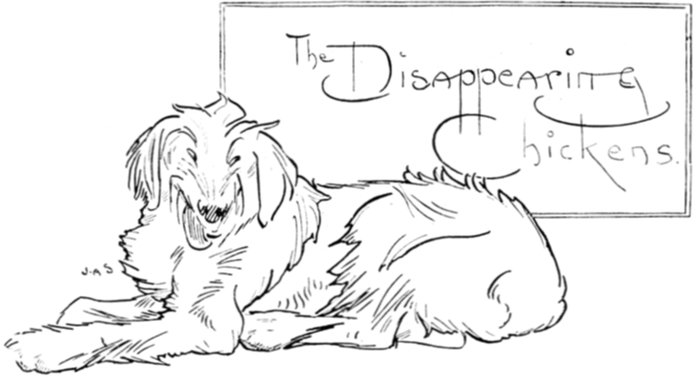

This incident took place in the spring of 1897, at French's Farm, Netherfield, near Battle, Sussex. This farm lies in the midst of the chicken-raising district, and it was at the time in the occupation of Mr. W. A. Williams. Mr. Williams, among his other farm operations, reared thousands of chickens, which the travelling higglers would collect and fatten for the market. Most of these chickens were hatched in an incubator and reared by aid of a foster-mother—which latter, by the way, is not a motherly old hen, as some might suppose, but a sort of box lined with flannel. Sometimes it is merely an old coop.
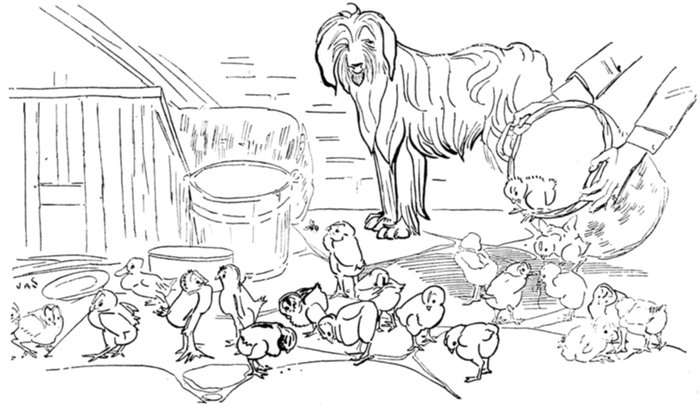
MOTHERLESS AND INQUISITIVE.
The farm was surrounded by woods, and at first many chicks were lost by raids of[Pg 105] foxes. To check the foxes, Mr. Williams washed the coops well with carbolic acid, and let his dogs loose at night. This was effectual. Mr. Williams's tailless sheepdog "Satan" and a spaniel bitch had many a moonlight fox hunt together. Satan, by the way, was a peculiar dog, very quiet, but a game fighter when roused.
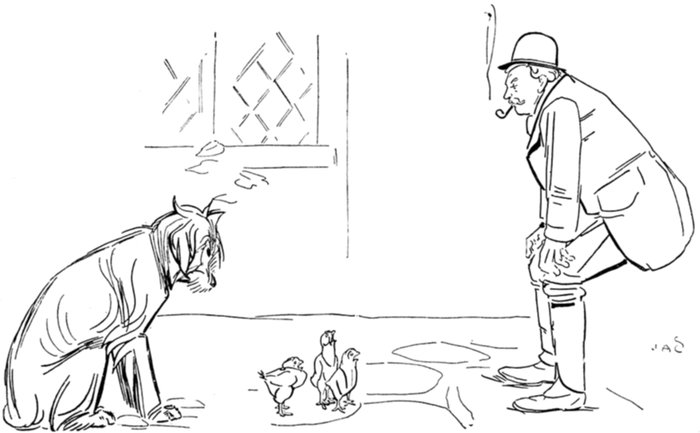
ONLY THREE LEFT.
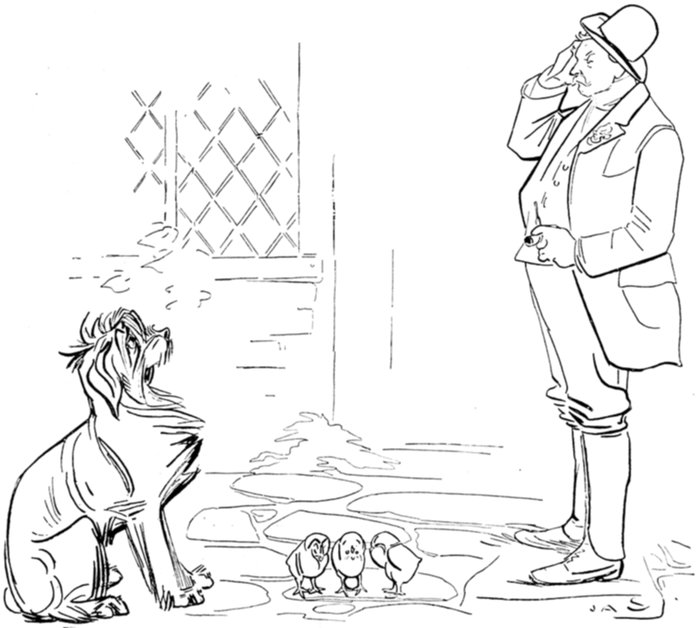
BEYOND THE WIT OF MAN OR DOG.
For a time the chickens prospered, and then, one morning, Mr. Williams found but three left out of some twenty-five fresh-hatched the day before. It was very odd. Mr. Williams couldn't understand it, and his dog Satan seemed equally puzzled. The chicks had been turned out in excellent health the day before, twenty-five inquisitive, little, fuzzy activities, all agog to examine the world. Now there were but three, and not a scrap or a fragment of fluff left to suggest what had happened.
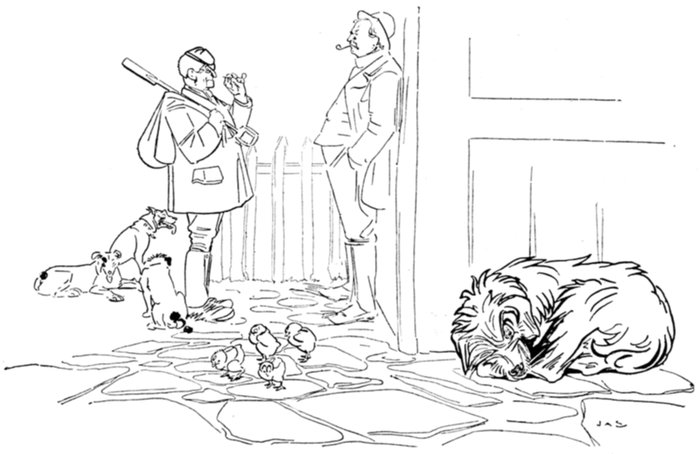
"WHAT! NO RATS?"
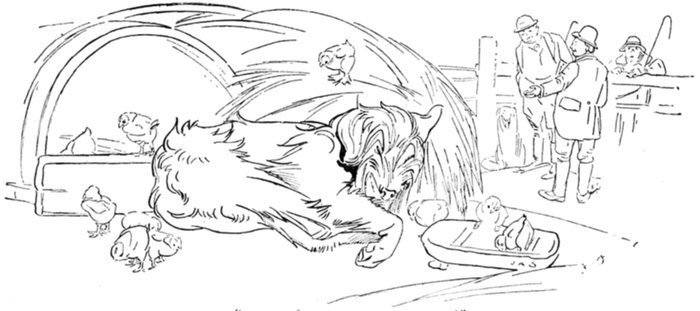
"THE DOG? NONSENSE; LOOK AT HIM!"
The thing occurred again and again, and the mystery was dense as ever. It couldn't be foxes, because they almost always kill a few for the sake of killing, and leave them lying about. Was it rats? No, there were no rats, said the rat-catcher who was called in. But still the disappearances went on, and morning after morning fifteen or twenty of yesterday's chicks were not to be found; and the door of their coop was opened, or knocked down. If it were a human thief, why did he leave any at[Pg 107] all? And besides, a man entering the yard at night would have been pounced on by the dogs at once. At last, in desperation, a friend suggested that perhaps the sheepdog knew something of it. But that was altogether unlikely—one had only to glance at him to see it. He was always a kindly guardian—almost a parent to the motherless chicks. He was chained up just outside the farm-house door all day, with a brood of happy chicks ever in his kennel and his food-pan, and, indeed, hopping all over him fearlessly, and nothing they could do ruffled his placid temper or changed his benevolent aspect. So the mystery continued, and was deep as ever.
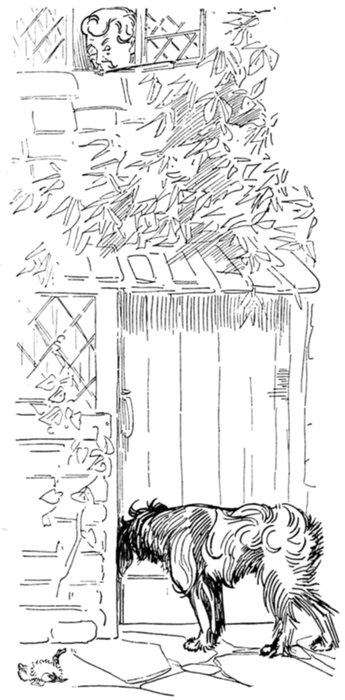
LISTENING.
Till one morning it happened to be necessary for Mr. Williams to rise just after dawn, and as he did so he looked out of his bedroom window. There stood Satan, the sheepdog, listening intently at the house door. As he listened and his master watched, there presently came along a batch of young chicks. Plainly the door of their coop had been opened again, and they had been let out. And then Mr. Williams gasped. For straightway the dog turned and calmly began snapping up the chicks, bolting them whole, as Mr. Williams expresses it, "like oysters." He had thus disposed of eight or nine in rapid succession, when Mr. Williams made a noise at the window, and the dog instantly fled.
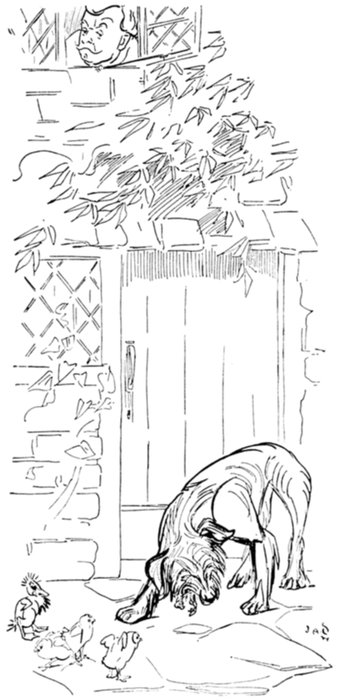
GULP! THE MYSTERY SOLVED.
That day Mr. Williams took particular care to move the chickens near him as he lay by his kennel, and to watch. But, no—the cunning rascal would take no notice of them at all. They ran and tumbled all about him, but he let them run. He was a hypocrite, consummate and proved, and he left the farm that evening.

From the Italian of Luigi Capuana.
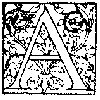
A thousand years ago there lived a King and a Queen. They had only one daughter, who was dearer to them than all the world. Now, when the King of France sent to their Court to request the hand of the Princess, neither father nor mother would part from their beloved daughter, and they said to the Ambassador: "She is still too young!"
But as the girl became every day more beautiful, the next year the King of Spain's Ambassador appeared to request the girl's hand for his Sovereign. And again the parents answered: "She is still too young!"
Both the Kings were very angry at this refusal, and resolved to revenge themselves on the poor Princess.
As they were not able themselves to carry out their wicked resolve, they summoned a Magician and said to him: "You must devise for us some charm to be used against the Princess—and the worse it is the greater shall be your reward!"
With the words, "In one month your wish shall be fulfilled!" the Magician departed.
Before the four weeks were over, he appeared again in the castle of the King of Spain.
"Your Majesty, here is the charm!" he cried. "Give her this ring as a present, and when she has worn it on her finger for four-and-twenty hours, you shall see the effect!"
Now the two Kings consulted together as to how they should get the ring to the Princess. For they were no longer friendly with her parents, who would, consequently, become suspicious of any present sent by them. What was to be done?
"I have it! I have it!" the King of Spain cried, suddenly.
Then he disguised himself as a goldsmith, set out on a journey, and took up his position just opposite the palace where the Princess lived. The Queen noticed him from her window, and as she happened at that time to be wanting to buy some jewellery she sent for him. After she had bought from the stranger various bracelets, chains, and earrings, she said to her daughter:—
"And you will not choose anything among[Pg 109] all these fine things for yourself, little daughter?"
Then the Princess answered, "I see nothing especially beautiful among them."
Then the disguised King took the ring out of its case, which he had up to the present kept hidden, made it sparkle in the sun, and said: "Your Majesty, here is still a very rare jewel; this ring has not its equal in the world for beauty. And it does not please you?"
"Oh, how splendid! Oh, how beautifully it sparkles and gleams!" cried the Princess, entranced. "How much does it cost?"
"The ring has no price; I shall be contented with whatever you give me for it."
Then a great sum of money was paid to him, and he went his way. The Princess put the ring on her finger, and could not turn her eyes away from it, so charmed was she with its brilliancy. But four-and-twenty hours had not passed—it was just evening—when the poor girl uttered a terrible cry of anguish.
"Oh, dear! oh, dear!" sounded through the whole palace.
The King, the Queen, and all the ladies of the Court ran, white with terror, and with candles in their hands, to see what had happened.
"Take away your candles! Take them away! Take them away!" cried the Princess, beside herself with despair. "Do you not see that I have turned into cotton-wool?"
And her body had, indeed, suddenly changed into cotton-wool. The King and Queen were inconsolable at this terrible misfortune, and they at once summoned the wisest men of the kingdom to consult with them as to what was to be done in this extremity.
"Your Majesties," the councillors concluded, after long deliberation, "have it proclaimed in all countries that whoever restores your daughter may wed her."
And then messengers with drums and trumpets went round the whole kingdom and far beyond it, and proclaimed:—
"He who restores the Princess to health may become the King's son-in-law."

"THE PROCLAMATION."
About this time there lived in a small town the son of a shoemaker. There was great want in his father's house, and one day, when not even a crust of bread remained, and both would have had to die of hunger, the son said, "Father, give me your blessing; I will go out into the world to seek my fortune."
"May Heaven be gracious to you, my son!" said the father, and the youth took his staff and set out on his journey.
He had already left the fields of his native district far behind him when he met a band of rough boys, who were making a fearful uproar and throwing stones at a toad to kill it.
"What harm has the poor animal done you? Is it not as much God's creature as you are? Let it live!" he exclaimed,[Pg 110] indignantly. But when he saw that the hard-hearted fellows paid no attention to his words and did not desist from their intention, he rushed angrily at them and gave one a sound box on the ears, and another a mighty punch in his ribs. The boys scattered in a tumult, and the toad quickly used the opportunity to slip into a hole in the wall.
Then the youth went farther and farther on his way. Suddenly the sound of trumpets and the roll of drums came to his ear. And listen! Is not some proclamation being made? He listened attentively and distinctly heard the words: "He who restores the Princess to health may become the King's son-in-law!"
"What is the matter with her?" he asked a passer-by.
"Don't you know? She has turned into cotton-wool."
He thanked his informant and continued his travels. Now, by the time night had sunk upon the earth, he had come to a great desert, and he determined to lay himself down to sleep. But how terrified he was when, on turning his head to look once again at the way he had come, he saw a tall, beautiful woman standing at his side.
He was about to spring quickly away when she said, "Do not be afraid of me. I am a Fairy, and have come to thank you."
"To thank me? And what for?" the youth asked, in confusion.
"You saved my life! My fate ordains that I shall be a toad by day and a fairy by night. Now, I am at your service."
"Good Fairy," then said the youth, "I have just heard of a Princess who has turned into cotton-wool, and whoever heals her may become her husband. Teach me how to restore her to health. That is my most ardent wish!"
Then the Fairy said, "Take this sword in your hand and walk straight on until you come to a dense forest, full of snakes and wild animals. However, you must not be afraid of them, but must bravely continue your journey until you stand in front of the Magician's palace. As soon as you have reached it, knock three times at the great gate...." And she described to him fully what he was to do.
"If you ever need my help, come to this place at this same hour, and you will find me here!" and giving him her white hand in farewell, she disappeared before the youth could open his mouth to thank her.
Without pausing to consider, the cobbler's son set out and went straight on, according to his instructions. He had already gone a good way when his path led him into a dark forest, into the midst of wild animals. That was awful! They filled the air with fearful roars, gnashed their teeth bloodthirstily, and hungrily opened their jaws. Though the poor youth's heart thumped, he went straight on, making as if he did not notice them. At last he reached the Magician's palace, and knocked three times at the great gate.

"THE MAGICIAN, IN A GREAT FURY, RUSHED OUT."
Then a voice came from the interior of the castle: "Woe to you, rash stranger, who have the boldness to come to me! What is your wish?"
"If you really are the Magician, come out and fight with me!" cried the youth.
The Magician, in a great fury at this audacity, rushed out, armed to the teeth, to accept the challenge. But as soon as he saw the sword in the youth's hand, he broke out into pitiable lamentation, and, sinking trembling on to his knees, cried:—
"Oh, woe to me, unfortunate creature that I am! At least spare my life!"
Then the youth said: "If you will release the Princess from the spell your life shall be spared."
Then the Magician took a ring out of his pocket and said: "Take this ring and put it on the little finger of her left hand and she shall be well again."
Not a little rejoiced at the success of his journey, the youth hastened to the King and asked, just to satisfy himself of the truth of what he had been told: "Your Majesty, is it true that he who restores the Princess to health will be your son-in-law?"

"THE POOR PRINCESS BURST INTO FLAME."
"It is verily true!" the anxious King assured him.
"Well then, I am ready to accomplish the task!"
Then the poor Princess was brought in, and all the ladies of the Court, as well as the servants, stood round her to witness the miracle.
But no sooner had she put the ring on her little finger than she burst into bright flame and stood there, uttering heartrending cries. Everything was plunged into confusion, and the horrified youth seized the opportunity of escaping from the scene of the disaster as fast as his legs would carry him. His one wish was to get to the Fairy, and he did not stop running until he had come to the place where he had seen her the first time.
"Fairy, where are you?" he cried, all in a tremble.
"I am at your service," was the answer.
Then he told the Fairy of the misfortune which had happened to him.
"You have allowed yourself to be deceived! Take this dagger and go again to the Magician. See that he does not fool you this time!"
Then she gave him all sorts of good advice for his dangerous journey and bestowed on him her blessing. Arrived at the great gate of the palace, he knocked three times. Then the Magician cried, as before: "Woe to you, bold stranger! What is your wish?"
"If you are really the Magician, you are to fight with me!"
The Magician, armed to his teeth, came rushing out, in a rage. But when he saw the dagger he sank trembling on his knees, and begged piteously: "Oh, spare my life."
"Good-for-nothing Magician!" the youth cried, angrily; "you have deceived me! Now I will keep you in chains until the Princess is freed from the spell!"
Then he put him in chains, stuck the dagger into the earth, and fastened the chain to it so that the Magician could not move.
"You are mightier than I! Now I realize it!" cried the enchained Magician, gnashing his teeth. "Take the goldsmith's ring from the Princess's finger, and she will be released from the spell."
Not until the youth had learnt that the Princess had escaped with only a few burns on her hands, owing to the promptness of the bystanders in extinguishing the flames, did he summon up enough courage to appear before the King again.
"Your Majesty, I implore your pardon!" he said. "The treacherous Magician, not I, was the cause of the disaster. Now I have completely overcome him, and my remedy will succeed. I have only to draw the goldsmith's ring from your daughter's finger and she will be all right again."
And so it happened. As soon as the ring was taken off, the Princess at once changed back to what she had been before. But who would believe it to be possible? Her tongue, eyes, and ears were missing; they had been consumed by the flames! The youth's perplexity at this new disaster was indescribable. Again he applied to his guardian Fairy for help.
"You have let him make a fool of you a second time!" she said, again giving him advice, to help him towards the fulfilment of his wish of becoming the King's son-in-law.
When he came to the Magician he shouted at him: "You miserable deceiver! Now my patience is at an end! But eye for eye, tongue for tongue, ear for ear!"
With these words he seized the Magician to strangle him.
But the latter cried, in the utmost peril of death: "Have mercy! Have mercy! Let me live! Go to my sisters, who live a little farther back than this."
Then he gave him the necessary directions so that he might find the way there without delay, and also the magic word which he had to pronounce at the gate. After some hours he came to the gate of a palace, which was in every respect like that of the Magician. He knocked, and in answer to the question, "Who are you, and what do you want here?" he answered, "I want the little gold horn."
"I perceive that my brother has sent you to me. What does he want of me?"
"He wants a little piece of red cloth; he has torn a hole in his cloak."
"Here's a piece, and now get you gone from here!" a woman in the palace cried angrily, at the same time throwing into his opened hands a little piece of red cloth, which she had cut in the shape of a tongue.
He journeyed on for several hours, and at last came to the foot of a high mountain. On a spur of rock was a castle, which looked exactly like that of the Magician. Then he knocked at the great gate, and a voice came from the interior, saying, "Who are you, and what is your desire?"
"I want the little gold hand."
"That's all right. I perceive that my brother has sent you. What does he want from me?"
"He wants two lentil-grains for soup."
"What rubbish! Here, take them and make yourself scarce!"
Then the owner of the castle threw him two little lentil-grains, wrapped in a piece of paper, and noisily closed the window.
At last he came to a wide plain, in the middle of which a castle exactly like the Magician's was built. When he knocked he was asked what he wanted, and answered: "I want the little gold foot."

"THE OWNER OF THE CASTLE THREW HIM TWO LITTLE LENTIL-GRAINS."
"Ah! my brother has sent you to me! And what does he wish from me?"
"He wishes you to send him two snails for his supper."
"Here they are, but now leave me in peace!" a woman called out, ungraciously, from the window, at the same time throwing him the two snails he desired.
Now the youth returned with the things he had collected to the Magician, and said: "Here I bring you what you wished for."
Then the Magician gave him all the necessary instructions as to the use of the three things. But when the youth turned his back to go away, the captive cried, imploringly, "And you are going to leave me lying here?"
"It would be no more than you deserve. However, I will release you. But woe betide you if you have deceived me again."
After the youth had released the Magician from his chains, he hurried away to appear before the Princess.
Opening her mouth, he put in it the little piece of red stuff which he had brought with him, and she at once had a tongue.
But the first words which came from her mouth were: "Miserable cobbler! Out of my sight! Begone!"
The poor youth was motionless with painful amazement, and said to himself: "This is once more the work of the faithless Magician."
But he would not let this bitter ingratitude prevent him from completing the good work. Then, taking the two little lentil-grains, he put them into the blind pupils of the girl's eyes, and at once she was able to see as before. But no sooner had she turned her eyes upon him than she covered her face with her hands and cried, scornfully, "Oh, how ugly mankind is! How horribly ugly!"
The poor youth's courage nearly vanished, and again he said to himself, "The worthless Magician has done this for me!"
But he would not allow himself to be put out. Taking the empty snail-shells from his pocket, he put them very skilfully where the girl's ears had once been, and behold! the Princess had back again her sweet little ears.
Then the youth turned to the King and said, "Your Majesty, now I am your son-in-law!"
But when the Princess heard these words she began to weep like a spoilt child, sobbing, "He called me a witch! He said I was an old witch!"
That was too much ingratitude for the poor youth. Without saying a word, he hurriedly left the castle, to seek out his Fairy.
"Fairy, where are you?" he cried, still trembling with anger and vexation.
"I am at your service."
Then he told her how shamefully he had been treated by the Princess, who was now restored to health.
The Fairy said, laughing: "You probably forgot to take the Magician's other ring from her little finger?"
"Oh, dear! I did not think of that in my confusion," exclaimed the youth, seizing his head between his two hands in mingled terror and shame.
"Now hasten and repair the mistake!" advised the Fairy.
Sooner than he had thought possible, he was standing in front of the Princess and drew the evil ring from her little finger. Then a lovely smile spread over her beautiful features, and she thanked him so sweetly and kindly that he became red with embarrassment.
Then the King said, solemnly: "This is your husband."
And the youth and the Princess embraced one another in the sight of all, and a few days afterwards the wedding was celebrated.
By J. H. Barker.

Life on board one of the large liners which run from Southampton or London to the Cape is almost ideal. After the first week of the trip, calm seas and glorious sunshine are experienced, and on board we are free from the rush of business life, and can laze away our time to our heart's content. No letters to be looked through, no clients or customers to interview, and no morning paper to read. If that is not a holiday, what is?
For certain reasons, the first part of the voyage is not so enjoyable to some as to others, for the Bay of Biscay has a very bad name, and although it may be a bugbear whose growl is often worse than its bite, nevertheless, it sometimes acts up to its reputation. However, when Madeira is past, all thoughts of mal de mer are put aside, everyone begins to take a fresh interest in the trip, and things in general begin to "brighten up." Deck chairs are placed in the shady parts of the deck, and we recline in comfort and talk scandal (for scandal is talked even on board), read novels and smoke.
Soon after "The Canaries" are left behind, however, a committee is formed, and a programme of sports and entertainments drawn up, to enliven the remaining fortnight of the voyage. There are cricket for the more energetic, bull-board, quoits, sports, concerts, dances (including a fancy dress ball), etc., in which everyone takes part, and a good time is provided for one and all.
But life at sea, as on land, is not all sunshine and happiness, and I shall ever remember a certain lovely hot morning in December, when we were still nine or ten days' sail from Cape Town, and those of us who cared for the luxury were having beef-tea and biscuits in the saloon, when the captain's clerk came in, and said: "There's to be a funeral this afternoon at four o'clock."
I can never forget the change that came over the company. It seemed as though a thunderbolt had fallen. A few minutes before we had all been talking of the various amusements which were to take place during the day, and no thought, except of pleasure, had entered our minds.
"Who is dead?" we asked, and were told that a steerage passenger had died of consumption.
There were no games that day: it seemed as though the life on board had completely changed.

BRINGING THE BODY ON DECK.
From a Photograph.
At four o'clock nearly all the passengers came on deck to attend the funeral. The ceremony was to take place in the "after-well" of the vessel, the lower deck being kept for the officers and men who were to take part in the service. The "gangway" was taken down, everything prepared, the engines slowed down, and the body was borne out on to the deck by the "bosun" and three of his men, and placed near the side of the vessel.
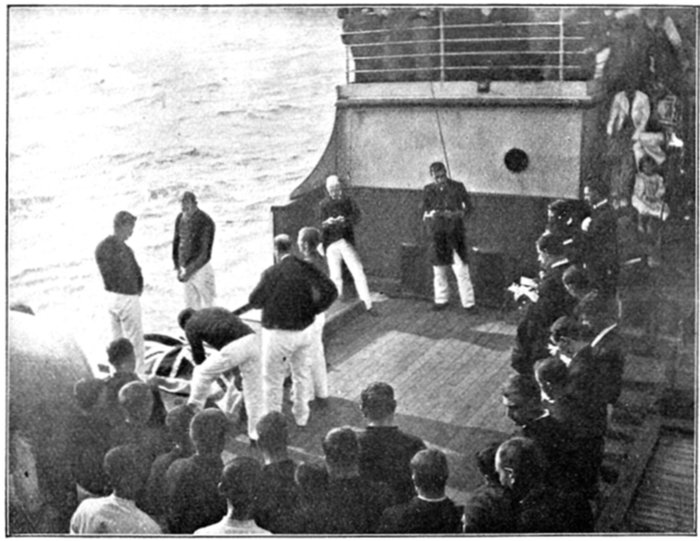
DURING THE BURIAL SERVICE.
From a Photograph.
At sea the body is sewn up in a canvas sack, which is heavily weighted at the foot, and this is laid on a "coaming" (a part of one of the hatches), which takes the place of a bier. The whole is covered with a Union Jack, which is fastened to the four corners of the "coaming," so that when the time comes to commit the body to the deep the one end of the "coaming" is raised and the body slips off into the water, leaving the flag in its place.
The captain and first officer read the burial service between them, the other officers and men joining in the responses.
Never have I heard the service read more impressively than it was that December day, and during parts of the reading there were few dry eyes to be seen amongst the passengers. The beautiful words are impressive at any time, but at sea their beauty is magnified a hundredfold.
A few minutes after the service had commenced, at a signal from the first officer, the engines were stopped altogether, and then there was absolute stillness and silence, broken only by the voice of the captain and the ripple of the water as the ship still moved along her way.
"We, therefore, commit her body to the deep...." and at these words the men who had stood by the "coaming" on which the body rested raised it gently up, there was a dull splash, and the body sank to rise no more, until the great day when the deep shall give up her dead.
Everything was done in the most reverent spirit, and when at the close of the service the engines were again put full steam ahead, the "gangway" closed up, and the ordinary routine of ship-life resumed, I could not help thinking that there is something very grand in having the profound sea for a tomb. God seemed nearer in that solitude than in the crowded city.
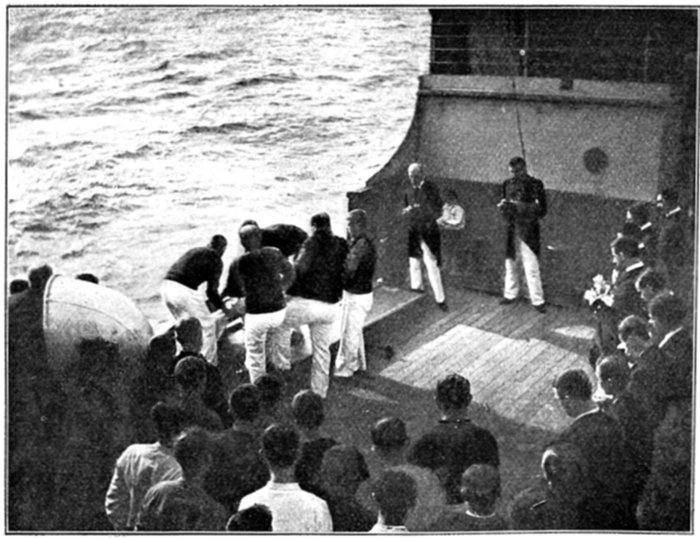
ALLOWING THE BODY TO SLIDE INTO THE SEA.
From a Photograph.
As I was going down to my cabin a little later I met one of the officers, who[Pg 116] said, "Not been taking the funeral, have you?"
"Yes," I replied.
"Well, it's your own look-out, and you have to take the risk yourself."
A little farther down I came across one of the engineers, and he asked me the same question. I told him I had taken a few snap-shots, and he said, "You have? I wouldn't have done it for anything you could have given me."
"Why not?" I asked.
"Don't you know that to photograph a funeral on board ship is about the most unlucky thing you could do? Anyhow, it's your own risk, so it does not matter to me. Still, I would not take such a risk myself."
Not being superstitious, no harm accrued from my daring.
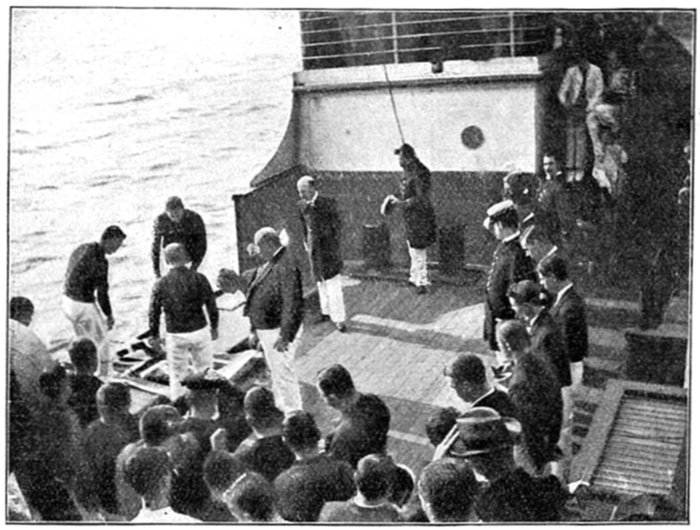
SHOWING THE FLAG LEFT BEHIND, AFTER THE BODY HAS GONE.
From a Photograph.
Gradually we got back again to our usual life on board, and to our games and frivolities; and by a few, perhaps, the solemn act of burying the dead had been forgotten ere we gained our first view of the beautiful Table Bay, with the picturesque town and grand Table Mountain in the background, but on some of us, I feel sure, it will have a lasting influence.
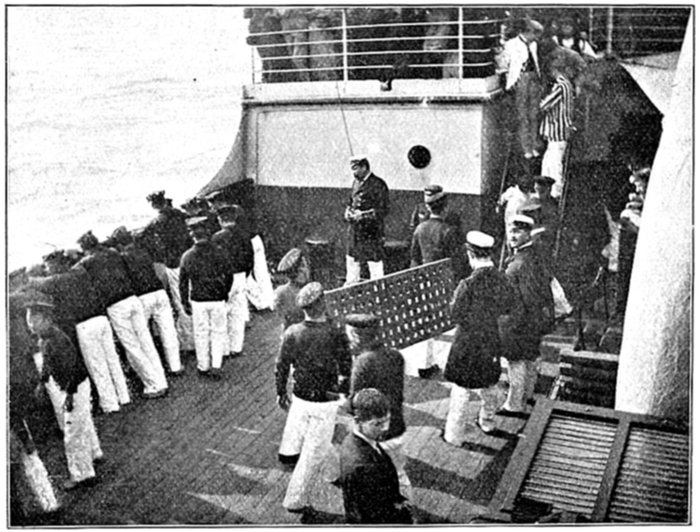
AT THE CLOSE OF THE SERVICE.
From a Photograph.
[We shall be glad to receive Contributions to this section, and to pay for such as are accepted.]
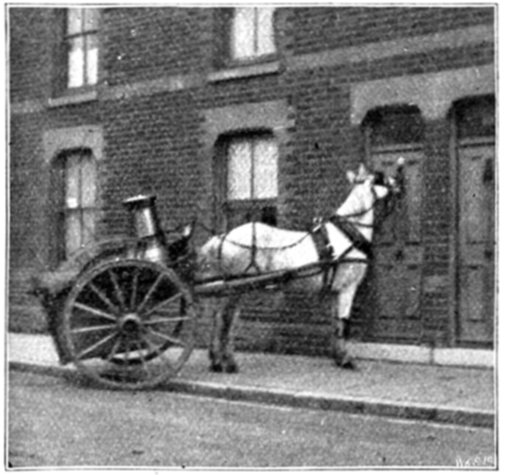
The accompanying photo. depicts an incident which, says the sender, Mr. Herbert S. Sellars, of 25, Hertslet Road, Seven Sisters Road, Holloway, N., may be witnessed any afternoon at Torton, near Gosport, Hants. "Tom," the subject of the photo., is the property of a dairyman well known in that district. Whilst going the rounds, certain lady customers have been in the habit of giving the horse bread. Preceding his master, and arriving at the houses of these good friends, he draws his float up on to the pavement, and then knocks at the door by raising the knocker with his mouth, and then letting it drop again. This he continues to do till the door is opened, when he receives his well-earned reward.
[2] Copyright, 1899, by George Newnes, Limited.
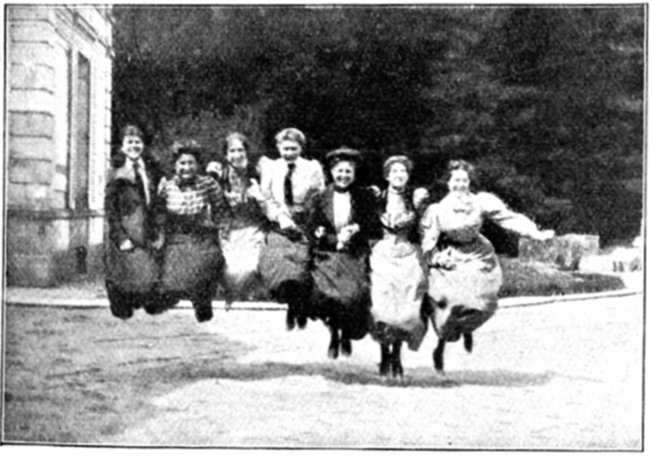
Here we have a group of merry-faced schoolgirls indulging in a jump arm-in-arm together, and the snap-shot gives us a very vivid idea of the almost incredible positions assumed by the limbs and body under such circumstances. The four girls on the left apparently led off, and seem to be quite complacently perched in mid-air, but the trio on the right are decidedly unsteady in their alignment, whilst the young maid on the extreme flank is quite distressed in her uncertainty. The photograph was taken at the château of the Marquise San Carlos, near Paris, by Miss Lilian Noble, of Slissinghurst Grange, Cranbrook.
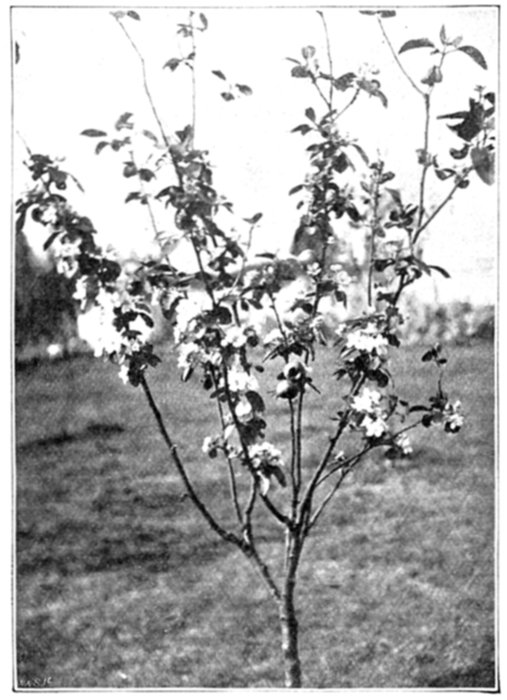
From a Photo. by R. W. Fisk, Rickmansworth.
The photograph here reproduced shows a very unique freak of Nature. It represents an apple tree that was growing on October 12th last in Mr. Blake's garden, the Metropolitan Station-master at Rickmansworth (Herts), and its point of interest lies in the fact that although the tree is still in full blossom there are several ripe apples upon it at the same time. There were several dozen other similar trees of the same age in the garden, but this is the only one that bore blossom and fruit at the same time. The photograph was sent in by Mr. R. W. Fisk, of Rickmansworth.
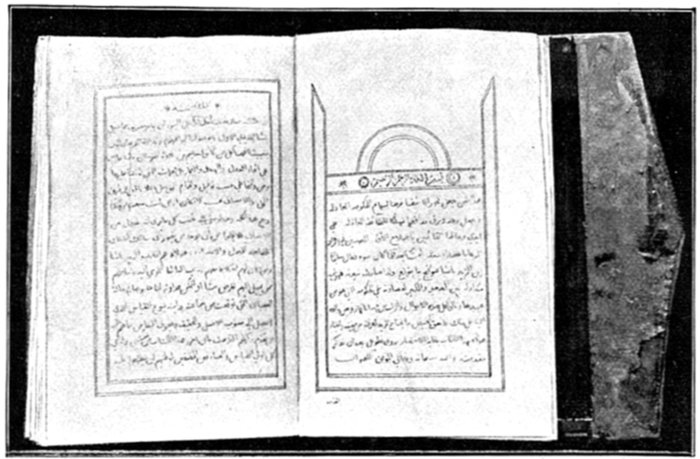
With the Soudan reconquered and Khartoum itself fast reassuming that civilizing influence amongst the tribes of the Upper Nile that General Gordon sacrificed so much to accomplish, added interest has been taken in Gordon relics of late. The accompanying photograph represents a book that was printed for the General in Khartoum, and was highly treasured by him on account of it being the first book ever printed there. The relic is now in the safe keeping of the British Museum, where it is open to public inspection. The text, by the way, is in Arabic.
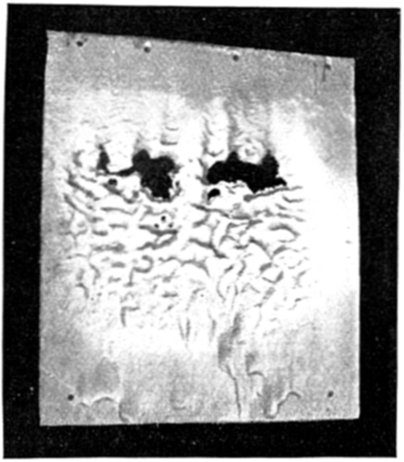
Amongst the curiosities of The Strand a few months ago we gave an illustration of a section of a board taken from a wheat trough, worn by wheat passing over it. Here is a photograph, sent in by Mr. Byron Harman, of the Tacoma Grain Company, Washington, showing a steel-plate, 4ft. square and ½in. thick, taken from a large elevator at Tacoma, that has actually had holes worn through it by wheat continually falling on it from a height of 4ft.
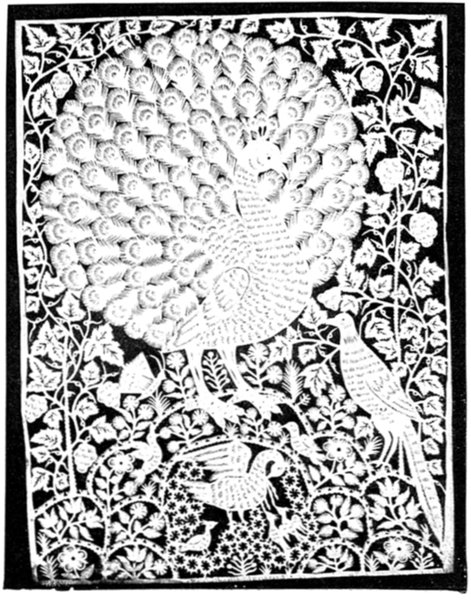
It is well known that experiments with paper and a pair of scissors are often productive of the most wonderful results, but the design reproduced in the accompanying photograph is perhaps one of the most remarkable obtained under such conditions, and it has the additional novelty of having been cut out by an old lady of feeble sight. The original paper design was sent to us by Mr. M. A. Holmes, of 3, Alma Road, Canonbury, and the reproduction presented in these pages is from a photograph of it taken by us.
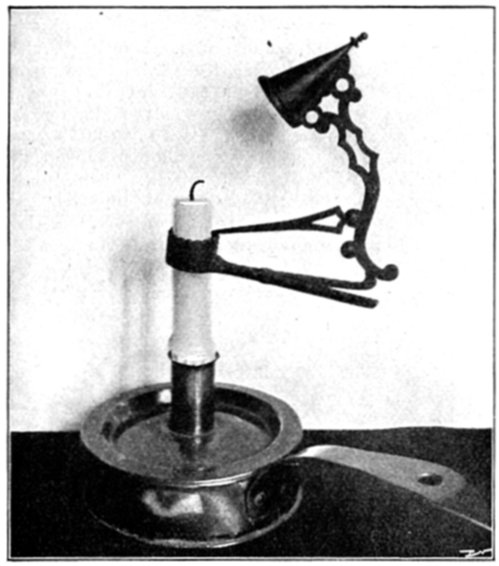
Mr. D. H. W. Broad, of 18, Beatrice Road, Stroud Green, N., the sender of this photograph, writes that it represents a curious piece of old ironwork which has recently come into his possession. It slips, he says, on to a candle, the spike in the middle going into the wax at any place you like to adjust it. The object is apparently to automatically extinguish the candle, should the sleeper leave it alight on retiring. When the wax is burnt away the spike is released, thus bringing down the extinguisher. The candle in the photo. is standing in an old brass tinder-box.
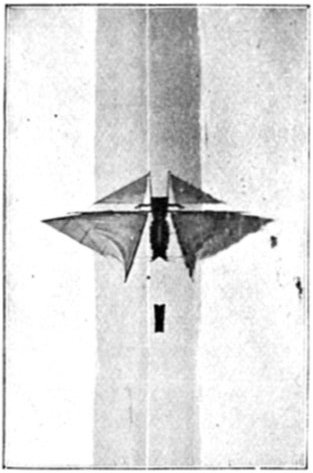
This little snap-shot requires quite an amount of scrutiny to decipher. It has been sent in by Mr. Andrew E. Pearson, of 8, Cobden Road, Newington, Edinburgh, who took it on the Gareloch, at Shandon, in August last. It represents a sailing yacht travelling from left to right, and throwing shadows so remarkably well defined that if the picture be turned upside down it appears almost the same. When turned end on—as it now stands—it might be mistaken for a bat or a butterfly, or even a moth. Being reversed again, curiously enough it still retains the same likeness.
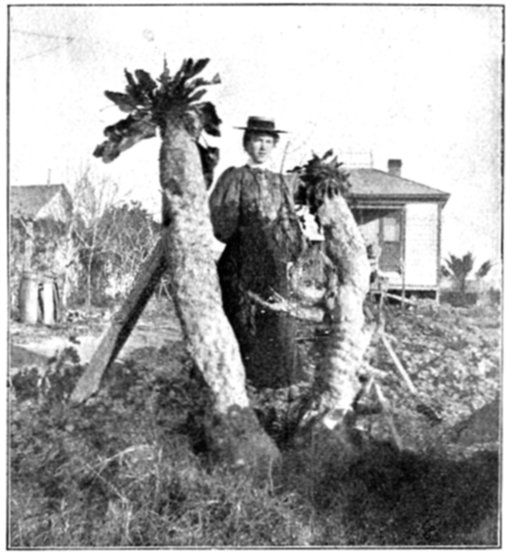
This photograph, sent in by Mr. H. Clifford, of 236, 52nd Street, Brooklyn, New York, shows how they grow beetroots in California. The largest of the two roots displayed is over 5ft. in height, as may be estimated by comparison with the young lady standing alongside it, and it is estimated that it will tip the beam at over 200lb. Beetroots of this size are naturally not quite so tender as the smaller kind one is accustomed to receive at table; in fact, in order to slice them it might be necessary to use an axe or a circular saw. Mr. Boker, who grew these, says that there need be no fear of any denudation of our forests, as he can raise a good-sized one underground in the course of a season.
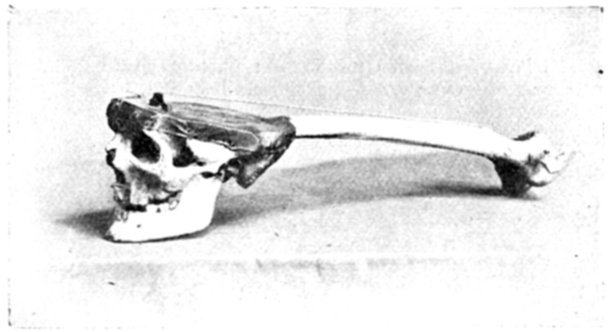
From a Photo. by Hellis & Sons.
That music hath charms may undoubtedly be true, but it is difficult to understand how one could enjoy the harmony, however dulcet it might be, evolved from such an instrument as is shown in the above photograph. It consists of the major portion of a human skull, over which is stretched a sheet of sheep's skin for sounding-board; portion of the leg-bone as key-board, with bits of the small bones of the arms for keys. This curiosity belongs to Mr. A. I. J. Harwood, of 87, Park Street, Camden Town, N.W., and was sent to him as a native product from Durban, South Africa, on July 5th last, by Mr. C. Wilson.
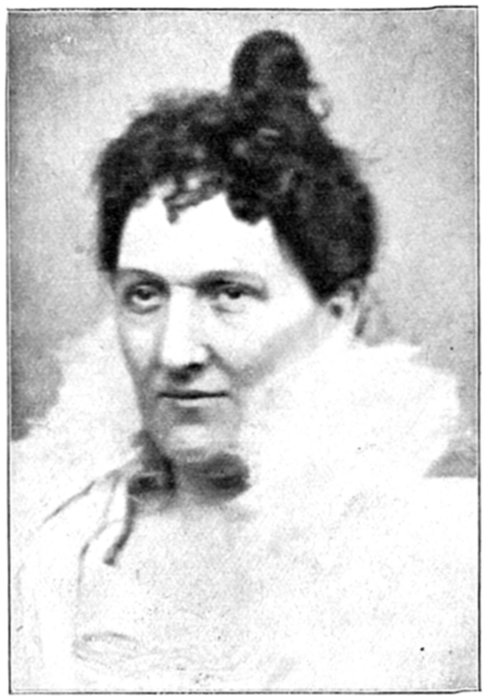
Certainly a very unlooked-for effect is to be found in the photograph of the lady's face here reproduced, which has been sent in by Mr. Edward Duxfield, of Eton House, Basford, Stoke-on-Trent. On holding the picture upside down another face may be distinctly traced, whose presence is purely the result of certain combined shaded effects. The mouth is the same in both faces. The photo, was taken in the garden about mid-day.
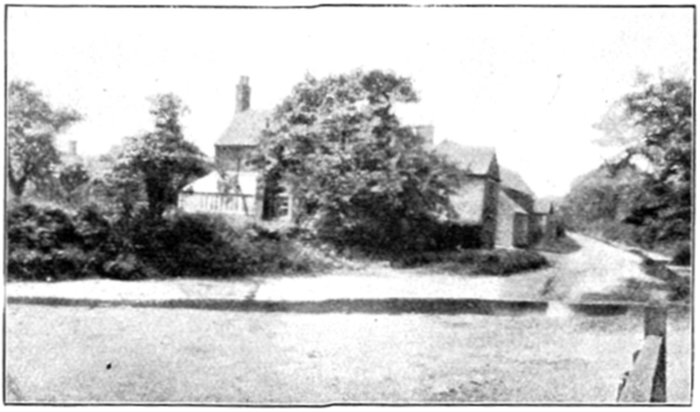
The interest attached to the next photograph we reproduce does not lie in the subject illustrated, but in the fact that it was taken by a very primitive sort of camera, made out of an old cigar-box, with a pill-box pierced at one end by a pin prick instead of a lens, the lid of the pill-box being retained as the cap. At the back of the camera was an arrangement for the reception of the plate, and the whole was enveloped in cloth. This novel apparatus was made by the thirteen-year-old son of Mrs. C. L. Taylor, of 40, Nichols Street, West Bromwich, who forwarded it for our inspection.
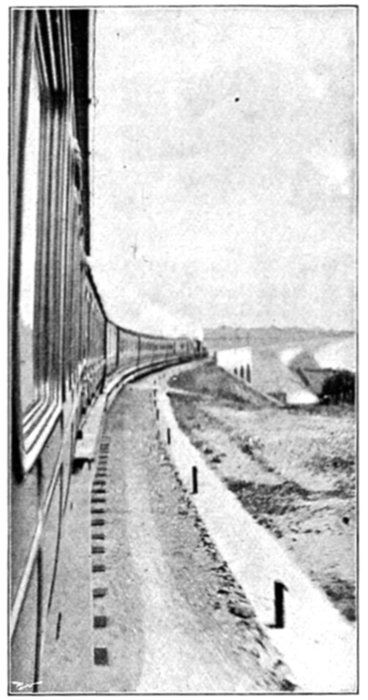
A very curious study in perspective is afforded by our next photograph, which was taken by Mr. E. Ford, of Bridge Place, Bexley, Kent, whilst leaning out of a railway carriage window in the rear part of a train. A curve was being rounded just at the moment the snap-shot was taken, and in the distance the locomotives may be seen just about to pass over one of the newly built granite bridges in Cornwall. Owing to the hilly nature of the country, all the main line trains are drawn by two engines. Mr. Ford says that they were travelling at the rate of about thirty miles when he took the photograph.
Table of contents added by transcriber.
P. 3 added missing footnote anchor.
Silently corrected simple spelling, grammar, and typographical errors.
Retained anachronistic and non-standard spellings as printed.
End of the Project Gutenberg EBook of The Strand Magazine No. 97 (January,
1899), by Various
*** END OF THIS PROJECT GUTENBERG EBOOK STRAND MAGAZINE NO. 97 (JAN, 1899) ***
***** This file should be named 48729-h.htm or 48729-h.zip *****
This and all associated files of various formats will be found in:
http://www.gutenberg.org/4/8/7/2/48729/
Produced by Richard Tonsing, Jonathan Ingram, Maria Grist
and the Online Distributed Proofreading Team at
http://www.pgdp.net
Updated editions will replace the previous one--the old editions will
be renamed.
Creating the works from print editions not protected by U.S. copyright
law means that no one owns a United States copyright in these works,
so the Foundation (and you!) can copy and distribute it in the United
States without permission and without paying copyright
royalties. Special rules, set forth in the General Terms of Use part
of this license, apply to copying and distributing Project
Gutenberg-tm electronic works to protect the PROJECT GUTENBERG-tm
concept and trademark. Project Gutenberg is a registered trademark,
and may not be used if you charge for the eBooks, unless you receive
specific permission. If you do not charge anything for copies of this
eBook, complying with the rules is very easy. You may use this eBook
for nearly any purpose such as creation of derivative works, reports,
performances and research. They may be modified and printed and given
away--you may do practically ANYTHING in the United States with eBooks
not protected by U.S. copyright law. Redistribution is subject to the
trademark license, especially commercial redistribution.
START: FULL LICENSE
THE FULL PROJECT GUTENBERG LICENSE
PLEASE READ THIS BEFORE YOU DISTRIBUTE OR USE THIS WORK
To protect the Project Gutenberg-tm mission of promoting the free
distribution of electronic works, by using or distributing this work
(or any other work associated in any way with the phrase "Project
Gutenberg"), you agree to comply with all the terms of the Full
Project Gutenberg-tm License available with this file or online at
www.gutenberg.org/license.
Section 1. General Terms of Use and Redistributing Project
Gutenberg-tm electronic works
1.A. By reading or using any part of this Project Gutenberg-tm
electronic work, you indicate that you have read, understand, agree to
and accept all the terms of this license and intellectual property
(trademark/copyright) agreement. If you do not agree to abide by all
the terms of this agreement, you must cease using and return or
destroy all copies of Project Gutenberg-tm electronic works in your
possession. If you paid a fee for obtaining a copy of or access to a
Project Gutenberg-tm electronic work and you do not agree to be bound
by the terms of this agreement, you may obtain a refund from the
person or entity to whom you paid the fee as set forth in paragraph
1.E.8.
1.B. "Project Gutenberg" is a registered trademark. It may only be
used on or associated in any way with an electronic work by people who
agree to be bound by the terms of this agreement. There are a few
things that you can do with most Project Gutenberg-tm electronic works
even without complying with the full terms of this agreement. See
paragraph 1.C below. There are a lot of things you can do with Project
Gutenberg-tm electronic works if you follow the terms of this
agreement and help preserve free future access to Project Gutenberg-tm
electronic works. See paragraph 1.E below.
1.C. The Project Gutenberg Literary Archive Foundation ("the
Foundation" or PGLAF), owns a compilation copyright in the collection
of Project Gutenberg-tm electronic works. Nearly all the individual
works in the collection are in the public domain in the United
States. If an individual work is unprotected by copyright law in the
United States and you are located in the United States, we do not
claim a right to prevent you from copying, distributing, performing,
displaying or creating derivative works based on the work as long as
all references to Project Gutenberg are removed. Of course, we hope
that you will support the Project Gutenberg-tm mission of promoting
free access to electronic works by freely sharing Project Gutenberg-tm
works in compliance with the terms of this agreement for keeping the
Project Gutenberg-tm name associated with the work. You can easily
comply with the terms of this agreement by keeping this work in the
same format with its attached full Project Gutenberg-tm License when
you share it without charge with others.
1.D. The copyright laws of the place where you are located also govern
what you can do with this work. Copyright laws in most countries are
in a constant state of change. If you are outside the United States,
check the laws of your country in addition to the terms of this
agreement before downloading, copying, displaying, performing,
distributing or creating derivative works based on this work or any
other Project Gutenberg-tm work. The Foundation makes no
representations concerning the copyright status of any work in any
country outside the United States.
1.E. Unless you have removed all references to Project Gutenberg:
1.E.1. The following sentence, with active links to, or other
immediate access to, the full Project Gutenberg-tm License must appear
prominently whenever any copy of a Project Gutenberg-tm work (any work
on which the phrase "Project Gutenberg" appears, or with which the
phrase "Project Gutenberg" is associated) is accessed, displayed,
performed, viewed, copied or distributed:
This eBook is for the use of anyone anywhere in the United States and
most other parts of the world at no cost and with almost no
restrictions whatsoever. You may copy it, give it away or re-use it
under the terms of the Project Gutenberg License included with this
eBook or online at www.gutenberg.org. If you are not located in the
United States, you'll have to check the laws of the country where you
are located before using this ebook.
1.E.2. If an individual Project Gutenberg-tm electronic work is
derived from texts not protected by U.S. copyright law (does not
contain a notice indicating that it is posted with permission of the
copyright holder), the work can be copied and distributed to anyone in
the United States without paying any fees or charges. If you are
redistributing or providing access to a work with the phrase "Project
Gutenberg" associated with or appearing on the work, you must comply
either with the requirements of paragraphs 1.E.1 through 1.E.7 or
obtain permission for the use of the work and the Project Gutenberg-tm
trademark as set forth in paragraphs 1.E.8 or 1.E.9.
1.E.3. If an individual Project Gutenberg-tm electronic work is posted
with the permission of the copyright holder, your use and distribution
must comply with both paragraphs 1.E.1 through 1.E.7 and any
additional terms imposed by the copyright holder. Additional terms
will be linked to the Project Gutenberg-tm License for all works
posted with the permission of the copyright holder found at the
beginning of this work.
1.E.4. Do not unlink or detach or remove the full Project Gutenberg-tm
License terms from this work, or any files containing a part of this
work or any other work associated with Project Gutenberg-tm.
1.E.5. Do not copy, display, perform, distribute or redistribute this
electronic work, or any part of this electronic work, without
prominently displaying the sentence set forth in paragraph 1.E.1 with
active links or immediate access to the full terms of the Project
Gutenberg-tm License.
1.E.6. You may convert to and distribute this work in any binary,
compressed, marked up, nonproprietary or proprietary form, including
any word processing or hypertext form. However, if you provide access
to or distribute copies of a Project Gutenberg-tm work in a format
other than "Plain Vanilla ASCII" or other format used in the official
version posted on the official Project Gutenberg-tm web site
(www.gutenberg.org), you must, at no additional cost, fee or expense
to the user, provide a copy, a means of exporting a copy, or a means
of obtaining a copy upon request, of the work in its original "Plain
Vanilla ASCII" or other form. Any alternate format must include the
full Project Gutenberg-tm License as specified in paragraph 1.E.1.
1.E.7. Do not charge a fee for access to, viewing, displaying,
performing, copying or distributing any Project Gutenberg-tm works
unless you comply with paragraph 1.E.8 or 1.E.9.
1.E.8. You may charge a reasonable fee for copies of or providing
access to or distributing Project Gutenberg-tm electronic works
provided that
* You pay a royalty fee of 20% of the gross profits you derive from
the use of Project Gutenberg-tm works calculated using the method
you already use to calculate your applicable taxes. The fee is owed
to the owner of the Project Gutenberg-tm trademark, but he has
agreed to donate royalties under this paragraph to the Project
Gutenberg Literary Archive Foundation. Royalty payments must be paid
within 60 days following each date on which you prepare (or are
legally required to prepare) your periodic tax returns. Royalty
payments should be clearly marked as such and sent to the Project
Gutenberg Literary Archive Foundation at the address specified in
Section 4, "Information about donations to the Project Gutenberg
Literary Archive Foundation."
* You provide a full refund of any money paid by a user who notifies
you in writing (or by e-mail) within 30 days of receipt that s/he
does not agree to the terms of the full Project Gutenberg-tm
License. You must require such a user to return or destroy all
copies of the works possessed in a physical medium and discontinue
all use of and all access to other copies of Project Gutenberg-tm
works.
* You provide, in accordance with paragraph 1.F.3, a full refund of
any money paid for a work or a replacement copy, if a defect in the
electronic work is discovered and reported to you within 90 days of
receipt of the work.
* You comply with all other terms of this agreement for free
distribution of Project Gutenberg-tm works.
1.E.9. If you wish to charge a fee or distribute a Project
Gutenberg-tm electronic work or group of works on different terms than
are set forth in this agreement, you must obtain permission in writing
from both the Project Gutenberg Literary Archive Foundation and The
Project Gutenberg Trademark LLC, the owner of the Project Gutenberg-tm
trademark. Contact the Foundation as set forth in Section 3 below.
1.F.
1.F.1. Project Gutenberg volunteers and employees expend considerable
effort to identify, do copyright research on, transcribe and proofread
works not protected by U.S. copyright law in creating the Project
Gutenberg-tm collection. Despite these efforts, Project Gutenberg-tm
electronic works, and the medium on which they may be stored, may
contain "Defects," such as, but not limited to, incomplete, inaccurate
or corrupt data, transcription errors, a copyright or other
intellectual property infringement, a defective or damaged disk or
other medium, a computer virus, or computer codes that damage or
cannot be read by your equipment.
1.F.2. LIMITED WARRANTY, DISCLAIMER OF DAMAGES - Except for the "Right
of Replacement or Refund" described in paragraph 1.F.3, the Project
Gutenberg Literary Archive Foundation, the owner of the Project
Gutenberg-tm trademark, and any other party distributing a Project
Gutenberg-tm electronic work under this agreement, disclaim all
liability to you for damages, costs and expenses, including legal
fees. YOU AGREE THAT YOU HAVE NO REMEDIES FOR NEGLIGENCE, STRICT
LIABILITY, BREACH OF WARRANTY OR BREACH OF CONTRACT EXCEPT THOSE
PROVIDED IN PARAGRAPH 1.F.3. YOU AGREE THAT THE FOUNDATION, THE
TRADEMARK OWNER, AND ANY DISTRIBUTOR UNDER THIS AGREEMENT WILL NOT BE
LIABLE TO YOU FOR ACTUAL, DIRECT, INDIRECT, CONSEQUENTIAL, PUNITIVE OR
INCIDENTAL DAMAGES EVEN IF YOU GIVE NOTICE OF THE POSSIBILITY OF SUCH
DAMAGE.
1.F.3. LIMITED RIGHT OF REPLACEMENT OR REFUND - If you discover a
defect in this electronic work within 90 days of receiving it, you can
receive a refund of the money (if any) you paid for it by sending a
written explanation to the person you received the work from. If you
received the work on a physical medium, you must return the medium
with your written explanation. The person or entity that provided you
with the defective work may elect to provide a replacement copy in
lieu of a refund. If you received the work electronically, the person
or entity providing it to you may choose to give you a second
opportunity to receive the work electronically in lieu of a refund. If
the second copy is also defective, you may demand a refund in writing
without further opportunities to fix the problem.
1.F.4. Except for the limited right of replacement or refund set forth
in paragraph 1.F.3, this work is provided to you 'AS-IS', WITH NO
OTHER WARRANTIES OF ANY KIND, EXPRESS OR IMPLIED, INCLUDING BUT NOT
LIMITED TO WARRANTIES OF MERCHANTABILITY OR FITNESS FOR ANY PURPOSE.
1.F.5. Some states do not allow disclaimers of certain implied
warranties or the exclusion or limitation of certain types of
damages. If any disclaimer or limitation set forth in this agreement
violates the law of the state applicable to this agreement, the
agreement shall be interpreted to make the maximum disclaimer or
limitation permitted by the applicable state law. The invalidity or
unenforceability of any provision of this agreement shall not void the
remaining provisions.
1.F.6. INDEMNITY - You agree to indemnify and hold the Foundation, the
trademark owner, any agent or employee of the Foundation, anyone
providing copies of Project Gutenberg-tm electronic works in
accordance with this agreement, and any volunteers associated with the
production, promotion and distribution of Project Gutenberg-tm
electronic works, harmless from all liability, costs and expenses,
including legal fees, that arise directly or indirectly from any of
the following which you do or cause to occur: (a) distribution of this
or any Project Gutenberg-tm work, (b) alteration, modification, or
additions or deletions to any Project Gutenberg-tm work, and (c) any
Defect you cause.
Section 2. Information about the Mission of Project Gutenberg-tm
Project Gutenberg-tm is synonymous with the free distribution of
electronic works in formats readable by the widest variety of
computers including obsolete, old, middle-aged and new computers. It
exists because of the efforts of hundreds of volunteers and donations
from people in all walks of life.
Volunteers and financial support to provide volunteers with the
assistance they need are critical to reaching Project Gutenberg-tm's
goals and ensuring that the Project Gutenberg-tm collection will
remain freely available for generations to come. In 2001, the Project
Gutenberg Literary Archive Foundation was created to provide a secure
and permanent future for Project Gutenberg-tm and future
generations. To learn more about the Project Gutenberg Literary
Archive Foundation and how your efforts and donations can help, see
Sections 3 and 4 and the Foundation information page at
www.gutenberg.org
Section 3. Information about the Project Gutenberg Literary Archive Foundation
The Project Gutenberg Literary Archive Foundation is a non profit
501(c)(3) educational corporation organized under the laws of the
state of Mississippi and granted tax exempt status by the Internal
Revenue Service. The Foundation's EIN or federal tax identification
number is 64-6221541. Contributions to the Project Gutenberg Literary
Archive Foundation are tax deductible to the full extent permitted by
U.S. federal laws and your state's laws.
The Foundation's principal office is in Fairbanks, Alaska, with the
mailing address: PO Box 750175, Fairbanks, AK 99775, but its
volunteers and employees are scattered throughout numerous
locations. Its business office is located at 809 North 1500 West, Salt
Lake City, UT 84116, (801) 596-1887. Email contact links and up to
date contact information can be found at the Foundation's web site and
official page at www.gutenberg.org/contact
For additional contact information:
Dr. Gregory B. Newby
Chief Executive and Director
gbnewby@pglaf.org
Section 4. Information about Donations to the Project Gutenberg
Literary Archive Foundation
Project Gutenberg-tm depends upon and cannot survive without wide
spread public support and donations to carry out its mission of
increasing the number of public domain and licensed works that can be
freely distributed in machine readable form accessible by the widest
array of equipment including outdated equipment. Many small donations
($1 to $5,000) are particularly important to maintaining tax exempt
status with the IRS.
The Foundation is committed to complying with the laws regulating
charities and charitable donations in all 50 states of the United
States. Compliance requirements are not uniform and it takes a
considerable effort, much paperwork and many fees to meet and keep up
with these requirements. We do not solicit donations in locations
where we have not received written confirmation of compliance. To SEND
DONATIONS or determine the status of compliance for any particular
state visit www.gutenberg.org/donate
While we cannot and do not solicit contributions from states where we
have not met the solicitation requirements, we know of no prohibition
against accepting unsolicited donations from donors in such states who
approach us with offers to donate.
International donations are gratefully accepted, but we cannot make
any statements concerning tax treatment of donations received from
outside the United States. U.S. laws alone swamp our small staff.
Please check the Project Gutenberg Web pages for current donation
methods and addresses. Donations are accepted in a number of other
ways including checks, online payments and credit card donations. To
donate, please visit: www.gutenberg.org/donate
Section 5. General Information About Project Gutenberg-tm electronic works.
Professor Michael S. Hart was the originator of the Project
Gutenberg-tm concept of a library of electronic works that could be
freely shared with anyone. For forty years, he produced and
distributed Project Gutenberg-tm eBooks with only a loose network of
volunteer support.
Project Gutenberg-tm eBooks are often created from several printed
editions, all of which are confirmed as not protected by copyright in
the U.S. unless a copyright notice is included. Thus, we do not
necessarily keep eBooks in compliance with any particular paper
edition.
Most people start at our Web site which has the main PG search
facility: www.gutenberg.org
This Web site includes information about Project Gutenberg-tm,
including how to make donations to the Project Gutenberg Literary
Archive Foundation, how to help produce our new eBooks, and how to
subscribe to our email newsletter to hear about new eBooks.